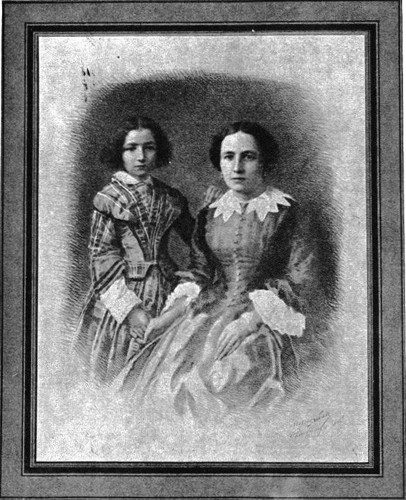 SARAH BERNHARDT, AT THE AGE OF TWELVE, AND HER MOTHER.
SARAH BERNHARDT, AT THE AGE OF TWELVE, AND HER MOTHER.From an Unpublished Photograph by C. Robert, Paris.
The Project Gutenberg EBook of The Strand Magazine, Volume XXVII, Issue 160, April, 1904, by Various This eBook is for the use of anyone anywhere at no cost and with almost no restrictions whatsoever. You may copy it, give it away or re-use it under the terms of the Project Gutenberg License included with this eBook or online at www.gutenberg.org Title: The Strand Magazine, Volume XXVII, Issue 160, April, 1904 Author: Various Release Date: September 20, 2011 [EBook #37484] Language: English Character set encoding: ISO-8859-1 *** START OF THIS PROJECT GUTENBERG EBOOK STRAND MAGAZINE, APRIL, 1904 *** Produced by Dianna Adair, Jonathan Ingram, Josephine Paolucci and the Online Distributed Proofreading Team at https://www.pgdp.net.
Trancriber's Note: Table of Contents has been created for the HTML version and footnotes moved to the end of the article.
 SARAH BERNHARDT, AT THE AGE OF TWELVE, AND HER MOTHER.
SARAH BERNHARDT, AT THE AGE OF TWELVE, AND HER MOTHER.
The Memoirs of Sarah Bernhardt.
The Return Of Sherlock Holmes.
The Romance of the Bronze Duke.
Two and a Tiger.
The Best Comic Pictures.
The Country of the Blind.
Off the Track in London.
Artists and Musicians.
The Owner of the "Patriarch".
Detectives at School.
Dialstone Lane
The Atlantic River
The Phoenix and the Carpet.
The Making of a Lily.
Curiosities.
[These Memoirs, written by the greatest actress of our time, will give not only the story of her career in the theatrical world, but also in social life, in which she has, of course, met nearly all the celebrated people of the day, from Royalties downwards, and will be found throughout of the most striking interest to all classes of readers.]
My mother was fond of travelling: she would go from Spain to England, from London to Paris, from Paris to Berlin, and from there to Christiania; then she would come back, embrace me, and set out again for Holland, her native country. She used to send my nurse clothing for herself and cakes for me. To one of my aunts she would write: "Look after little Sarah; I shall return in a month's time." A month later she would write to another of her sisters: "Go and see the child at her nurse's; I shall be back in a couple of weeks."
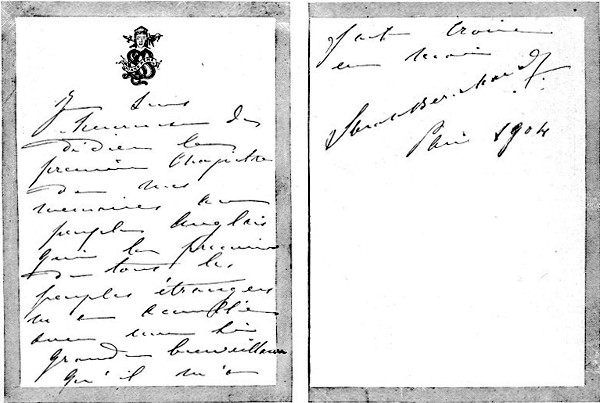 MME. SARAH BERNHARDT'S DEDICATORY LETTER.
SPECIALLY WRITTEN FOR THIS MAGAZINE.
MME. SARAH BERNHARDT'S DEDICATORY LETTER.
SPECIALLY WRITTEN FOR THIS MAGAZINE.
"Je suis heureux de dédier le premier chapitre de mes Mémoires au peuple anglais, qui, le premier de tous les peuples étrangers, m'a accueillie avec une si grande bienveillance qu'il m'a fait croire en moi.—Sarah Bernhardt, Paris, 1904."
Translation.—"I am pleased to dedicate the first chapter of my Memoirs to the English people, who, first among all foreign nations, welcomed me with such great kindness that they made me believe in myself."
My mother's age was nineteen; I was three years old, and my two aunts were seventeen and twenty years of age; another aunt was fifteen, and the eldest was twenty-eight, but the last one lived at Martinique, and was the mother of six children. My grandmother was blind, my grandfather dead, and my father had been in China for the last two years. I have no idea why he had gone there.
My youthful aunts always promised to come to see me, but rarely kept their word. My nurse hailed from Brittany and lived near Quimperlé, in a little [Pg 364]white house with a low thatched roof, on which wild gillyflowers grew. That was the first flower which charmed my eyes as a child, and I have loved it ever since. Its leaves are heavy and sad-looking, and its petals are made of the setting sun.
Brittany is a long way off, even in our present epoch of velocity. In those days it was the end of the world. Fortunately my nurse was, it appears, a good, kind woman, and, as her own child had died, she had only me to love. But she loved after the manner of poor people, when she had time.
One day, as her husband was ill, she went into the fields to help gather in potatoes; the over-damp soil was rotting them, and there was no time to be lost. She left me in charge of her husband, who was lying on his Breton bedstead suffering from a bad attack of lumbago. The good woman had placed me in my high chair, and had been careful to put in the wooden peg which supported the narrow tablet for my toys. She threw a fagot in the grate, and said to me in Breton language (until the age of four I only understood Breton), "Be a good girl, Milk Blossom." That was my only name at the time. When she had gone I tried to withdraw the wooden peg which she had taken so much trouble to put in place. Finally I succeeded in pushing aside the little rampart. I wanted to reach the ground, but—poor little me!—I fell into the fire, which was burning joyfully.
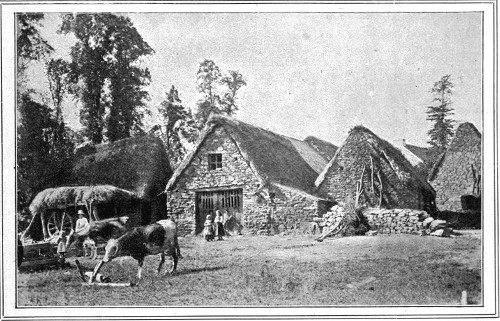 SARAH BERNHARDT'S HOME IN BRITTANY WHEN SHE WAS A CHILD.
SARAH BERNHARDT'S HOME IN BRITTANY WHEN SHE WAS A CHILD.The screams of my foster-father, who could not move, brought in some neighbours. I was thrown, all smoking, into a large pail of fresh milk. My aunts were informed of what had happened; they communicated the news to my mother, and for the next four days that quiet part of the country was ploughed by stage-coaches, which arrived in rapid succession. My aunts came from all parts of the world; and my mother, in the greatest alarm, hastened from Brussels with Baron Larrey, one of her friends, who was a celebrated doctor, and a surgeon whom Baron Larrey had brought with him. I have been told since that nothing was more painful to witness, and yet so charming, as my mother's despair. The doctor approved of the "mask of butter," which was changed every two hours.
Dear Baron Larrey! I often saw him afterwards, and now and again we shall meet him in the pages of my Memoirs. He used to tell me in such charming fashion how those kind folks loved Milk Blossom. And he could never refrain from laughing at the thought of that butter. There was butter everywhere, he used to say; on the bedsteads, on the cupboards, on the chairs, on the tables, hanging up on nails in bladders. All the neighbours used to bring butter to make masks for Milk Blossom.[Pg 365]
Mother, admirably beautiful, looking like a Madonna, with her golden hair and her eyes fringed with such long lashes that they made a shadow on her cheeks when she bent her eyes, distributed money on all sides. She would have given her golden hair, her slender white fingers, her tiny feet, her life itself, in order to save the child. And she was as sincere in her despair and her love as in her unconscious forgetfulness. Baron Larrey left for Paris, leaving my mother, Aunt Rosine, and the surgeon with me. Forty-two days later mother took in triumph to Paris the nurse, the foster-father, and me, and installed us in a little house at Neuilly, on the banks of the Seine. I had not even a scar, it appears. My skin was rather too bright a pink, but that was all. My mother, happy and trustful once more, began to travel again, leaving me in care of my aunts.
Two years were spent in the little garden at Neuilly, which was full of horrible dahlias, growing close together and coloured like woollen balls. My aunts never came there. My mother used to send money, bonbons, and toys. The foster-father died, and my nurse married a concierge, who used to pull open the door at 65, Rue de Provence.
Not knowing where to find my mother, and not being able to write, my nurse—without telling any of my friends took me with her to her new abode.
The change delighted me. I was five years old at the time, and I remember the day as if it were yesterday. My nurse's abode was just over the doorway of the house, and the window was framed in the heavy and monumental door. From outside I thought it was beautiful, and I began to clap my hands on reaching the house. It was towards five o'clock in the evening in the month of November, when everything looks grey. I was put to bed, and no doubt I went to sleep at once, for there end my souvenirs of that day.
The next morning there was terrible grief in store for me. There was no window in the little room in which I slept, and I began to cry, and escaped from the arms of my nurse, who was dressing me, so that I could go into the adjoining room. I ran to the round window, which was an immense "bull's-eye" above the doorway, I pressed my stubborn brow against the glass and began to scream with rage on seeing no trees; no box-wood, no leaves falling, nothing, nothing but stone—cold, grey, ugly stone, and panes of glass opposite me. "I want to go away. I don't want to stay here. It is all black, black! It is ugly! I want to see the ceiling of the street!" and I burst into tears. My poor nurse took me up in her arms and, folding me in a rug, took me down into the courtyard. "Lift up your head, Milk Blossom, and look! See, there is the ceiling of the street!"
It comforted me somewhat to see that there was some sky in this ugly place, but my little soul was very sad. I could not eat, and I grew pale and became anæmic, and I should certainly have died of consumption if it had not been for a mere chance, a most unexpected incident. One day I was playing in the courtyard with a little girl named Titine, who lived on the second floor, and whose face or real name I cannot recall. I saw my nurse's husband walking across the courtyard with two ladies, one of whom was most fashionably attired. I could only see their backs, but the voice of the fashionably-attired lady caused my heart to stop beating. My poor little body trembled with nervous excitement.
"Do any of the windows look on to the courtyard?" she asked.
"Yes, madame, those four," he replied, pointing to four open ones on the first floor.
The lady turned to look at them, and I uttered a cry of joy.
"Aunt Rosine! Aunt Rosine!" I exclaimed, clinging to the skirts of the pretty visitor. I buried my face in her furs, stamping, sobbing, laughing, and tearing her wide lace sleeves in my frenzy of delight. She took me in her arms and tried to calm me, and, questioning the concierge, she stammered out to her friend, "I can't understand what it all means! This is little Sarah! My sister Youle's child!"
The noise I made had attracted attention, and people opened their windows. My aunt decided to take refuge in the concierge's lodge, in order to come to an explanation. My poor nurse told her all that had taken place—her husband's death and her second marriage. I do not remember what she said to excuse herself. I clung to my aunt, who was deliciously perfumed, and I would not let go of her.
She promised to come the following day to fetch me, but I did not want to stay any longer in that dark place. I asked to start at once with my nurse. My aunt stroked my hair gently, and spoke to her friend in a language I did not understand. She tried in vain to explain something to me—I do not know what it was—but I insisted that I[Pg 366] wanted to go away with her at once. In a gentle, tender, caressing voice, but without any real affection, she said all kinds of pretty things, stroked me with her gloved hands, patted my frock, which was turned up, and made any amount of charming, frivolous little gestures, but all without any real feeling. She then went away, at her friend's entreaty, after emptying her purse in my nurse's hands. I rushed towards the door, but the husband of my nurse, who had opened it for her, now closed it again. My nurse was crying, and, taking me in her arms, she opened the window, saying to me: "Don't cry, Milk Blossom; look at your pretty aunt. She will come back again, and then you can go away with her."
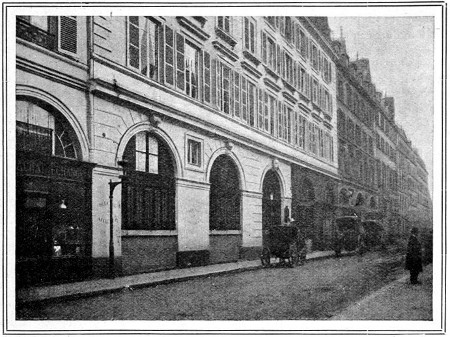 RUE DE PROVENCE, WHERE SARAH BERNHARDT, AT THE AGE OF FIVE,
WAS TAKEN TO LIVE WITH HER NURSE.
RUE DE PROVENCE, WHERE SARAH BERNHARDT, AT THE AGE OF FIVE,
WAS TAKEN TO LIVE WITH HER NURSE.Great tears rolled down her calm, round, handsome face. I could see nothing but the dark, black hole which remained there immutable behind me, and in a fit of despair I rushed out to my aunt, who was just getting into a carriage. After that I knew nothing more; everything seemed dark; there was a noise in the distance. I could hear voices far, far away. I had managed to escape from my poor nurse and had fallen down on the pavement in front of my aunt. I had broken my arm in two places and injured my left knee-cap. I only came to myself again a few hours later, to find that I was in a beautiful wide bed which smelt very nice. It stood in the middle of a large room, with two lovely windows, which made me very joyful, for I could see the ceiling of Heaven through them.
My mother, who had been sent for immediately, came to take care of me, and I saw the rest of my family, my aunts and my cousins. My poor little brain could not understand why all these people should suddenly be so fond of me, when I had passed so many days and nights only cared for by one single person.
As I was weakly and my bones were small and friable, I was two years recovering from this terrible fall, and during that time was nearly always carried about. I will pass over these two years of my life, which have left me only a vague memory of being petted, and of a chronic state of torpor.
One day my mother took me on her knees and said to me, "You are a big girl now, and you must learn to read and write." I was then seven years old and could neither read, write, nor count, as I had been five years with the old nurse and two years ill. "You must go to school," continued my mother, playing with my curly hair, "like a big girl." I did not know what all this meant, and I asked what a school was.
"It's a place where there are many little girls," replied my mother.
"Are they ill?" I asked.
"Oh, no. They are quite well, like you are now, and they play together, and are very gay and happy."
I jumped about in delight and gave free vent to my joy, but on seeing tears in my mother's eyes I flung myself in her arms.
"But what about you, mamma?" I asked. "You will be all alone and you won't have any little girl."
She bent down to me and said, "God has told me that he will send me some flowers and a little baby."
My delight was more and more boisterous. "Then I shall have a little brother!" I[Pg 367] exclaimed, "or else a little sister! Oh, no, I don't want that; I don't like little sisters!"
Mamma kissed me very affectionately, and then I was dressed, I remember, in a blue corded velvet frock, of which I was very proud. Arrayed thus in all my splendour, I waited impatiently for Aunt Rosine's carriage, which was to take us to Auteuil.
It was about three o'clock when she arrived. The housemaid had gone on about an hour before, and I had watched with delight my little trunk and my toys being packed into the carriage. The maid climbed up and took the seat by the driver, in spite of my mother protesting at first against this. When my aunt's magnificent equipage arrived, mamma was the first to get in, slowly and calmly. I got in slowly too, giving myself airs because the concierge and some of the shop-keepers were watching. My aunt then sprang in lightly, but by no means calmly, after giving her orders in English to the stiff, ridiculous-looking coachman, and handing him a paper on which the address was written. Another carriage followed ours, in which three men were seated: Régis L——, a friend of my father's, General de P——, and an artist named Fleury, I think, whose pictures of horses and sporting subjects were very much in vogue just then.
I heard on the way that these gentlemen were going to arrange about a little dinner near Auteuil to console mamma for her great trouble in being separated from me. Some other guests were to be there to meet them. I did not pay very much attention to what my mother and my aunt said to each other. Sometimes when they spoke of me they talked either English or German, and smiled at me affectionately. The long drive was greatly appreciated by me, for, with my face pressed against the window and my eyes wide open, I gazed out eagerly at the grey, muddy road, with its ugly houses on each side and its bare trees. I thought it was all very beautiful—because it kept changing.
The carriage stopped at 18, Rue Boileau, Auteuil. On the iron gate was a long, dark signboard, with gold letters. I looked up at it, and mamma said: "You will be able to read that soon, I hope." My aunt whispered to me, "Boarding School. Madame Fressard," and, very promptly, I said to mamma: "It says, 'Boarding School. Madame Fressard.'"
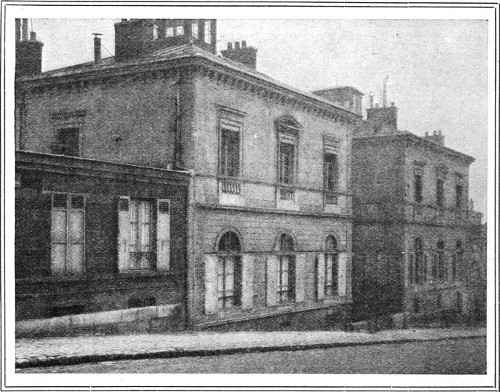 THE EDUCATIONAL ESTABLISHMENT AT AUTEUIL WHERE SARAH
BERNHARDT PASSED SOME OF HER EARLY YEARS.
THE EDUCATIONAL ESTABLISHMENT AT AUTEUIL WHERE SARAH
BERNHARDT PASSED SOME OF HER EARLY YEARS.Mamma, my aunt, and the three gentlemen laughed heartily at my assurance, and we entered the house. Mme. Fressard came forward to meet us, and I liked her at once. She was of medium height, rather stout, with a small waist, and her hair turning grey "en Sévigné." She had beautiful, large eyes, rather like George Sand's; very white teeth, which showed up all the more as her complexion was rather tawny. She looked healthy, spoke kindly; her hands were plump and her fingers long. She took my hand gently in hers and, half-kneeling, so that her face was level with mine, she said, in a musical voice, "You won't be afraid of me, will you, little girl?" I did not answer, but my face flushed as red as a coxcomb. She asked me several questions, but I refused to reply. They all gathered round me. "Speak, child!" "Come, Sarah, be a good girl!" "Oh, the naughty little child!"[Pg 368]
It was all in vain. I remained perfectly mute. The customary round was then made of the bedrooms, the dining-hall, the class-rooms, and the usual exaggerated compliments were paid. "How beautifully it is all kept! How spotlessly clean everything is!" and a hundred stupidities of this kind about the comfort of these prisons for children. My mother went aside with Mme. Fressard, and I clung to her knees so that she could not walk. "This is the doctor's prescription," she said, and then followed a long list of things that were to be done for me.
Mme. Fressard smiled rather ironically. "You know, madame," she said to my mother, "we shall not be able to curl her hair like that." "And you certainly will not be able to uncurl it," replied my mother, stroking my head with her gloved hands. "It's a regular wig, and they must never attempt to comb it until it has been well brushed. They could not possibly get the knots out otherwise, and it would hurt her too much. What do you give the children at four o'clock?" she asked, changing the subject. "Oh, a slice of bread and just what the parents leave for them."
"There are twelve pots of different kinds of jam," said my mother, "but she must have jam one day and chocolate another, as she has not a good appetite, and requires change of food. I have brought six pounds of chocolate." Mme. Fressard smiled in a good-natured but rather ironical way. She picked up a packet of the chocolate and looked at the mark.
"Ah! from Marquis? What a spoilt little girl it is!" She patted my cheek with her white fingers, and then, as her eyes fell on a large jar, she looked surprised. "That's cold cream," said my mother. "I make it myself, and I should like my little girl's face and hands to be rubbed with it every night when she goes to bed."
"But——" began Mme. Fressard.
"Oh, I'll pay double laundry expenses for the sheets," interrupted my mother, impatiently. (Ah! my poor mother, I remember quite well that my sheets were changed once a month, like those of the other pupils.)
The farewell moment came at last, and everyone gathered round mamma, and finally carried her off, after a great deal of kissing, and with all kinds of consoling words. "It will be so good for her." "It is just what she needs." "You'll find her quite changed when you see her again," etc., etc.
The General, who was very fond of me, picked me up in his arms and tossed me in the air.
"You little chit," he said; "they are putting you to the barracks, and you'll have to mind your pace!"
I pulled his long moustache, and he said, winking, and looking in the direction of Mme. Fressard, who had a slight moustache, "You mustn't do that to the lady, you know!"
My aunt laughed heartily, and my mother gave a little stifled laugh, and the whole troop went off in a regular whirlwind of rustling skirts and farewells, whilst I was taken away to the cage where I was to be imprisoned.
I spent two years at this school, and I learned to read, write, and do sums. I also learned plenty of new games, and to sing rondeaux and embroider handkerchiefs for mamma.
I was comparatively happy on the whole, because we went out on Sundays and Thursdays, and I had a sort of sensation of liberty on those days. The sun in the street seemed to me quite different from the sun in the big garden belonging to the school. My Aunt Felix Faure (no relation to the wife of the late President) often fetched me and took me out with her. There was a little brook running through the grounds round her house at Neuilly, and I used to spend hours fishing in it with my two cousins, a boy and a girl.
These two years passed by peacefully enough, the chief events being my terrible fits of temper, which upset the whole school occasionally, and ended usually by my spending two or three days in the sick-room. One day Aunt Rosine arrived suddenly, to take me away altogether. My father had written giving orders as to where I was to be placed, and these orders were imperative. My mother was travelling, so she had sent word to my aunt, who had hurried off at once between two dances, to carry out the instructions she had received.
The idea that I was to be ordered about without any regard to my own wishes or inclinations put me into an indescribable rage. I rolled about on the ground, uttering the most heartrending cries. I yelled out all kinds of reproaches, blaming mamma, my aunts, and Mme. Fressard for not finding some way to keep me with her. The struggle lasted two hours, and while I was being dressed I escaped twice into the garden and attempted to climb the trees and to[Pg 369] throw myself into the pond, in which there was more mud than water.
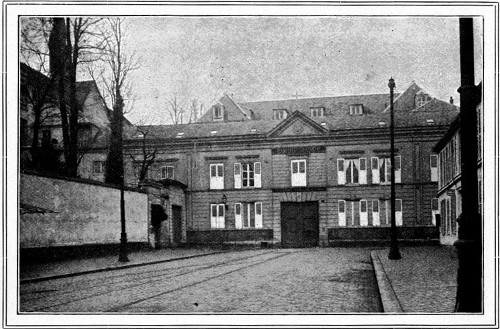 THE GRAND CHAMP CONVENT, VERSAILLES.
THE GRAND CHAMP CONVENT, VERSAILLES.Finally, when I was completely exhausted and subdued, I was taken off sobbing in my aunt's carriage.
I stayed three days at her house, as I was so feverish that they all thought I was sickening for some illness. It proved to be nothing but the result of my wild fit of anger.
I will pass over some pages which my readers will find later on in my Memoirs, and will go on to the time when I was at the Grand Champ Convent at Versailles, whither I had been taken after various events.
Endowed with a lively imagination and with an extremely sensitive nature, the Christian legend appealed both to my heart and mind. The Divine Martyr became my ideal, and the Mother with the Seven Sorrows I simply worshipped.
An event which seemed simple enough in itself, but which was very important, as, indeed, everything is which disturbs, if only for an hour, the tranquillity of convent life, served to attach me more strongly than ever to this peaceful home. It seemed to me to be the place for all earthly happiness and the road to eternal peace in the next world.
The Archbishop of Paris, Monseigneur Sibour, was to honour the convent by paying a sacerdotal visit. It was not only the father coming to look after the welfare of his children, but, and more particularly this, it was the Prince of the Church condescending to appear in the midst of these humble and holy women and pure children. It was a Divine Majesty coming down from the throne to mingle with his human subjects.
The whole convent was in a state of great excitement when the good news was received, and I must own that there was more enthusiasm than solemnity visible during the time that preceded the visit. The chapel was decorated with all its most special ornaments for this most special reception. The whole house was filled with flowers, and what particularly delighted me and several of my companions was that a play taken from a Biblical subject was rehearsed for the benefit of Monseigneur. I should not like to affirm that the privileged ones who were chosen to take part in this play had no vanity on their conscience on that particular day. It was no small glory to appear before a public, limited certainly in number, but so wonderfully select.
I was only a fragile child at that time, interesting rather than pretty, in spite of my rose-coloured lips, my "heavenly eyes," as the nuns called them, and my light gold hair. It[Pg 370] is from that far-back time that my earliest theatrical souvenirs date. It was St. Catherine's Day, a general holiday in all the convents for girls, but with us, this year, it was a very great day. Much more attention than usual had been given to the rehearsals of the play that was to be performed. The subject of the piece had been taken from the Bible. It was the journey of young Tobias, and had been written by Sister Thérèse.
The girls who had rôles were wild with delight. They had had committee meetings, at which they discussed the quality of the piece, and I may add that it was unanimously pronounced perfectly wonderful. All around me I heard nothing but exclamations of joy and admiration, and I alone was wretched, absolutely wretched, for I had no rôle. What misery I endured in the midst of all this joy! My dear Mother—as we called the elder girls who looked after us—never thought of trying to comfort me nor yet to reason with me; she was too much taken up herself with the great event. I could, therefore, weep and fume to my heart's content. I knew all the rôles by heart, and I thought that most of the girls recited their parts very badly. Finally I undertook to coach Louise Bugnet in her rôle. She was to play the part of the guiding angel, and she could not manage it at all. She was ten years old, and I liked her very much. She was my special friend. "How silly you are!" I said to her. "If I were in your place I should not be at all nervous. Listen! this is how I should say it." And standing in front of her I went through her part, and she then repeated it much better after me. But the next day, at the final rehearsal, in the large room which we used on holidays, she was seized with such a trembling fit that she could not utter a single word. We were all there together, and Mother Sainte-Appoline was drilling us in her own way. She imitated Monseigneur Sibour, who was to be present at the performance, and she said, "When he does like this you must all clap," and when she clapped her long, delicate hands together, it sounded as though there were cotton-wool between them.
I should have enjoyed all this immensely if I had not been furious. I knew all the rôles and had not a single word to say. Most of the girls were beaming with pride; Louise Bugnet alone was crying and sobbing. I thought her very stupid.
"That child will never get through her part," exclaimed the Mother Superior.
"Oh, no, I can't; I am sure I can't!" sobbed my poor little friend.
There was a general uproar, and all at once I felt my childish heart leap with the wildest joy. The blood seemed to boil in my veins, and, rushing from the platform, I jumped on to a form. "Mother! Mother!" I exclaimed, "I know the rôle. Would you like me to take it?"
Everybody was looking at me. I was trembling, but I felt quite brave. I knew the part and was sure of myself.
Mother Sainte-Sophie, the Superior of the Convent, an adorable creature (one of the happy memories of my childhood), answered: "Well, my dear, let me hear you."
I tossed back my refractory hair, and, bold and panting, proceeded to recite the rôle of the guiding angel.
"There!" I exclaimed, when I came to the end.
My schoolfellows laughed, the sisters smiled, but, very much encouraged, I mounted on to the little platform and the rehearsal commenced.
"It will be all right," everyone said, and I felt very proud, but still I was afraid lest I should not get through well enough.
When the rehearsal was over the luncheon bell rang, but I could neither eat nor drink; I felt choked and oppressed. How many times since then I have had this same sensation of physical anguish!
On the table there was a special treat that day—a dish of custard. I was very fond of this, but I could not possibly swallow anything. I glanced anxiously at the girls to see if they were looking or listening. They were eating and laughing. Louise Bugnet took my share of the custard. "Look here!" she said, "you've taken my rôle, so I can eat your custard." I began to cry, for I was very fond of custard. Fortunately, just then Sister Sainte-Marie came to fetch me to be dressed, otherwise I should have had a fit of temper, and it is quite probable that my silver goblet and my pewter plate would have landed in the middle of the table. I was taken into the large committee-room. I had never been in it before, and to my childish imagination there was something mysterious about it.
I shuddered on entering, for it seemed to me I should hear all those rules that were discussed in there twice a month. A looking-glass had been brought in, the only one I ever saw in the convent. It belonged to Père Larcher, the gardener, the only man who was free to come in and out of the house. The glass was too small and was framed in oak, with a bird carved on the top.[Pg 371] I can see it now, with the tinfoil worn off in patches and marks all over it which interfered with its transparency. The nuns kept at a safe distance from it as though it were a danger, and their black veils were lowered over their white crêpe ones. The sister who attended to the turning-box, the only one in the convent who was not cloistered (because it was she who had to deal with the tradesmen), was told off to dress us. She put a long white gown on me with large sleeves, and two beautiful white wings were then fastened on to me. My hair had been well curled and was tied over my forehead with a gold lace.
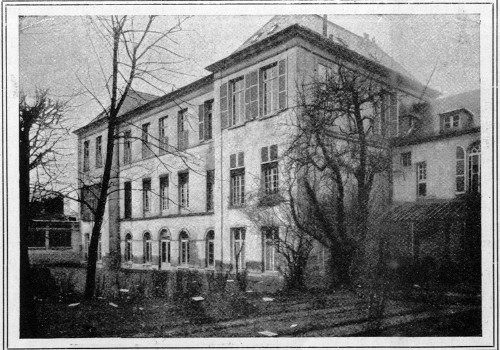 THE GRAND CHAMP CONVENT FROM THE GARDEN.
THE GRAND CHAMP CONVENT FROM THE GARDEN.Oh, dear, how my poor little heart was beating!
Suddenly the convent bells began to peal gaily; a carriage rolled up into the courtyard and Monseigneur Sibour made his appearance.
I was too little and could not see, although I did my utmost to make myself higher. Père Larcher lifted me up in his arms, and then what a magnificent sight I beheld.
Monseigneur had alighted from his episcopal carriage and Mother Sainte-Sophie, our Mother Superior, was kneeling down and kissing his ring. All the nuns, with bowed heads, were awaiting the signal to kneel down and receive his blessing.
I thought all this very beautiful. All these black gowns with white caps, and then this tall man in violet, with white hair, so majestic looking, and yet with such a kind, fatherly expression on his face. Then, too, there were the carriage and the fat coachman, all bedizened and yet sitting up straight and looking so solemn on his draped seat, and our chaplain, both gentle and severe—I thought it was all superb, and I decided to become a nun.
An hour passed by, during which I knew absolutely nothing of what was said or done.
I was waiting, very tired after all my emotion, and half asleep, too, in the armchair which belonged to the old Mère Sainte-Alexis, the most aged member of the community.
A light touch woke me. I was dreaming of my rôle and was not, therefore, at all surprised. I exclaimed, as I rushed towards the door, "Ah, they are going to commence!"
Unfortunately, I had forgotten my long dress, and I fell down in the middle of the room. The merriment which my accident caused put me in such a rage that the tears which the pain in my knees brought to my eyes dried up promptly. "I haven't hurt myself, there now!" I exclaimed, furious, and then went into the small room which was to serve as our green-room.
The stage was represented by a plank of wood, which prevented our passing the limits arranged. There was, of course, no sign of a curtain. A wooden bench and a table, upon which was the frugal repast of old Tobias, constituted the scenery.
Ah! there were also two stools, which one of the girls had to move about as required. When I entered our green-room the entertainment had commenced, but it was not time for our play. The eldest boarder was reciting the address which had been composed in honour of Monseigneur. Her hard, dry voice, repeating correctly the words she had learned, sounded to me like the creaking of a door. We were eleven little girls in this small room, and not one of us uttered a word. We could hear the beating of our hearts. Our feverish little hands, clasped[Pg 372] together from habit in prayer, were clenched now in terror.
This opening number was over at last, and the girl was presented with a cross that had been blessed. She assured us that she had not been nervous, and that it was quite easy. We had only to look at the bright light which the sun threw on the frame of the large picture representing Heaven, with all the angels. In this way each one could imagine herself alone.
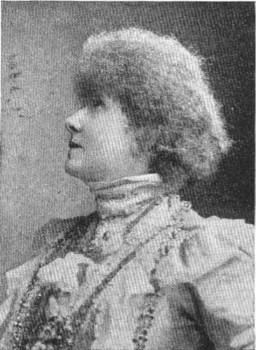 MME. SARAH BERNHARDT.
MME. SARAH BERNHARDT.After this Marie Hubart played a piano-forte solo. Nothing was spared for this great ceremony, and then, at last, it was our turn. I will not give the details of the piece, as it is well known. I tell this as one of my souvenirs, as it was my début. I came very near entering a nunnery. It seemed to me that there was nothing better, nothing which could make me happier. In my childish imagination I could see angels drawing me heavenwards. The only way appeared to be through the convent. In the meantime I was about to appear on the stage.
I felt paralyzed, and a shudder ran through me from the back of my neck to my feet. I fancy that I missed the right moment for appearing on the scene, as one of the girls pushed me forward, just as my professor, Monsieur M. Provost, had to do some years later when I made my début in "Iphigenia" at the Comédie Française. My entrance was a success, for I had a sudden fit of self-assurance, although I was really half delirious with fright, and I went through my part very well, adding whole phrases to it. I scarcely knew what I was saying, but I continued nevertheless.
When the piece was over the guiding angel was sent for by Monseigneur. I was perfectly triumphant.
"What's your name, my child?" asked Monseigneur.
"Sarah," I replied.
"That name must be changed," he said, smiling.
"Yes," answered the Superior, "her father wants her to be baptized and to be called Henriette; the ceremony is to take place in a month."
"Well, Sarah or Henriette," said Monseigneur, "here is a medal that you must always wear, and the next time I come here you must recite some poetry, 'Esther's Prayer,' for me."
Monseigneur then kissed me, and this caused some jealousy. I promised him that I would learn "Esther's Prayer" for his next visit. I had only a vague idea of what he meant by poetry. I knew some fables, but was not aware that they were poetry. I asked to have something to learn at once for Monseigneur, and "Esther's Prayer" was given to me. I began to study it without a moment's delay. Alas! I was never to recite it to him. A few days later, one morning after prayers, when we were all assembled in the chapel, the almoner, who was deeply moved, told us in a short address that Monseigneur Sibour had just been assassinated.[A] Little had we expected to hear such terrible news.
All feelings of envy and triumph, together with the joyful remembrance of our fête, were swept away in this great grief, which, for my part, I have never forgotten.
Assassinated! A wave of terror seemed to pass over us, and the dread word, echoing through the church, smote me more particularly. Had I not been marked out as the favourite of the moment? It was to me as though the murderer, Verger, had robbed me at the same time of my little share of glory. I began to cry, more with regret than sorrow, and the prayers for the dead, that we were told to say, brought my grief to a climax. I was carried away in a fainting-fit, and it was from that time that I was taken with an ardent love for mysticism, which was encouraged by our religious observances, the mise-en-scène of our services, and perhaps, too, by the fervent and cajoling approval of the women who were educating me. They were very fond of me and I adored them, so that even now the memory of them thrills my heart with affection.
[A] He was killed by the Abbé Verger, a priest who had been suspended from office, Jan. 1, 1857.
It is years since the incidents of which I speak took place, and yet it is with diffidence that I allude to them. For a long time, even with the utmost discretion and reticence, it would have been impossible to make the facts public; but now the principal person concerned is beyond the reach of human law, and with due suppression the story may be told in such fashion as to injure no one. It records an absolutely unique experience in the career both of Mr. Sherlock Holmes and of myself. The reader will excuse me if I conceal the date or any other fact by which he might trace the actual occurrence.
We had been out for one of our evening rambles, Holmes and I, and had returned about six o'clock on a cold, frosty winter's evening. As Holmes turned up the lamp the light fell upon a card on the table. He glanced at it, and then, with an ejaculation of disgust, threw it on the floor. I picked it up and read:—
Charles Augustus Milverton,
Appledore Towers,
Agent. Hampstead.
"Who is he?" I asked.
"The worst man in London," Holmes answered, as he sat down and stretched his legs before the fire. "Is anything on the back of the card?"
I turned it over.
"Will call at 6.30—C. A. M.," I read.
"Hum! He's about due. Do you feel a creeping, shrinking sensation, Watson, when you stand before the serpents in the Zoo and see the slithery, gliding, venomous creatures, with their deadly eyes and wicked, flattened faces? Well, that's how Milverton impresses me. I've had to do with fifty murderers in my career, but the worst of them never gave me the repulsion which I have for this fellow. And yet I can't get out of doing business with him—indeed, he is here at my invitation."
"But who is he?"
"I'll tell you, Watson. He is the king of all the blackmailers. Heaven help the man, and still more the woman, whose secret and reputation come into the power of Milverton. With a smiling face and a heart of marble he will squeeze and squeeze until he has drained them dry. The fellow is a genius in his way, and would have made his mark in some more savoury trade. His method is as follows: He allows it to be known that he is prepared to pay very high sums for letters which compromise people of wealth or position. He receives these wares not only from treacherous valets or maids, but frequently from genteel ruffians who have gained the confidence and affection of trusting women. He deals with no niggard hand. I happen to know that he paid seven hundred pounds to a footman for a note two lines in length, and that the ruin of a noble family was the result. Everything which is in the market goes to Milverton, and there are hundreds in this great city who turn white at his name. No one knows where his grip may fall, for he is far too rich and far too cunning to work from hand to mouth. He will hold a card back for years in order to play it at the moment when the stake is best worth winning. I have said that he is the worst man in London, and I would ask you how could one compare the ruffian who in hot blood bludgeons his mate with this man, who methodically and at his leisure tortures the soul and wrings the nerves in order to add to his already swollen money-bags?"
I had seldom heard my friend speak with such intensity of feeling.
"But surely," said I, "the fellow must be within the grasp of the law?"
"Technically, no doubt, but practically not. What would it profit a woman, for example, to get him a few months' imprisonment[Pg 374] if her own ruin must immediately follow? His victims dare not hit back. If ever he blackmailed an innocent person, then, indeed, we should have him; but he is as cunning as the Evil One. No, no; we must find other ways to fight him."
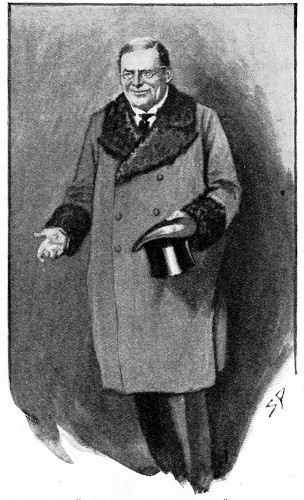 "CHARLES AUGUSTUS MILVERTON."
"CHARLES AUGUSTUS MILVERTON."
"And why is he here?"
"Because an illustrious client has placed her piteous case in my hands. It is the Lady Eva Brackwell, the most beautiful débutante of last season. She is to be married in a fortnight to the Earl of Dovercourt. This fiend has several imprudent letters—imprudent, Watson, nothing worse—which were written to an impecunious young squire in the country. They would suffice to break off the match. Milverton will send the letters to the Earl unless a large sum of money is paid him. I have been commissioned to meet him, and—to make the best terms I can."
At that instant there was a clatter and a rattle in the street below. Looking down I saw a stately carriage and pair, the brilliant lamps gleaming on the glossy haunches of the noble chestnuts. A footman opened the door, and a small, stout man in a shaggy astrachan overcoat descended. A minute later he was in the room.
Charles Augustus Milverton was a man of fifty, with a large, intellectual head, a round, plump, hairless face, a perpetual frozen smile, and two keen grey eyes, which gleamed brightly from behind broad, golden-rimmed glasses. There was something of Mr. Pickwick's benevolence in his appearance, marred only by the insincerity of the fixed smile and by the hard glitter of those restless and penetrating eyes. His voice was as smooth and suave as his countenance, as he advanced with a plump little hand extended, murmuring his regret for having missed us at his first visit. Holmes disregarded the outstretched hand and looked at him with a face of granite. Milverton's smile broadened; he shrugged his shoulders, removed his overcoat, folded it with great deliberation over the back of a chair, and then took a seat.
"This gentleman?" said he, with a wave in my direction. "Is it discreet? Is it right?"
"Dr. Watson is my friend and partner."
"Very good, Mr. Holmes. It is only in your client's interests that I protested. The matter is so very delicate——"
"Dr. Watson has already heard of it."
"Then we can proceed to business. You say that you are acting for Lady Eva. Has she empowered you to accept my terms?"
"What are your terms?"
"Seven thousand pounds."
"And the alternative?"
"My dear sir, it is painful to me to discuss it; but if the money is not paid on the 14th there certainly will be no marriage on the 18th." His insufferable smile was more complacent than ever.[Pg 375]
Holmes thought for a little.
"You appear to me," he said, at last, "to be taking matters too much for granted. I am, of course, familiar with the contents of these letters. My client will certainly do what I may advise. I shall counsel her to tell her future husband the whole story and to trust to his generosity."
Milverton chuckled.
"You evidently do not know the Earl," said he.
From the baffled look upon Holmes's face I could clearly see that he did.
"What harm is there in the letters?" he asked.
"They are sprightly—very sprightly," Milverton answered. "The lady was a charming correspondent. But I can assure you that the Earl of Dovercourt would fail to appreciate them. However, since you think otherwise, we will let it rest at that. It is purely a matter of business. If you think that it is in the best interests of your client that these letters should be placed in the hands of the Earl, then you would indeed be foolish to pay so large a sum of money to regain them." He rose and seized his astrachan coat.
Holmes was grey with anger and mortification.
"Wait a little," he said. "You go too fast. We would certainly make every effort to avoid scandal in so delicate a matter."
Milverton relapsed into his chair.
"I was sure that you would see it in that light," he purred.
"At the same time," Holmes continued, "Lady Eva is not a wealthy woman. I assure you that two thousand pounds would be a drain upon her resources, and that the sum you name is utterly beyond her power. I beg, therefore, that you will moderate your demands, and that you will return the letters at the price I indicate, which is, I assure you, the highest that you can get."
Milverton's smile broadened and his eyes twinkled humorously.
"I am aware that what you say is true about the lady's resources," said he. "At the same time, you must admit that the occasion of a lady's marriage is a very suitable time for her friends and relatives to make some little effort upon her behalf. They may hesitate as to an acceptable wedding present. Let me assure them that this little bundle of letters would give more joy than all the candelabra and butter-dishes in London."
"It is impossible," said Holmes.
"Dear me, dear me, how unfortunate!" cried Milverton, taking out a bulky pocket-book. "I cannot help thinking that ladies are ill-advised in not making an effort. Look at this!" He held up a little note with a coat-of-arms upon the envelope. "That belongs to—well, perhaps it is hardly fair to tell the name until to-morrow morning. But at that time it will be in the hands of the lady's husband. And all because she will not find a beggarly sum which she could get in an hour by turning her diamonds into paste. It is such a pity. Now, you remember the sudden end of the engagement between the Honourable Miss Miles and Colonel Dorking? Only two days before the wedding there was a paragraph in the Morning Post to say that it was all off. And why? It is almost incredible, but the absurd sum of twelve hundred pounds would have settled the whole question. Is it not pitiful? And here I find you, a man of sense, boggling about terms when your client's future and honour are at stake. You surprise me, Mr. Holmes."
"What I say is true," Holmes answered. "The money cannot be found. Surely it is better for you to take the substantial sum which I offer than to ruin this woman's career, which can profit you in no way?"
"There you make a mistake, Mr. Holmes. An exposure would profit me indirectly to a considerable extent. I have eight or ten similar cases maturing. If it was circulated among them that I had made a severe example of the Lady Eva I should find all of them much more open to reason. You see my point?"
Holmes sprang from his chair.
"Get behind him, Watson! Don't let him out! Now, sir, let us see the contents of that note-book."
Milverton had glided as quick as a rat to the side of the room, and stood with his back against the wall.
"Mr. Holmes, Mr. Holmes," he said, turning the front of his coat and exhibiting the butt of a large revolver, which projected from the inside pocket. "I have been expecting you to do something original. This has been done so often, and what good has ever come from it? I assure you that I am armed to the teeth, and I am perfectly prepared to use my weapons, knowing that the law will support me. Besides, your supposition that I would bring the letters here in a note-book is entirely mistaken. I would do nothing so foolish. And now, gentlemen, I have one or two little interviews this evening,[Pg 376] and it is a long drive to Hampstead." He stepped forward, took up his coat, laid his hand on his revolver, and turned to the door. I picked up a chair, but Holmes shook his head and I laid it down again. With a bow, a smile, and a twinkle Milverton was out of the room, and a few moments after we heard the slam of the carriage door and the rattle of the wheels as he drove away.
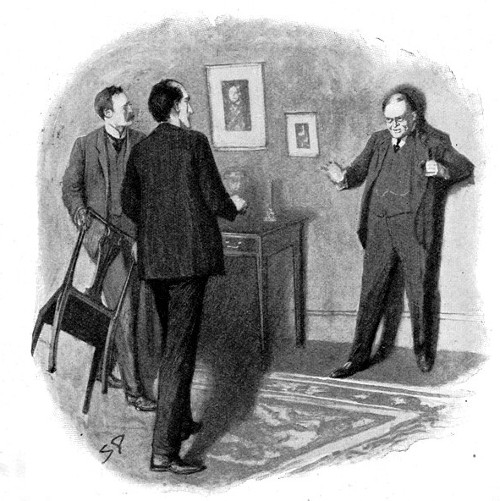 "EXHIBITING THE BUTT OF A LARGE REVOLVER, WHICH PROJECTED
FROM THE INSIDE POCKET."
"EXHIBITING THE BUTT OF A LARGE REVOLVER, WHICH PROJECTED
FROM THE INSIDE POCKET."
Holmes sat motionless by the fire, his hands buried deep in his trouser pockets, his chin sunk upon his breast, his eyes fixed upon the glowing embers. For half an hour he was silent and still. Then, with the gesture of a man who has taken his decision, he sprang to his feet and passed into his bedroom. A little later a rakish young work-man with a goatee beard and a swagger lit his clay pipe at the lamp before descending into the street. "I'll be back some time, Watson," said he, and vanished into the night. I understood that he had opened his campaign against Charles Augustus Milverton; but I little dreamed the strange shape which that campaign was destined to take.
For some days Holmes came and went at all hours in this attire, but beyond a remark that his time was spent at Hampstead, and that it was not wasted, I knew nothing of what he was doing. At last, however, on a wild, tempestuous evening, when the wind screamed and rattled against the windows, he returned from his last expedition, and having removed his disguise he sat before the fire and laughed heartily in his silent inward fashion.
"You would not call me a marrying man, Watson?"
"No, indeed!"
"You'll be interested to hear that I am engaged."
"My dear fellow! I congrat——"
"To Milverton's housemaid."
"Good heavens, Holmes!"
"I wanted information, Watson."
"Surely you have gone too far?"
"It was a most necessary step. I am a plumber with a rising business, Escott by name. I have walked out with her each evening, and I have talked with her. Good heavens, those talks! However, I have got all I wanted. I know Milverton's house as I know the palm of my hand."
"But the girl, Holmes?"[Pg 377]
He shrugged his shoulders.
"You can't help it, my dear Watson. You must play your cards as best you can when such a stake is on the table. However, I rejoice to say that I have a hated rival who will certainly cut me out the instant that my back is turned. What a splendid night it is!"
"You like this weather?"
"It suits my purpose. Watson, I mean to burgle Milverton's house to-night."
I had a catching of the breath, and my skin went cold at the words, which were slowly uttered in a tone of concentrated resolution. As a flash of lightning in the night shows up in an instant every detail of a wide landscape, so at one glance I seemed to see every possible result of such an action—the detection, the capture, the honoured career ending in irreparable failure and disgrace, my friend himself lying at the mercy of the odious Milverton.
"For Heaven's sake, Holmes, think what you are doing," I cried.
"My dear fellow, I have given it every consideration. I am never precipitate in my actions, nor would I adopt so energetic and indeed so dangerous a course if any other were possible. Let us look at the matter clearly and fairly. I suppose that you will admit that the action is morally justifiable, though technically criminal. To burgle his house is no more than to forcibly take his pocket-book—an action in which you were prepared to aid me."
I turned it over in my mind.
"Yes," I said; "it is morally justifiable so long as our object is to take no articles save those which are used for an illegal purpose."
"Exactly. Since it is morally justifiable I have only to consider the question of personal risk. Surely a gentleman should not lay much stress upon this when a lady is in most desperate need of his help?"
"You will be in such a false position."
"Well, that is part of the risk. There is no other possible way of regaining these letters. The unfortunate lady has not the money, and there are none of her people in whom she could confide. To-morrow is the last day of grace, and unless we can get the letters to-night this villain will be as good as his word and will bring about her ruin. I must, therefore, abandon my client to her fate or I must play this last card. Between ourselves, Watson, it's a sporting duel between this fellow Milverton and me. He had, as you saw, the best of the first exchanges; but my self-respect and my reputation are concerned to fight it to a finish."
"Well, I don't like it; but I suppose it must be," said I. "When do we start?"
"You are not coming."
"Then you are not going," said I. "I give you my word of honour—and I never broke it in my life—that I will take a cab straight to the police-station and give you away unless you let me share this adventure with you."
"You can't help me."
"How do you know that? You can't tell what may happen. Anyway, my resolution is taken. Other people beside you have self-respect and even reputations."
Holmes had looked annoyed, but his brow cleared, and he clapped me on the shoulder.
"Well, well, my dear fellow, be it so. We have shared the same room for some years, and it would be amusing if we ended by sharing the same cell. You know, Watson, I don't mind confessing to you that I have always had an idea that I would have made a highly efficient criminal. This is the chance of my lifetime in that direction. See here!" He took a neat little leather case out of a drawer, and opening it he exhibited a number of shining instruments. "This is a first-class, up-to-date burgling kit, with nickel-plated jemmy, diamond-tipped glass-cutter, adaptable keys, and every modern improvement which the march of civilization demands. Here, too, is my dark lantern. Everything is in order. Have you a pair of silent shoes?"
"I have rubber-soled tennis shoes."
"Excellent. And a mask?"
"I can make a couple out of black silk."
"I can see that you have a strong natural turn for this sort of thing. Very good; do you make the masks. We shall have some cold supper before we start. It is now nine-thirty. At eleven we shall drive as far as Church Row. It is a quarter of an hour's walk from there to Appledore Towers. We shall be at work before midnight. Milverton is a heavy sleeper and retires punctually at ten-thirty. With any luck we should be back here by two, with the Lady Eva's letters in my pocket."
Holmes and I put on our dress-clothes, so that we might appear to be two theatre-goers homeward bound. In Oxford Street we picked up a hansom and drove to an address in Hampstead. Here we paid off our cab, and with our great-coats buttoned up, for it was bitterly cold and the wind seemed to blow through us, we walked along the edge of the Heath.
"It's a business that needs delicate treatment," said Holmes. "These documents[Pg 378] are contained in a safe in the fellow's study, and the study is the ante-room of his bed-chamber. On the other hand, like all these stout, little men who do themselves well, he is a plethoric sleeper. Agatha—that's my fiancée—says it is a joke in the servants' hall that it's impossible to wake the master. He has a secretary who is devoted to his interests and never budges from the study all day. That's why we are going at night. Then he has a beast of a dog which roams the garden. I met Agatha late the last two evenings, and she locks the brute up so as to give me a clear run. This is the house, this big one in its own grounds. Through the gate—now to the right among the laurels. We might put on our masks here, I think. You see, there is not a glimmer of light in any of the windows, and everything is working splendidly."
With our black silk face-coverings, which turned us into two of the most truculent figures in London, we stole up to the silent, gloomy house. A sort of tiled veranda extended along one side of it, lined by several windows and two doors.
"That's his bedroom," Holmes whispered. "This door opens straight into the study. It would suit us best, but it is bolted as well as locked, and we should make too much noise getting in. Come round here. There's a greenhouse which opens into the drawing-room."
The place was locked, but Holmes removed a circle of glass and turned the key from the inside. An instant afterwards he had closed the door behind us, and we had become felons in the eyes of the law. The thick, warm air of the conservatory and the rich, choking fragrance of exotic plants took us by the throat. He seized my hand in the darkness and led me swiftly past banks of shrubs which brushed against our faces. Holmes had remarkable powers, carefully cultivated, of seeing in the dark. Still holding my hand in one of his he opened a door, and I was vaguely conscious that we had entered a large room in which a cigar had been smoked not long before. He felt his way among the furniture, opened another door, and closed it behind us. Putting out my hand I felt several coats hanging from the wall, and I understood that I was in a passage. We passed along it, and Holmes very gently opened a door upon the right-hand side. Something rushed out at us and my heart sprang into my mouth, but I could have laughed when I realized that it was the cat. A fire was burning in this new room, and again the air was heavy with tobacco smoke. Holmes entered on tip-toe, waited for me to follow, and then very gently closed the door. We were in Milverton's study, and a portière at the farther side showed the entrance to his bedroom.
It was a good fire, and the room was illuminated by it. Near the door I saw the gleam of an electric switch, but it was unnecessary, even if it had been safe, to turn it on. At one side of the fireplace was a heavy curtain, which covered the bay window we had seen from outside. On the other side was the door which communicated with the veranda. A desk stood in the centre, with a turning chair of shining red leather. Opposite was a large bookcase, with a marble bust of Athene on the top. In the corner between the bookcase and the wall there stood a tall green safe, the firelight flashing back from the polished brass knobs upon its face. Holmes stole across and looked at it. Then he crept to the door of the bedroom, and stood with slanting head listening intently. No sound came from within. Meanwhile it had struck me that it would be wise to secure our retreat through the outer door, so I examined it. To my amazement it was neither locked nor bolted! I touched Holmes on the arm, and he turned his masked face in that direction. I saw him start, and he was evidently as surprised as I.
"I don't like it," he whispered, putting his lips to my very ear. "I can't quite make it out. Anyhow, we have no time to lose."
"Can I do anything?"
"Yes; stand by the door. If you hear anyone come, bolt it on the inside, and we can get away as we came. If they come the other way, we can get through the door if our job is done, or hide behind these window curtains if it is not. Do you understand?"
I nodded and stood by the door. My first feeling of fear had passed away, and I thrilled now with a keener zest than I had ever enjoyed when we were the defenders of the law instead of its defiers. The high object of our mission, the consciousness that it was unselfish and chivalrous, the villainous character of our opponent, all added to the sporting interest of the adventure. Far from feeling guilty, I rejoiced and exulted in our dangers. With a glow of admiration I watched Holmes unrolling his case of instruments and choosing his tool with the calm, scientific accuracy of a surgeon who performs a delicate operation. I knew that the opening of safes was a particular hobby with him, and I understood the joy which it gave him to be[Pg 379] confronted with this green and gold monster, the dragon which held in its maw the reputations of many fair ladies. Turning up the cuffs of his dress-coat—he had placed his overcoat on a chair—Holmes laid out two drills, a jemmy, and several skeleton keys. I stood at the centre door with my eyes glancing at each of the others, ready for any emergency; though, indeed, my plans were somewhat vague as to what I should do if we were interrupted. For half an hour Holmes worked with concentrated energy, laying down one tool, picking up another, handling each with the strength and delicacy of the trained mechanic. Finally I heard a click, the broad green door swung open, and inside I had a glimpse of a number of paper packets, each tied, sealed, and inscribed. Holmes picked one out, but it was hard to read by the flickering fire, and he drew out his little dark lantern, for it was too dangerous, with Milverton in the next room, to switch on the electric light. Suddenly I saw him halt, listen intently, and then in an instant he had swung the door of the safe to, picked up his coat, stuffed his tools into the pockets, and darted behind the window curtain, motioning me to do the same.
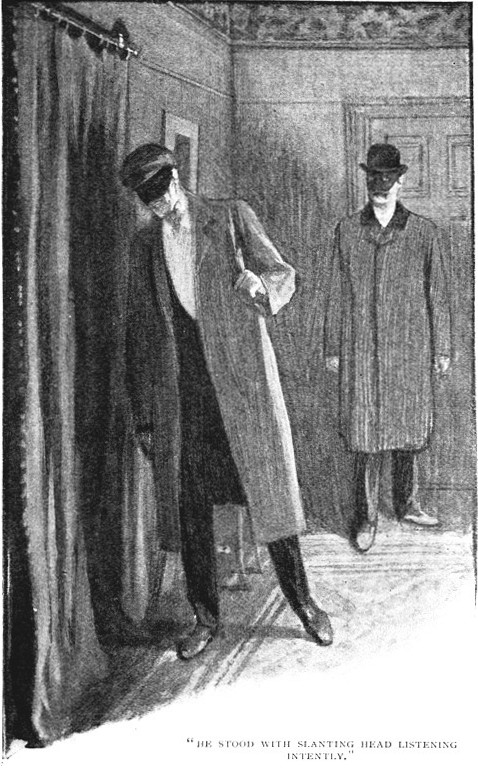 "HE STOOD WITH SLANTING HEAD LISTENING INTENTLY."
"HE STOOD WITH SLANTING HEAD LISTENING INTENTLY."
It was only when I had joined him there that I heard what had alarmed his quicker senses. There was a noise somewhere within the house. A door slammed in the distance. Then a confused, dull murmur broke itself into the measured thud of heavy footsteps rapidly approaching. They were in the passage outside the room. They paused at the door. The door opened. There was a sharp snick as the electric light was turned on. The door closed once more, and the pungent reek of a strong cigar was borne to our nostrils. Then the footsteps continued backwards and forwards, backwards and forwards, within a few yards of us. Finally, there was a creak from a chair, and the footsteps ceased. Then a key clicked in a lock and I heard the rustle of papers.
So far I had not dared to look out, but now I gently parted the division of the curtains in front of me and peeped through. From the pressure of Holmes's shoulder against mine I knew that he was sharing my observations. Right in front of us, and almost within our reach, was the broad, rounded back of Milverton. It was evident that we had entirely miscalculated his movements, that he had never been to his bedroom, but that he had been sitting up in some smoking or billiard room in the farther wing of the house, the windows of which we had not seen. His broad, grizzled head, with its shining patch of baldness, was in the[Pg 380] immediate foreground of our vision. He was leaning far back in the red leather chair, his legs outstretched, a long black cigar projecting at an angle from his mouth. He wore a semi-military smoking jacket, claret-coloured, with a black velvet collar. In his hand he held a long legal document, which he was reading in an indolent fashion, blowing rings of tobacco smoke from his lips as he did so. There was no promise of a speedy departure in his composed bearing and his comfortable attitude.
I felt Holmes's hand steal into mine and give me a reassuring shake, as if to say that the situation was within his powers and that he was easy in his mind. I was not sure whether he had seen what was only too obvious from my position, that the door of the safe was imperfectly closed, and that Milverton might at any moment observe it. In my own mind I had determined that if I were sure, from the rigidity of his gaze, that it had caught his eye, I would at once spring out, throw my great-coat over his head, pinion him, and leave the rest to Holmes. But Milverton never looked up. He was languidly interested by the papers in his hand, and page after page was turned as he followed the argument of the lawyer. At least, I thought, when he has finished the document and the cigar he will go to his room; but before he had reached the end of either there came a remarkable development which turned our thoughts into quite another channel.
Several times I had observed that Milverton looked at his watch, and once he had risen and sat down again, with a gesture of impatience. The idea, however, that he might have an appointment at so strange an hour never occurred to me until a faint sound reached my ears from the veranda outside. Milverton dropped his papers and sat rigid in his chair. The sound was repeated, and then there came a gentle tap at the door. Milverton rose and opened it.
"Well," said he, curtly, "you are nearly half an hour late."
So this was the explanation of the unlocked door and of the nocturnal vigil of Milverton. There was the gentle rustle of a woman's dress. I had closed the slit between the curtains as Milverton's face had turned in our direction, but now I ventured very carefully to open it once more. He had resumed his seat, the cigar still projecting at an insolent angle from the corner of his mouth. In front of him, in the full glare of the electric light, there stood a tall, slim, dark woman, a veil over her face, a mantle drawn round her chin. Her breath came quick and fast, and every inch of the lithe figure was quivering with strong emotion.
"Well," said Milverton, "you've made me lose a good night's rest, my dear. I hope you'll prove worth it. You couldn't come any other time—eh?"
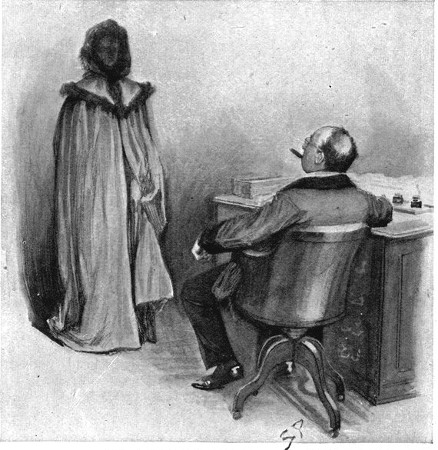 "YOU COULDN'T COME ANY OTHER TIME—EH?"
"YOU COULDN'T COME ANY OTHER TIME—EH?"
The woman shook her head.
"Well, if you couldn't you couldn't. If the Countess is a hard mistress you have your chance to get level with her now. Bless the girl, what are you shivering about? That's right! Pull yourself together! Now, let us get down to business." He took a note from the drawer of his desk. "You say that you have five letters which compromise the Countess d'Albert. You want to sell them. I want to buy them. So far so good. It only remains to fix a price. I should want to inspect the letters, of course. If they are really good specimens——Great heavens, is it you?"
The woman without a word had raised her veil and dropped the mantle from her chin. It was a dark, handsome, clear-cut face which confronted Milverton, a face with a curved nose, strong, dark eyebrows shading hard, glittering eyes, and a straight, thin-lipped mouth set in a dangerous smile.
"It is I," she said; "the woman whose life you have ruined."
Milverton laughed, but fear vibrated in his voice. "You were so very obstinate," said he. "Why did you drive me to such extremities? I assure you I wouldn't hurt a fly of my own accord, but every man has his business, and what was I to do? I put the price well within your means. You would not pay."
"So you sent the letters to my husband, and he, the noblest gentleman that ever lived, a man whose boots I was never worthy to lace—he broke his gallant heart and died. You remember that last night when I came through that door I begged and prayed you for mercy, and you laughed in my face as you are trying to laugh now, only your coward heart cannot keep your lips from twitching? Yes, you never thought to see me here again, but it was that night which taught me how I could meet you face to face, and alone. Well, Charles Milverton, what have you to say?"
"Don't imagine that you can bully me," said he, rising to his feet. "I have only to raise my voice, and I could call my servants and have you arrested. But I will make allowance for your natural anger. Leave the room at once as you came, and I will say no more."
The woman stood with her hand buried in her bosom, and the same deadly smile on her thin lips.
"You will ruin no more lives as you ruined mine. You will wring no more hearts as you wrung mine. I will free the world of a poisonous thing. Take that, you hound, and that!—and that!—and that!—and that!"
She had drawn a little, gleaming revolver, and emptied barrel after barrel into Milverton's body, the muzzle within two feet of his shirt front. He shrank away and then fell forward upon the table, coughing furiously and clawing among the papers. Then he staggered to his feet, received another shot, and rolled upon the floor. "You've done me," he cried, and lay still. The woman looked at him intently and ground her heel into his upturned face. She looked again, but there was no sound or movement. I heard a sharp rustle, the night air blew into the heated room, and the avenger was gone.
No interference upon our part could have saved the man from his fate; but as the woman poured bullet after bullet into Milverton's shrinking body I was about to spring out, when I felt Holmes's cold, strong grasp upon my wrist. I understood the whole argument of that firm, restraining grip—that it was no affair of ours; that justice had overtaken a villain; that we had our own duties and our own objects which were not to be lost sight of. But hardly had the woman rushed from the room when Holmes, with swift, silent steps, was over at the other door. He turned the key in the lock. At the same instant we heard voices in the house and the sound of hurrying feet. The revolver shots had roused the household. With perfect coolness Holmes slipped across to the safe, filled his two arms with bundles of letters, and poured them all into the fire. Again and again he did it, until the safe was empty. Someone turned the handle and beat upon the outside of the door. Holmes looked swiftly round. The letter which had been the messenger of death for Milverton lay, all mottled with his blood, upon the table. Holmes tossed it in among the blazing papers. Then he drew the key from the outer door, passed through after me, and locked it on the outside. "This way, Watson," said he; "we can scale the garden wall in this direction."
I could not have believed that an alarm could have spread so swiftly. Looking back, the huge house was one blaze of light. The front door was open, and figures were rushing down the drive. The whole garden was alive with people, and one fellow raised a view-halloa as we emerged from the veranda and followed hard at our heels. Holmes seemed to know the ground perfectly, and he threaded his way swiftly among a plantation of small trees, I close at his heels, and our foremost pursuer panting behind us. It was a six-foot[Pg 382] wall which barred our path, but he sprang to the top and over. As I did the same I felt the hand of the man behind me grab at my ankle; but I kicked myself free and scrambled over a glass-strewn coping. I fell upon my face among some bushes; but Holmes had me on my feet in an instant, and together we dashed away across the huge expanse of Hampstead Heath. We had run two miles, I suppose, before Holmes at last halted and listened intently. All was absolute silence behind us. We had shaken off our pursuers and were safe.
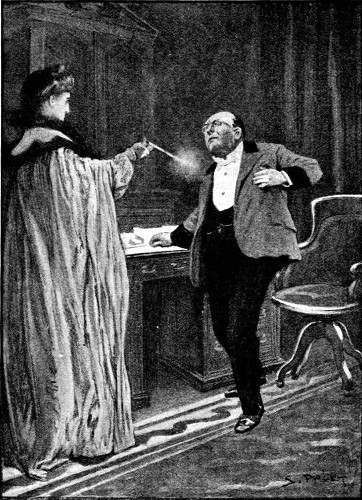 "THEN HE STAGGERED TO HIS FEET AND RECEIVED ANOTHER SHOT."
"THEN HE STAGGERED TO HIS FEET AND RECEIVED ANOTHER SHOT."
We had breakfasted and were smoking our morning pipe on the day after the remarkable experience which I have recorded when Mr. Lestrade, of Scotland Yard, very solemn and impressive, was ushered into our modest sitting-room.
"Good morning, Mr. Holmes," said he; "good morning. May I ask if you are very busy just now?"
"Not too busy to listen to you."
"I thought that, perhaps, if you had nothing particular on hand, you might care to assist us in a most remarkable case which occurred only last night at Hampstead."
"Dear me!" said Holmes. "What was that?"
"A murder—a most dramatic and remarkable murder. I know how keen you are upon these things, and I would take it as a great favour if you would step down to Appledore Towers and give us the benefit of your advice. It is no ordinary crime. We have had our eyes upon this Mr. Milverton for some time, and, between ourselves, he was a bit of a villain. He is known to have held papers which he used for blackmailing purposes. These papers have all been burned by the murderers. No article of[Pg 383] value was taken, as it is probable that the criminals were men of good position, whose sole object was to prevent social exposure."
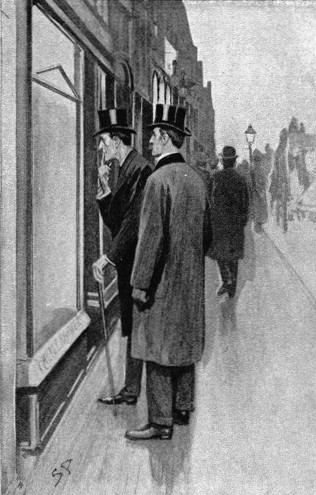 "FOLLOWING HIS GAZE I SAW THE PICTURE OF A REGAL AND STATELY
LADY IN COURT DRESS."
"FOLLOWING HIS GAZE I SAW THE PICTURE OF A REGAL AND STATELY
LADY IN COURT DRESS."
"Criminals!" said Holmes. "Plural!"
"Yes, there were two of them. They were, as nearly as possible, captured red-handed. We have their foot-marks, we have their description; it's ten to one that we trace them. The first fellow was a bit too active, but the second was caught by the under-gardener and only got away after a struggle. He was a middle-sized, strongly-built man—square jaw, thick neck, moustache, a mask over his eyes."
"That's rather vague," said Sherlock Holmes. "Why, it might be a description of Watson!"
"It's true," said the inspector, with much amusement. "It might be a description of Watson."
"Well, I am afraid I can't help you, Lestrade," said Holmes. "The fact is that I knew this fellow Milverton, that I considered him one of the most dangerous men in London, and that I think there are certain crimes which the law cannot touch, and which therefore, to some extent, justify private revenge. No, it's no use arguing. I have made up my mind. My sympathies are with the criminals rather than with the victim, and I will not handle this case."
Holmes had not said one word to me about the tragedy which we had witnessed, but I observed all the morning that he was in his most thoughtful mood, and he gave me the impression, from his vacant eyes and his abstracted manner, of a man who is striving to recall something to his memory. We were in the middle of our lunch when he suddenly sprang to his feet. "By Jove, Watson; I've got it!" he cried. "Take your hat! Come with me!" He hurried at his top speed down Baker Street and along Oxford Street, until we had almost reached Regent Circus. Here on the left hand there stands a shop window filled with photographs of the celebrities and beauties of the day. Holmes's eyes fixed themselves upon one of them, and following his gaze I saw the picture of a regal and stately lady in Court dress, with a high diamond tiara upon her noble head. I looked at that delicately-curved nose, at the marked eyebrows, at the straight mouth, and the strong little chin beneath it. Then I caught my breath as I read the time-honoured title of the great nobleman and statesman whose wife she had been. My eyes met those of Holmes, and he put his finger to his lips as we turned away from the window.
[A] Copyright, 1904, by A. Conan Doyle, in the United States of America.
On a green mound commanding Cæsar's Plain, Aldershot, a rider and his horse survey the landscape. Occasionally soldiers come up and salute them—sometimes singly, sometimes in companies, often in battalions. But the salute is never returned; both rider and horse remain rigid. The sun sets and finds them still at their post; it rises and they have never stirred. The explanation is simple—this giant horse and horseman are of bronze; they form the greatest equestrian group in the world.
Yet the pair have not always been thus stationary. They have been thrice moved and may be moved thrice again. Perhaps in the watches of the night on Cæsar's Plain they are thinking of their past, and of the protracted episode which once shook the society of the British capital to its centre, and in which they played the chief part. Factions raged around them ere they left their humble birthplace in the Harrow Road, and for a time the bronze enjoyed far more celebrity than its original, the Iron Duke.
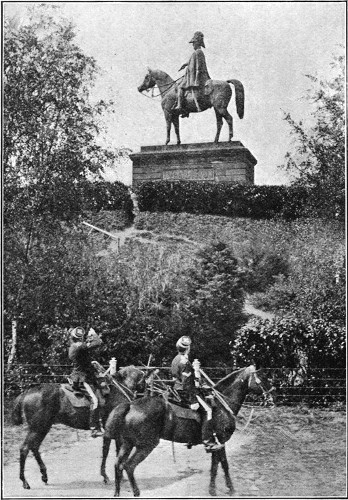 SOLDIERS SALUTING THE DUKE'S STATUE, AS IT STANDS AT
ALDERSHOT TO-DAY.
SOLDIERS SALUTING THE DUKE'S STATUE, AS IT STANDS AT
ALDERSHOT TO-DAY.The story is well worth telling, for nobody remembers it now. Seventy years ago, although England had then no sculptors to speak of, there was a general passion for erecting statues. The statues were nearly all bad, of course, and to the decade between 1830 and 1840 the kingdom owes some of its worst atrocities in this department of art. About the time the late Queen came to the throne, a sculptor, Matthew Wyatt, was commissioned to execute a statue of George III. The result may be seen in Cockspur Street to-day. Critics complained that it was too small. The reproach greatly offended Wyatt, who roundly declared that he had not aimed at bigness, but that if size had been in question he was quite capable of modelling a statue larger than any Michael Angelo or the Indian idolmakers had ever attempted. He mentioned this to an ardent worshipper of the Duke of Wellington in the City, a Common Councilman named Simpson, who had already raised subscriptions for one Wellington equestrian group, now in front of the Royal Exchange. Simpson and Wyatt talked it over, and the result was the formation of a committee, headed by the Duke of Rutland, and the raising of fourteen thousand pounds for the erection of a memorial to the Duke in the West-end. This body duly handed the commission over to Wyatt as "in every respect eminently qualified to be entrusted with the proposed equestrian statue."
On this point it was plain that there were two opinions prevalent. Wyatt now prepared to realize his boast, and boldly announced that the equestrian statue should be of Titanic proportions. As to the site of his handiwork thereby hangs a tale. Wyatt had a friend with whom he had quarrelled, named Decimus Burton. This Burton, an architect, had recently erected a mighty triumphal arch at the entrance to Green Park. It formed a great feature in the magnificent plan submitted[Pg 385] to Parliament in 1827 for the "re-edification" of Buckingham Palace. In this costly design the above arch was to form the Royal entrance to the palace gardens, to be laid out to suit the rather luxurious taste of George IV.
The arch was eighty feet high. Burton's original idea was to embellish the main piers with groups of trophies; to place the figure of a warrior on each stylobate; to enrich the base with a sculptural representation of an ancient triumph; to place a statue over each column; and various other embellishments. But all this ambitious plan was instantly shortened by Wyatt's declaring his intention of placing his colossal statue not in the middle of Hyde Park, or even of Green Park, or Kensington Gardens, but on the very summit of Burton's arch!
The unfortunate architect was beside himself with rage at the suggestion. He protested, but he protested in vain. The complaisant committee had quite fallen in with Wyatt's idea. But it was not so the Government, the Royal Academy, and the Press. They heaped ridicule upon both the project and the sculptor. They roundly declared that it would ruin the unity and symmetry of his building. Then began an acrimonious discussion between the friends of Wyatt and the objectors to his proposed statue. All London divided itself into factions. The common topic of drawing room and dinner conversation was, "Are you for or against putting a gigantic Iron Duke on the top of the arch?" "Brazen impudence!" wrote Thackeray, himself an artist.
Meanwhile, in the studio in the Harrow Road, opposite the Dudley Arms Tavern, the lucky sculptor had been proceeding with his task. He prepared several models and designs, and the sub-committee availed themselves of a model of the Hyde Park Corner arch to consider, which they did with the greatest attention, the position and relative size of the statue to be placed on the summit. Wyatt then prepared a drawing of the arch with the equestrian statue, of which the sub-committee approved.
But at this point the Lords of the Treasury stepped in with an injunction. As the modelling and casting went on the battle raged. Macaulay wrote from India that the sculptor and his friends "ought to be in Bedlam"; his antagonist, Croker, inquired blandly "what a Whig Dissenter knew of high art." "High" art then became a joke. To the query, "What is the very highest form of art?" the jocular answer was, "Wyatt's Duke." The newspapers between 1840 and 1846 contain innumerable references to and descriptions of the statue, and the progress it was making towards completion.
We are told that the plaster of Paris used in the stupendous work considerably exceeded one hundred tons; it was formed upon a turn-plate, or revolving platform, upwards of twenty feet across, travelling upon forty rollers and weighing in itself several tons. The vastness of the model required certain precautions to ensure its integrity. To give strength to the body of the horse, a beam passed through it longitudinally, like a backbone from which spring traverse timbers, like the ribs of a ship. From the body of the horse was a line of iron bolts, beneath which, in the early stage of the modelling, were placed props for security in shifting the figure by means of the platform, so as to obtain the most desirable position for light, etc. To reach the different parts of the statue a travelling stage with a shifting floor was constructed, so that it might be adjusted to any height.
The entire group represented the Duke of Wellington as he appeared on the field of Waterloo upon his favourite horse, Copenhagen. The Duke—at least so Wyatt declared, although this was denied—sat to the sculptor for the portrait, the warrior wearing his customary short cloak, which the artist draped so as to give it something of the grace of classic costume. But the sculptor's intentions generally surpassed his execution.
For melting the sixty tons of bronze Wyatt erected two great furnaces. The first employed was capable of melting only twelve tons at a time, whereas it was found desirable to cast the remainder of the statue in larger and consequently fewer pieces. A record furnace was therefore built capable of melting twenty tons at a time.
The mould and core being placed in the pit in the foundry, the bronze was run into it from the furnace, and the body of the horse and the lower portion of the rider were thus cast in two parts of about twenty tons each. These were magnificent castings, and the effect of so large a surface of molten compound as the twenty tons presented is described as very extraordinary. The statue, or rather group, was thus cast in about eight pieces. In each case the mould was placed in the pit embedded in sand, rammed in as tightly as possible; yet in casting the front of the horse, by some means six tons of metal escaped through the mould, the chest of the horse was left vacant, and the casting was[Pg 386] consequently spoiled. In order that the legs of the horse should be capable of carrying the great weight they would have to sustain it was found necessary to cast them solid. The other portions of the work vary from one to three inches in thickness, with strong ribs internally to give additional strength. Its height approaches thirty feet, and such is the bulk of the horse that eight persons once dined within one-half of it.
The following are some of the main dimensions:—
| Ft. | in. | |
| Girth round the horse | 22 | 8 |
| Ditto arm of | 5 | 4 |
| From the horse's hocks to the ground | 6 | 0 |
| From the horse's nose to the tail | 26 | 0 |
| Length of head | 6 | 0 |
| Length of each ear | 2 | 4 |
The group being cast in pieces as above, they were joined partly by screw-bolts two inches in thickness. Owing to the colossal size of the group there were, for some time, upwards of thirty men employed at once upon the bronze; and in case of any work being requisite to be done within the figure of the rider, the head was removed to allow the workmen to descend through the neck. The cleansing, chasing, and finishing occupied a considerable time.
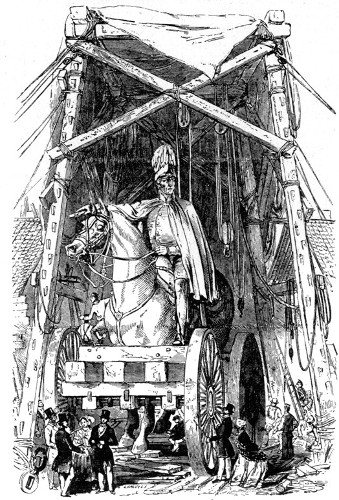 THE STATUE AT MR. WYATT'S FOUNDRY.
THE STATUE AT MR. WYATT'S FOUNDRY.At last, after being repeatedly canvassed in Parliament and in the country for six years, provoking a greater degree of heat than perhaps any statue in the world had ever provoked before, the business was supposed to be temporarily settled by the authorities agreeing to allow the statue to be placed on the arch "on three weeks' probation," when, "if the location proved to be injudicious," it was to be removed. Whereat there was great joy at the sculptor's studio in the Harrow Road. The Duke of Rutland jumped into his carriage and flew thither himself to bear the glad tidings.
"Once it's up," he is said to have cried, "the devil himself can't pull it down!"
When the gigantic horse and rider was all but finished it was hoisted out of the pit in the foundry and placed upon an enormous car, built especially for the purpose at Woolwich Dockyard. The roof of the foundry had first to be removed and one of the walls completely demolished to allow of the entry of the car, which weighed no less than twenty tons. Its wheels were twenty feet in diameter, with radiating cast-iron spokes, and were surmounted by a platform within which the statue was slung. The feet of the horse rested upon ledges, so close to the ground as to preclude any possibility of danger from a fall. As it stood thus it was visited during three weeks by many hundreds of persons, including most of the celebrities of the day, such as Lytton, Disraeli, and Dickens.
Outside every day saw a vast concourse of people watching the movements of the workmen. On the 28th September, at dusk, by means of chain windlasses, ropes, pulleys,[Pg 387] inclined planes, plank tramways, etc., the biggest carriage in the world and the largest statue were moved in proximity to the gate, in readiness for the event of the next day.
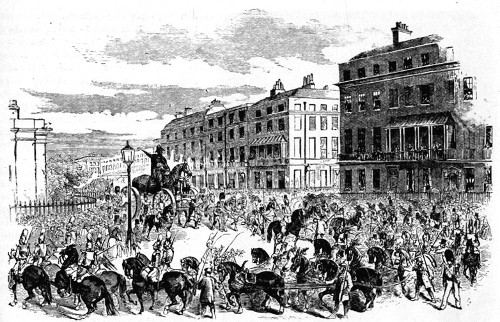 From the "Illustrated London News."
From the "Illustrated London News."All London was agog on September 29th, 1846. As it was understood by the public that the removal would take place as early as ten o'clock, long before that hour the Harrow Road and the streets adjoining were thronged with well-dressed people. Seats were erected in various places, for which shillings and half-crowns were cheerfully paid. Even the roofs and windows in the neighbourhood of Mr. Wyatt's foundry were crowded with anxious spectators. The whole line of route from the Harrow Road to Piccadilly, was, indeed, one scene of excitement, the windows being mostly filled with company and presenting a scene of much gaiety and animation. Paddington Green was filled, and Hyde Park was crowded towards the Drive and principal walk.
The procession included a large number of troops—Life Guards, Fusiliers, Grenadiers, Coldstreams, together with no fewer than four bands. In brief, the worshippers of the Duke omitted nothing to make the occasion a triumph. Besides, the weather was superb.
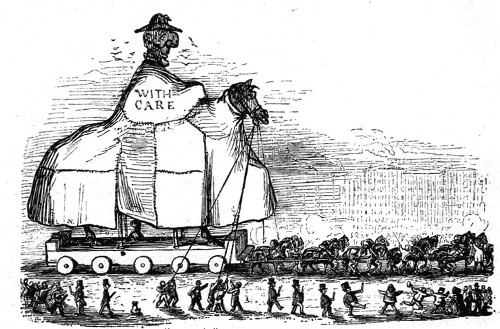 "PUNCH'S" SKIT ON THE PROCESSION.
"PUNCH'S" SKIT ON THE PROCESSION.The miserable pageant prophesied by Punch in Leech's amusing drawing was nothing like the reality. Leech afterwards[Pg 388] drew a mirth-provoking picture of the effect of the statue's passing down Edgware Road upon a gentleman shaving in the seclusion of an upper window, which we here reproduce.
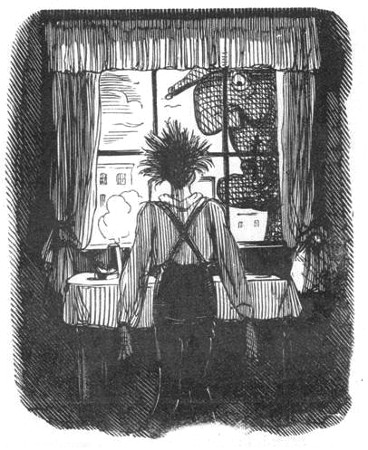 AWFUL APPARITION TO A GENTLEMAN, WHILST SHAVING, IN THE
EDGWARE ROAD—ANOTHER "PUNCH" JOKE ON THE PROCESSION.
AWFUL APPARITION TO A GENTLEMAN, WHILST SHAVING, IN THE
EDGWARE ROAD—ANOTHER "PUNCH" JOKE ON THE PROCESSION.Arrived at the arch, where Royal Princes, dukes, earls, and innumerable peeresses were assembled, it was found too late that day to hoist the mighty bronze to its resting-place. In fact, the ceremony took three days before it was concluded.
While all this was happening, on the first and last days the happy sculptor, Wyatt, was holding high revel at his studio, his friends partaking of a banquet at his expense.
Nobody dreamed of trouble. "Once up—the statue is safe," was the watchword. But the Royal Academy and the Office of Woods and Forests had resolved that the fate of this huge "solecism" was sealed. It had taken six years to set up; it should come down in three weeks! By October 1st, 1846, the sixty tons had been hoisted to the top of the one hundred and fifteen foot scaffold and placed in position by the sculptor himself. A few days later the fatal message arrived: "The Government decides that your statue must come down within three weeks." No wonder the sculptor and his friends were panic-stricken. How were they to be saved? There was only one way—by intercession to the Duke to save his bronze counterfeit.
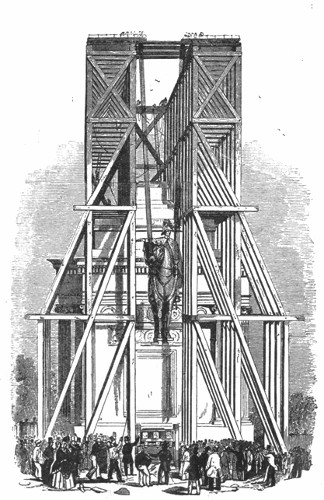 HOISTING THE STATUE TO THE TOP OF THE ARCH.
HOISTING THE STATUE TO THE TOP OF THE ARCH.We have not space to tell the full story; the Iron Duke spake the word and the Government dared not deny him his request.
For nearly thirty-seven years the great statue remained on the summit of the triumphal arch opposite Apsley House. But never during a moment of that time was it unassailed by hostile criticism. Foreigners were[Pg 389] said to point at it with scorn. Albert Smith declared that saturnine men came to laugh at it "who had never laughed before." But it was not so much that it was a badly-modelled statue as that it had given rise to prejudices and antagonisms which long survived both Duke and sculptor. So it happened that in 1883, when alterations were projected in the locality, the Duke at last was made to descend from his eminence. It was a tremendous piece of work—both the Duke and Copenhagen had to be decapitated and otherwise mutilated—but the gradual descent was accomplished, witnessed by vast multitudes. Wyatt's enemies had triumphed.
The question arose as to where the statue should be placed. "In the furnace," said many zealous brother sculptors. Ruskin boldly counselled its destruction. But it was decided that a good place for it would be in St. James's Park, opposite the Horse Guards' Parade. The removal thither to this obscure spot was accordingly begun. But the old antagonism apparently revived. The Horse Guards complained; the Duke of Cambridge thought it an eyesore. Lord Randolph Churchill, whose way between Westminster and St. James's led through the park, said he was "driven to frequent Whitehall," and predicted that the big bronze Duke would bring about the fall of the Government. Sir Frederick Leighton, P.R.A., and Lord Hardinge defended the new position, but the former was asked: "How would you like sixty tons of bad bronze opposite the Royal Academy?"
This time the old Duke of Wellington—thirty years in his grave—could give no sign. Rider and man waited immobile for further orders. "Forward—march!" finally, in 1885, came the command from head-quarters, and slowly, with difficulty, and with Copenhagen with his legs in the air, the new journey of forty miles began.
Such is the story of a statue. Where will it end? Two or three years ago a distinguished general, whose wife is also a distinguished painter of soldiers and horses, remarked cruelly that "Aldershot would be delightful if it wasn't for that—ogre."
And as he spoke, from force of habit he grimly raised two fingers to his temple, saluting the insulted Field-Marshal whose mighty shadow now darkens Cæsar's Plain.
Where will it end?
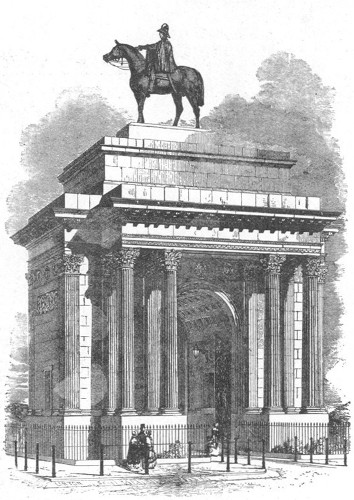 THE STATUE IN THE POSITION WHICH RAISED SUCH A STORM OF
OPPOSITION.
THE STATUE IN THE POSITION WHICH RAISED SUCH A STORM OF
OPPOSITION.Nare had enjoyed himself at the picnic until the baronet arrived, in spite of being rather an outsider among these local people, who all knew one another from the cradle. He had enjoyed himself in spite, too, of Mrs. Corcoran, who by many signs and cool politenesses had shown him that her daughter Judith had no need and—as she hinted very plainly—no inclination for his attentions. "Dear Sir Henry will be arriving soon, surely?" Mrs. Corcoran had said in his presence to their hostess, and little Mrs. Harrington, who had been very kind to Nare in that capacity, replied that of course Sir Henry would be arriving soon, but that in the meantime the rector (a mild man with a capacity for being held in awe) was very anxious to consult Mrs. Corcoran on the subject of an altar-cloth. Mrs. Corcoran was unable to resist the invitation. Whether the rector was as grateful for Sir Henry Pove's arrival as Nare was ungrateful, nobody can say, but there is no denying that the rector looked a little browbeaten by that time.
The baronet came on a tricycle, looking reedy in his light suit, but very dignified.
"I have accomplished the distance from Wetherwell in one hour and a quarter," he announced, "which I think is very fair—very fair."
"Wonderful," said Mrs. Corcoran, frowning at her silent daughter.
"Incredible," Nare suggested. "It must be eight miles."
"I thought it incumbent upon me to ride pretty fast," continued Sir Henry, "because a rather alarming thing has occurred."
A chorus of "Ohs!" wavered about the gratified tricyclist.
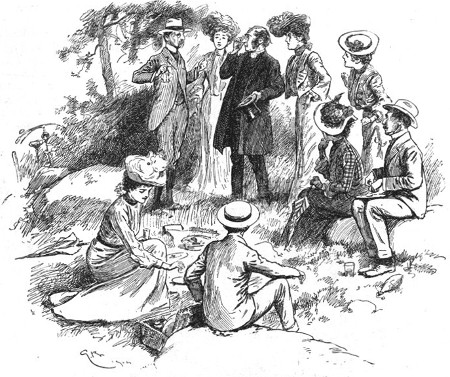 "A RATHER ALARMING THING HAS OCCURRED."
"A RATHER ALARMING THING HAS OCCURRED."
"What is it?" asked Mrs. Corcoran.
"No, don't tell!" cried Mrs. Harrington; "not if it's horrid. I won't have my picnic spoilt. Be a gem, now!"
"But, my dear madam"—Sir Henry's look was a rebuke to all trifling—"I dare not take it upon myself to leave you all in suspense about a matter which cannot in any event be lightly treated. When I say that a travelling menagerie at Sutley has lost one of its wild beasts early this morning, and that[Pg 391] up to the time I started from Wetherwell no news of its recapture had come to hand——"
He paused for an effect, and several ladies said: "Good heavens!" Mrs. Corcoran added:—
"And you rode over the moor alone?"
A pleased smile was her reward.
"I could do no less—yes—some say a puma; others a bear." Sir Henry rapidly answered a string of questions.
"Perhaps it was a llama," suggested Miss Corcoran.
"Judith!"
"They're very dangerous, mother."
"But in any case I'm very much annoyed," Mrs. Harrington announced. "Now everybody will want to go home, I suppose, though really Sutley is fourteen miles away, and—well, at any rate, we've all had something to eat. Sir Henry, come and be rewarded with lobster before we start."
I think it must have been because Mrs. Harrington thought she owed her annoyance as much to the baronet's alarmist importunity as to the carelessness of the menagerie owners that she dealt so kindly with Nare afterwards. For it was settled that the picnickers should disband almost immediately instead of going home by moonlight—as Mrs. Harrington had desired—and in the bustle that ensued, while the rector was heading a search-party, organized by Mrs. Corcoran, to recover a shawl she was positive she had brought with her, and the baronet was being regaled on all the choicest delicacies that could be set out on cabbage-leaves by the more insatiably curious ladies, Mrs. Harrington drew Nare and Miss Corcoran aside.
"Now, Judith," she said, "we shall all be starting soon, but I want you to be kind and show Mr. Nare the Mill on the way back."
"Oh, but——" Judith began.
"We shall catch you up in quite a short time, and Mr. Nare will protect you against the——"
"Llama," said Nare.
"Elephant or whatever it is," said Mrs. Harrington, smiling. "I'm quite sure he will. And you'll be doing me a favour. I've promised Mr. Nare should see the Mill, and I'll explain to your mother."
"Very well," said Judith. "Perhaps we ought to start at once, then?"
"Yes," said Mrs. Harrington.
That is why, when, some time later, Sir Henry having replenished himself and found all preparations made for going homeward, and having begun to wonder where Miss Corcoran, whom he had hoped to escort, had vanished to, Nare found himself on the moor with that young lady just drawing near to the Mill, the sight of which he had been promised. It was just after sundown then, pleasantly cool and hazy, with nothing but a noise of stray bees to disturb the silence. Miss Corcoran had had her parasol furled for several minutes, so that Nare, who was slightly behind with the picnic basket which Mrs. Harrington had thrust upon him "in case Judith should want a sandwich on the way, Mr. Nare"—commanded an uninterrupted and delightful view of the curls on her neck.
"Perfect," he said, and she, fancying he referred to the weather, perhaps, agreed.
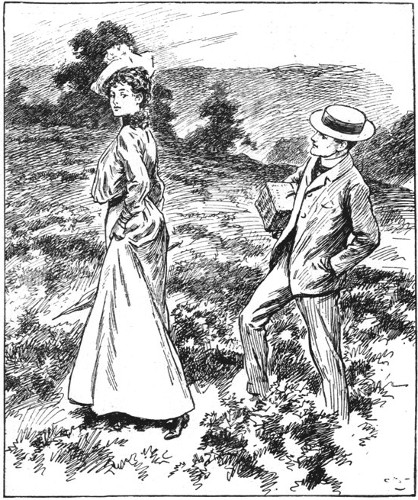 "'I DON'T THINK YOU'RE WALKING VERY FAST, MR. NARE,' SHE
SAID."
"'I DON'T THINK YOU'RE WALKING VERY FAST, MR. NARE,' SHE
SAID."
"But I don't think you're walking very fast, Mr. Nare," she said, severely. "And when I promised Mrs. Harrington to show you the Mill, I did[Pg 392] think you'd walk a little quicker, even though you are a Londoner."
"Don't be unkind," said Nare. "Recollect that your foot is on your native heath, while mine——"
"But we shall miss the others."
"We started first."
"Not more than half an hour, and we've come right off the road on to the moor and——"
"But it's such a jolly afternoon."
"Evening."
"And it would be a sin to stampede over these attractive buttercups," Nare pleaded.
Miss Corcoran relented with a little laugh.
"Really, you are Cockneyer than I thought. Buttercups! It's gorse."
"Same kind of yellow," said Nare.
"And there's the Mill. Now we must hurry."
Woman, it has been said, disposes, but that depends on circumstances. Nare had no desire to hurry, but hurried he certainly would have been if it were not for the episode that occurred at that moment. Afterwards he was grateful for it, but for the time being he would even have preferred hurrying. For, just as he was taking a last look at the Mill, something shadowy, but alive, came stalking slowly away from it towards them.
Involuntarily Nare whistled. In the hazy twilight it was not easy to distinguish shapes exactly, and the desolate moorland with the black bare Mill frowning in its midst, only a single skeleton sail left to show for what purpose it had been built centuries ago, and the utter silence, except for the homing bees, no doubt tended to ghostly thoughts. But either Nare was dreaming or——
"Whatever is that?" cried Miss Corcoran, suddenly catching sight of it. She put a startled hand on his arm, and Nare regained his cheerfulness.
"This Cockney suggests that it's a cow—a stray cow."
"But——"
"Probably an Alderney," Nare pursued, "with pink eyes and——"
The creature was making towards them on the circumference of a circle, and as Nare talked he walked slowly towards the Mill. There must be some kind of shelter there.
"And crumpled horns," Nare continued.
"But this isn't our way, Mr. Nare."
The girl spoke in a protesting tone, but without giving any sign of a desire to stop. Indeed, she went rather faster and did not look behind her. The Alderney was a little behind them now.
"Don't you think we ought to——"
"G-r-r-r-r!" A noise, thunderous and snarling, interrupted her in the middle of a sentence. Nare was looking back.
"How horrible!"
"Perhaps it wants to be milked"—Nare spoke without turning his head—"or it's hungry. I think you'd better go into the Mill, please."
"You'll come?"
"Yes."
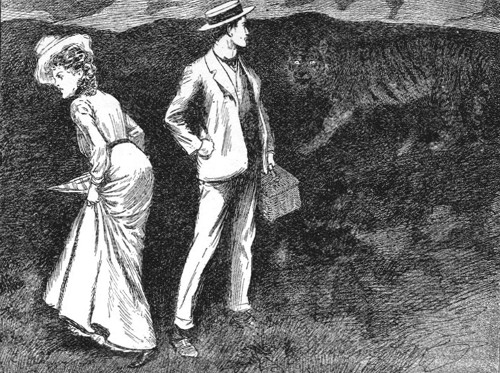 "MISS CORCORAN GATHERED UP HER SKIRTS AND RAN."
"MISS CORCORAN GATHERED UP HER SKIRTS AND RAN."
And with that Miss Corcoran gathered up her skirts and ran. Nare followed with one eye on the enemy in the rear. The beast had stopped in its circling and was glaring after them.
"As fast as you can!"
The girl heard Nare talking to her, and[Pg 393] felt in a dream. A second growl rose and seemed to shake the rotten timbers of the Mill as she ran into it.
"Up the ladder!"
There was a nine-foot ladder, shaky, with rat-gnawed rungs, leading through a trap on to the first floor of the Mill from the ground. And Miss Corcoran went up it swiftly, with gratitude in her heart to the rats for not having gnawed it through, since there was no door to the Mill wherewith to bolt out undesirable company. The Mill seemed to be echoing still with that growl as she turned at the top and, kneeling, found Nare ascending after her through the narrow hole. She said nothing until he had got up and tried to unfix the ladder without success. Then, as he desisted:—
"Mr. Nare," she said, "was it a—a—tiger?"
Nare put down his picnic basket with an injured air.
"If it wasn't," he said, "I don't know what it was. But I'm beginning to think you're right, and that I don't know the country. I certainly thought tigers were extinct. If they're not, I don't think it's fair to ask an unfortunate Londoner out into the wilds and arm him with nothing better than a picnic basket."
He rattled on to give the girl time to recover herself. He was a little afraid of hysterics, which would have been pardonable but unavailing. She seemed to suspect his fear, for she mustered a smile and said:—
"I don't think I'm going to be foolish. Tell me, please, what do you think we ought to do?"
That was exactly what Nare did not know. Looking down through the trap, he was conscious of a pair of fierce yellow eyes glaring up at him.
"A good deal depends on the tiger," he said. "As this is one from a menagerie it may know how to behave itself in company, but—isn't there a top floor to this Mill?"
There was, and another ladder leading to it. And Miss Corcoran, followed by Nare, reached it in less time than it takes to tell. The tiger had reared its paws on to the lower ladder and delivered itself, of another terrific growl.
"I—I didn't know they could climb," said Miss Corcoran, faintly. "Oh!"
A scuffling noise accompanied by a groaning of wood was what they heard, and then a soft padding of feet in the room they had just deserted. Apparently this tiger could climb.
"The deuce!" said Nare, beneath his breath. He had never in his life been in a more unpleasant situation—never, indeed, in anything like it. At first the thing had seemed like some burlesque nightmare, but now the burlesque was going out of it. What could one do to a tiger?
He sat cross-legged over the trap, reflecting and listening to the pad, pad below. If only there were a cover to the trap, but there was none. His companion was looking out of a sort of small slit in the side of the Mill that had been made to serve the purpose of a window once, hiding her tears, Nare fancied. It was too narrow to get through, and in any case there would be a drop of twenty or thirty feet. Half unconsciously Nare began to unpack the picnic basket which he had carried along from room to room. He had some vague idea of throwing the tiger sandwiches as a sop. "Buns, cucumber sandwiches, a packet of salt. Do you see anything, Sister Anne?" He broke off enumerating the contents of the basket, seeing that Miss Corcoran had started.
"I—no——"
"A chocolate cake—tea—pepper—pepper——"
"Yes, I do," Miss Corcoran suddenly burst out. "There's someone coming—this way. He's—he's on a—it's Sir Henry."
In spite of the presence of the tiger and the diversion likely to be caused by the arrival of the baronet, Nare felt a trifle jealous. If the diversion were caused it would be to the baronet's credit, that was certain, and he sat over the trap, aimlessly untying the packet marked pepper, while he listened to the parley that Miss Corcoran began from the slit in the Mill wall.
A bicycle bell rung in a dignified manner announced the baronet's approach.
"Sir Henry!"
Nare could hear the brake applied before the baronet's thin, piping voice called back:—
"Who is there?"
"It's I—Judith Corcoran—and Mr. Nare. We're in the Mill—and——"
"Indeed!"
Suspicion was plain in the baronet's "Indeed!" Nare lost the next few words in trying to catch a sound of the padding feet below.
"And the animal that escaped that you told us of—is here—it's a tiger!"
An unpleasant, high-pitched laugh greeted Miss Corcoran's explanation—a laugh that showed Sir Henry in about as incredulous a frame of mind as a jealous man might be.[Pg 394]
"Ah!" he sniggered. "What charming company! Two—and a tiger!"
"G-r-r-r-r!"
Nare had just risen in a fury of indignation to throw something—anything that could be got through the window—at the baronet's head, when that tremendous growl came, followed by the creaking and groaning of wood. The tiger was ascending to their last retreat. In a whirling fashion Nare was conscious of this, and of Miss Corcoran's pale face, as he stood once more over the trap. From outside came a sound of frantic pedalling, as though Sir Henry had forgotten his scepticism and was wheeling round in order to be off. Otherwise the stillness was intolerable; and in the middle of it Nare, his fingers tearing idly at the white-papered packet in his hands, suddenly found himself looking into those great yellow eyes, not three feet away. And at that, his fingers relaxing, the packet and its contents fell plump into the tiger's face.
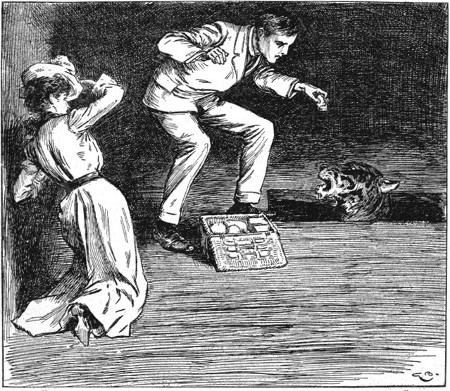 "NARE SUDDENLY FOUND HIMSELF LOOKING INTO THOSE GREAT YELLOW
EYES."
"NARE SUDDENLY FOUND HIMSELF LOOKING INTO THOSE GREAT YELLOW
EYES."
"By Jove!"
A swishing, sneezing noise, as of a score of cats under a hose, a heavy thud, a downward galloping, pad and patter, and the tiger was gone. It had found an ounce of pepper in its eyes and nostrils as unpleasant as it was unexpected.
"Pepper's the thing," said Nare, devoutly, discovering a moment later that he was supporting Miss Corcoran in his arms.
"Yes," said Judith, faintly; "I'm so glad——"
Of what she did not say, but irrelevancy did not seem to matter.
"Look!" cried Nare.
Through the uncasemented window they could see in the fast-gathering dusk the long white path over the moor. It looked even whiter for the shadows all about, so that, visible at a distance of some quarter of a mile, was the bent figure of a tricyclist, all among the wheels, pedalling away for dear life. After him, and as if in pursuit, cantered a shadowy, four-legged thing, that tossed its head uneasily as it went and seemed to have no tail.
"Tail's between its legs," said Nare. "So's Sir Henry's."
"I hope it won't catch him," said Miss Judith, kindly, but without the intonation of extreme solicitude. After all, Sir Henry had a good start. "He is going fast," she added, critically, as he vanished over a distant ridge. "There goes the tiger."
"We may as well be off too," said Nare, "before it comes back. Sir Henry by himself won't make much of a meal. Awfully jolly walk it's been."
They went on, not too fast, in the opposite direction from that taken by the tiger.
Humour is such an elusive quality, depending so much upon individual temperament, that it is difficult to say in what consists its absolute perfection. We know what makes us laugh most; but do we know what will make another laugh most? Yet after all this is true of every art. Why should we not have chefs d'œvure of pictorial comedy?
Suppose any reader of The Strand Magazine with a normal sense of humour were asked, "What is the funniest picture you remember ever to have seen?" Would he not ransack his memory—would he not turn to the files of Punch, to the comic almanacs, to such examples of foreign pictorial humour as had chanced to come in his way—and end by declaring that it was impossible to make any selection at all in such a wilderness of mirth-provoking designs, or, having hit upon one, to find it, upon re-inspection, to be no longer as funny as he thought it at the time—years ago?
But in quite a different case is another small class in the community. These are the authors and manufacturers of humorous pictures themselves. They, not only from having a special gift of comedy, but from having presumably studied, or been interested in, the work of other draughtsmen, might confidently be expected to know their own minds. And so to them the writer addressed the question, What was the funniest picture they had ever seen? What had a right to be considered a masterpiece of pictorial comedy?
At the outset the writer must not forget to mention that a few years ago, in a confidential chat he had with the late Mr. Phil May, he was pleasurably surprised to learn the high esteem in which that gifted humorist held one of the earliest and greatest masters of pictorial comedy, James Gillray.
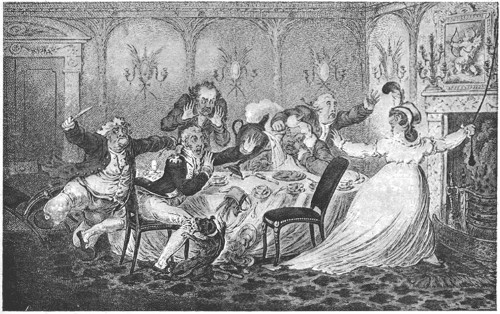 "Company Shocked at a Lady Getting Up to Ring the Bell."—By
Gillray.
"Company Shocked at a Lady Getting Up to Ring the Bell."—By
Gillray..
"There is nobody to-day to touch him," were May's words. "Look at his sweep of line and his astonishing mastery over the grotesque and ridiculous. There are pictures so extraordinarily funny that you can't laugh—'too funny for words,' if you catch what I mean." As he spoke he turned to a folio containing several specimens of Gillray's drawings. One in particular was, if too funny for words, not too funny to be laughed at, for May's smile broadened enormously as he held it up for inspection—"Company Shocked at a Lady Getting Up to Ring the Bell." "Now, I call that funny," he said, "and it was, perhaps, a hundred times funnier a hundred years ago, when the characters were well-known people. There's nothing 'dates' so much as the average comic[Pg 396] picture, especially a social caricature, but the fun of this is pretty fresh still." On the whole, most of Gillray's and Rowlandson's best work is a little too highly flavoured—too broad—for the taste of to-day.
Passing along a half-century we come to John Leech, and thenceforward to a succession of great masters of pictorial fun—Wilhelm Büsch, Charles Keene, Du Maurier, Sambourne, Oberlander, Caran d'Ache, Phil May, Frederick Opper, Zimmerman, and Raven-Hill. To these names many—fully as distinguished—might be added, such as Forain, Gibson, and Graetz, but for pure fun those we have mentioned may be called the masters. Amongst their numerous productions ought to be found some sketch which deserves to be called the very funniest picture or set of pictures delineating a single humorous idea. Each artist has his own followers. We have seen Phil May singling out a drawing by Gillray as appealing to his sense of humour. The draughtsmen of to-day in this line of work in England doubtless count no cleverer men than Raven-Hill, Tom Browne, John Hassall, Leslie Willson, William Parkinson, Louis Wain, and Charles Harrison.
Wilhelm Büsch was for years the chief comic draughtsman of the celebrated Fliegende Blätter—the German Punch. Not all his best work, however, was done for this paper, as Büsch illustrated and occasionally wrote numerous humorous brochures, which enjoyed a wide sale, and in his own opinion—according to one of his intimate friends whom we have consulted—he never achieved anything funnier than the pictures which accompanied a little book called "The Fools' Paradise," and the funniest drawings in that book are those which appear on this page.
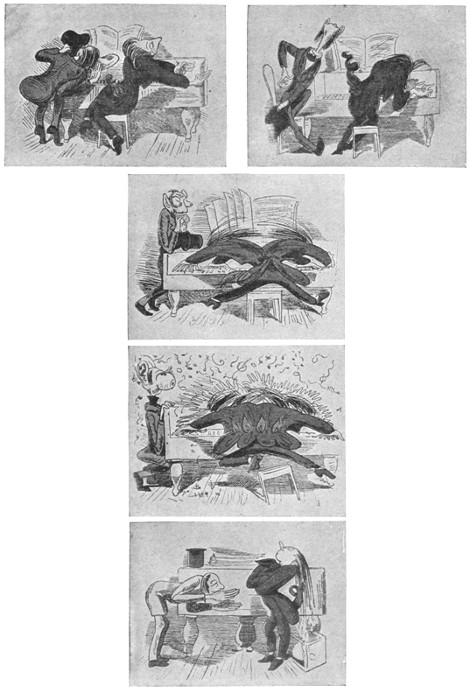 "A Pianoforte Performance."—By Wilhelm Büsch.
"A Pianoforte Performance."—By Wilhelm Büsch.But now let us hear what Mr. Linley Sambourne has to[Pg 397] say about the work of this artist:—
"To attempt to even indicate the birthplace of the world's masterpiece of pictorial humour is beyond the capacity of a single individual. So very few can see humour with the same eyes or appreciation. What you seek has probably perished in past ages, together with its contemporaneous companions in a higher branch. To me, personally, some of the designs of the late Wilhelm Büsch, of Munich, seem to have more humour, if by that is meant fun, than anything I can remember having seen."
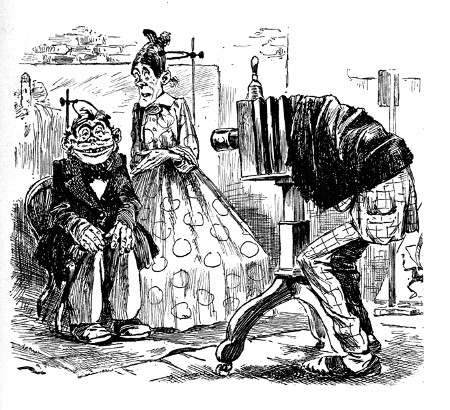 Under Her Breath.—Mrs. Conlan: "Whisht, Pat!"
Under Her Breath.—Mrs. Conlan: "Whisht, Pat!"Mr. Sambourne's clever colleague, Mr. Leonard Raven-Hill, finds "the very funniest picture" amongst the work of the American artist, Zimmerman.
"For absolute comic humour," he writes, "no one has equalled Zimmerman, of the New York Judge, in my opinion. Charles Keene is, of course, miles ahead of any other man in quiet humour; but I can't think of any particular examples."
Of Zimmerman's drawings Mr. Raven-Hill selects three, of which we herewith present what strikes us as the most comical.
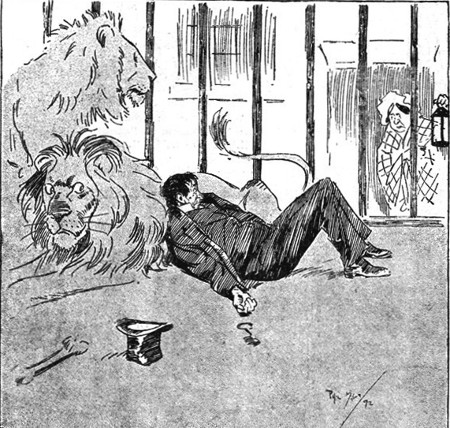 Wife (to lion-tamer, who has been out late): "You coward!"
Wife (to lion-tamer, who has been out late): "You coward!"Few comic artists are at once so prolific and so amusing as Mr. Tom Browne, who, in selecting the picture reproduced below, writes to us as follows:—
"I have no hesitation in ascribing to the late Phil May some of the most delightful specimens of illustrated humour that have ever graced the British or any other Press; but to positively indicate what I consider to be that master's choicest[Pg 398] joke or drawing is a difficult matter. Phil May had a very keen sense of humour; moreover, he was a master of line. He knew what a line would do better than any man ever did before him. He could seize on the essentials of a subject and adequately represent it in the fewest lines anyone had ever employed before. Yet nothing was lacking. And the lines and the forms they represented were always accurate. There was a lot of humour in the sketch of the lion-tamer which appeared in one of the winter annuals. The tamer of lions had been staying out late, and to avoid the furious attentions of his wrathful spouse had taken refuge in the lions' den. The aforesaid wrathful spouse was shaking her fist in front of the bars and crying out, 'You coward!'
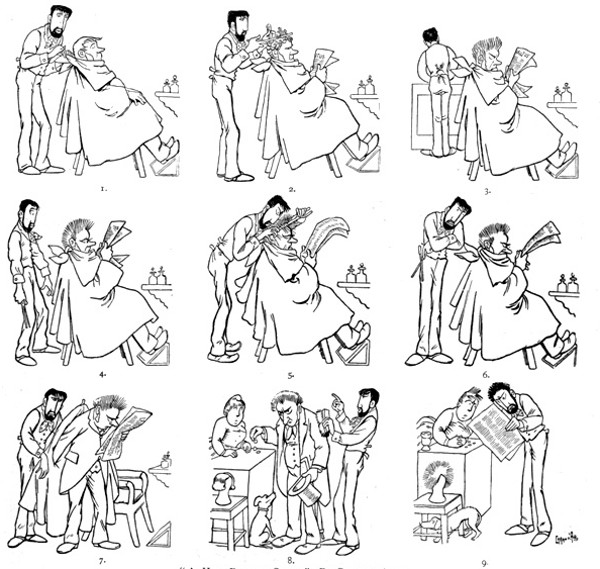 "A Hair-Raising Story."—By Caran D'ache.
"A Hair-Raising Story."—By Caran D'ache."Quite a little masterpiece in its way was the sketch of the very tipsy newsman, who had the contents-bill of the special edition he was selling stuck on a sandwich board that covered his chest. In large letters on the contents-bill was printed, 'Result of the Cup.'
"And there are others, scores of them, all good because they were Phil May's. In cold type they sound nothing. Phil May's pen made masterpieces of them all."
An English black-and-white draughtsman, with an almost unique experience of pictorial comedy in Germany, America, and this country, is Mr. Leslie Willson, for years one of the chief artists of the New York Judge, and latterly art editor of Pick-Me-Up. Mr. Willson, with his wide experience of comic achievements, says:[Pg 399]—
"The very funniest pictures I ever saw were by that astonishingly clever Franco-Russian, Emmanuel Poiré, otherwise 'Caran d'Ache.' The particular set I have in mind depicted a scene in a barber's shop, where the customer's hair, standing on end from horror, defies all the barber's attempts to curl it. There are other funny things from Caran d'Ache's pencil, but this, I think, is the funniest." These are the drawings reproduced on the opposite page.
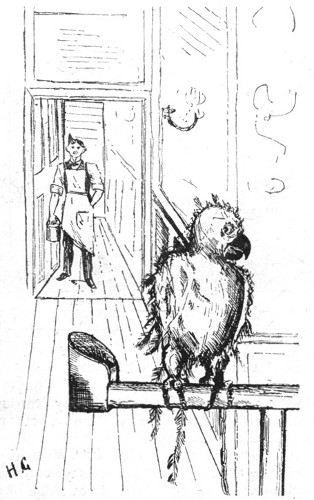 Parrot: "Here he comes again. If he pulls another feather out I'll fly
away!"
Parrot: "Here he comes again. If he pulls another feather out I'll fly
away!"Mr. John Hassall, whose work is familiar to all, writes to say:—
"The most humorous drawing I have ever seen was in the Christmas number of the Pelican, some few years back, of a parrot with one feather sticking out of its tail—the rest bare—sitting on its perch, and a pot-boy in the background. Below was the inscription: 'Here he comes again. If he pulls another feather out I'll fly away!' It was by an actor, I fancy. For the most humorous artist I should plump for Zim. Zimmerman, who draws for New York Judge. About ten years ago his work was, to my mind, always exceedingly humorous."
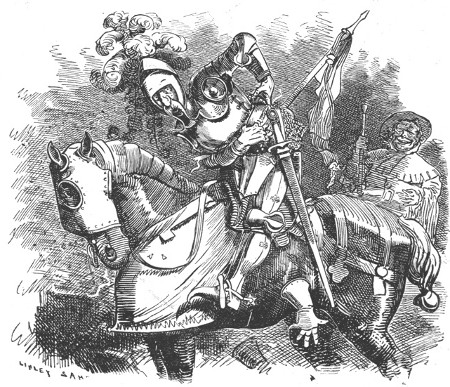 "An Incident in the Middle Ages."—By Linley Sambourne in "Punch."
"An Incident in the Middle Ages."—By Linley Sambourne in "Punch."
A draughtsman with a keen sense of humour is Mr. William Parkinson. He writes:—
"For real funniness, I think A. B. Frost, the American, is very hard to beat; especially in some of his picture-stories in the last pages of Scribner or the Century. I should call his book of drawings, 'The Good-Natured Man and the Bull Calf,' a masterpiece of humour. Linley Sambourne also is a master and an artist too, and some of his drawings for Punch's Almanacks are real masterpieces. 'An Incident in the Middle Ages,' where a poor knight in armour is tormented under his mail shirt by a persistent——Well,[Pg 400] the fancy is tickled as much as was the poor knight."
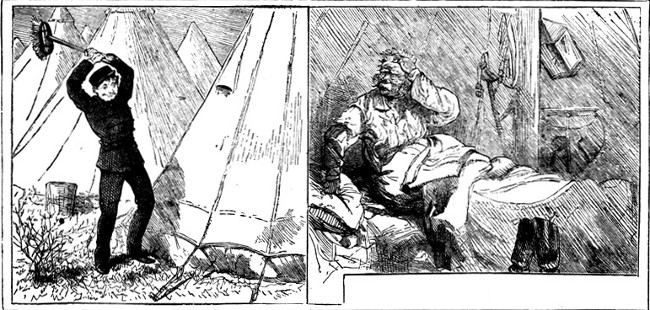 An ensign who thought he would wake up another ensign for a
lark—But he mistook the tent.
An ensign who thought he would wake up another ensign for a
lark—But he mistook the tent.There are not many pictorial comedians with a larger following than Mr. Louis Wain, who tells us:—
"I like one of Corbould's drawings best which appeared in the Graphic of some eighteen years back. A subaltern with a broom over his head was hitting out at a military tent with it where there appeared to be a protuberance. A second picture showed a fat general sitting up in bed rubbing his head and looking furiously mad. (He had had the broom on it.) This drawing has kept me happy through many a gloomy period, and set my own work going again."
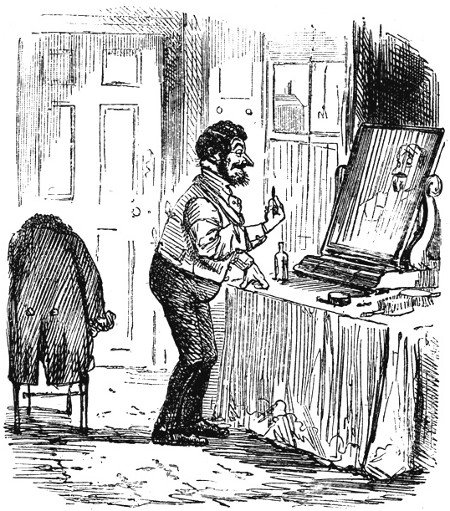 The Moustache Movement.—Old Mr. What's-His-Name: "Egad, I
don't wonder at moustaches coming into fashion; for—eh? What? By Jove, it
does improve one's appearance."
The Moustache Movement.—Old Mr. What's-His-Name: "Egad, I
don't wonder at moustaches coming into fashion; for—eh? What? By Jove, it
does improve one's appearance.""With a pretty extensive knowledge of all the Continental and American artists," writes Mr. Charles Harrison, one of the regular contributors to Punch, "I think I have derived more amusement from John Leech than anyone else. In certain things he is, and so will ever remain, absolutely unapproachable, and I enclose what I consider one of his funniest efforts. At least, there is no effort in it, which is one of the charms in all Leech's work."
Three hundred miles and more from Chimborazo, one hundred from the snows of Cotopaxi, in the wildest wastes of Ecuador's Andes, there lies that mysterious mountain valley, cut off from all the world of men, the Country of the Blind. Long years ago that valley lay so far open to the world that men might come at last through frightful gorges and over an icy pass into its equable meadows, and thither indeed men came, a family or so of Peruvian half-breeds fleeing from the lust and tyranny of an evil Spanish ruler. Then came the stupendous outbreak of Mindobamba, when it was night in Quito for seventeen days, and the water was boiling at Yaguachi and all the fish floating dying even as far as Guayaquil; everywhere along the Pacific slopes there were landslips and swift thawings and sudden floods, and one whole side of the old Arauca crest slipped and came down in thunder, and cut off the Country of the Blind for ever from the exploring feet of men. But one of these early settlers had chanced to be on the hither side of the gorges when the world had so terribly shaken itself, and he perforce had to forget his wife and his child and all the friends and possessions he had left up there, and start life over again in the lower world. He started it again but ill, blindness overtook him, and he died of punishment in the mines; but the story he told begot a legend that lingers along the length of the Cordilleras of the Andes to this day.
He told of his reason for venturing back from that fastness, into which he had first been carried lashed to a llama, beside a vast bale of gear, when he was a child. The valley, he said, had in it all that the heart of man could desire—sweet water, pasture, an even climate, slopes of rich brown soil with tangles of a shrub that bore an excellent fruit, and on one side great hanging forests of pine that held the avalanches high. Far overhead, on three sides, vast cliffs of grey-green rock were capped by cliffs of ice; but the glacier stream came not to them, but flowed away by the farther slopes, and only now and then huge ice masses fell on the valley side. In this valley it neither rained nor snowed, but the abundant springs gave a rich green pasture, that irrigation would spread over all the valley space. The settlers did well indeed there. Their beasts did well and multiplied, and but one thing marred their happiness. Yet it was enough to mar it greatly. A strange disease had come upon them and had made all the children born to them there—and, indeed, several older children also—blind. It was to seek some charm or antidote against this plague of blindness that he had with fatigue and danger and difficulty returned down the gorge. In those days, in such cases, men did not think of germs and infections, but of sins, and it seemed to him that the reason of this affliction must lie in the negligence of these priestless immigrants to set up a shrine so soon as they entered the valley. He wanted a shrine—a handsome, cheap, effectual shrine—to be erected in the valley; he wanted relics and such-like potent things of faith, blessed objects and mysterious medals and prayers. In his wallet he had a bar of native silver for which he would not account; he insisted there was none in the valley with something of the insistence of an inexpert liar. They had all clubbed their money and ornaments together, having little need for such treasure up there, he said, to buy them holy help against their ill. I figure this dim-eyed young mountaineer, sunburnt, gaunt, and anxious, hat brim clutched feverishly, a man all unused to the ways of the lower world, telling this story to some keen-eyed, attentive priest before the great convulsion; I can picture him presently seeking to return with pious and infallible remedies against that trouble, and the infinite dismay with which he must have faced the tumbled vastness where the gorge had once come out. But the rest of his story of mischances is lost to me, save that I know of his evil death after several years. Poor stray from that remoteness! The stream that had once made the gorge now bursts from the mouth of a rocky cave, and the legend his poor, ill-told story set going developed into the legend of a race of blind men somewhere "over there" one may still hear to-day.
And amidst the little population of that[Pg 402] now isolated and forgotten valley the disease ran its course. The old became groping and purblind, the young saw but dimly, and the children that were born to them saw never at all. But life was very easy in that snow-rimmed basin, lost to all the world, with neither thorns nor briers, with no evil insects nor any beasts save the gentle breed of llamas they had lugged and thrust and followed up the beds of the shrunken rivers in the gorges up which they had come. The seeing had become purblind so gradually that they scarcely noted their loss. They guided the sightless youngsters hither and thither until they knew the whole valley marvellously, and when at last sight died out among them the race lived on. They had even time to adapt themselves to the blind control of fire, which they made carefully in stoves of stone. They were a simple strain of people at the first, unlettered, only slightly touched with the Spanish civilization, but with something of a tradition of the arts of old Peru and of its lost philosophy. Generation followed generation. They forgot many things; they devised many things. Their tradition of the greater world they came from became mythical in colour and uncertain. In all things save sight they were strong and able, and presently chance sent one who had an original mind and who could talk and persuade among them, and then afterwards another. These two passed, leaving their effects, and the little community grew in numbers and in understanding, and met and settled social and economic problems that arose. Generation followed generation. Generation followed generation. There came a time when a child was born who was fifteen generations from that ancestor who went out of the valley with a bar of silver to seek God's aid, and who never returned. Thereabout it chanced that a man came into this community from the outer world. And this is the story of that man.
He was a mountaineer from the country near Quito, a man who had been down to the sea and had seen the world, a reader of books in an original way, an acute and enterprising man, and he was taken on by a party of Englishmen who had come out to Ecuador to climb mountains, to replace one of their three Swiss guides who had fallen ill. He climbed here and he climbed there, and then came the attempt on Parascotopetl, the Matterhorn of the Andes, in which he was lost to the outer world. The story of that accident has been written a dozen times. Pointer's narrative is the best. He tells how the little party worked their difficult and almost vertical way up to the very foot of the last and greatest precipice, and how they built a night shelter amidst the snow upon a little shelf of rock, and, with a touch of real dramatic power, how presently they found Nuñez had gone from them. They shouted, and there was no reply; shouted and whistled, and for the rest of that night they slept no more.
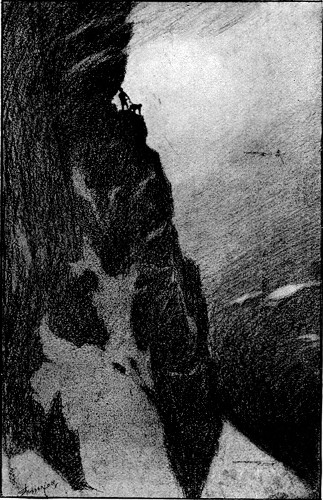 "THEY FOUND NUÑEZ HAD GONE FROM THEM."
"THEY FOUND NUÑEZ HAD GONE FROM THEM."
As the morning broke they saw the traces[Pg 403] of his fall. It seems impossible he could have uttered a sound. He had slipped eastward towards the unknown side of the mountain; far below he had struck a steep slope of snow, and ploughed his way down it in the midst of a snow avalanche. His track went straight to the edge of a frightful precipice, and beyond that everything was hidden. Far, far below, and hazy with distance, they could see trees rising out of a narrow, shut-in valley—the lost Country of the Blind. But they did not know it was the lost Country of the Blind, nor distinguish it in any way from any other narrow streak of upland valley. Unnerved by this disaster, they abandoned their attempt in the afternoon, and Pointer was called away to the war before he could make another attack. To this day Parascotopetl lifts an unconquered crest, and Pointer's shelter crumbles unvisited amidst the snows.
And the man who fell survived.
At the end of the slope he fell a thousand feet, and came down in the midst of a cloud of snow upon a snow-slope even steeper than the one above. Down this he was whirled, stunned and insensible, but without a bone broken in his body; and then at last came to gentler slopes, and at last rolled out and lay still, buried amidst a softening heap of the white masses that had accompanied and saved him. He came to himself with a dim fancy that he was ill in bed; then realized his position with a mountaineer's intelligence and worked himself loose and, after a rest or so, out until he saw the stars. He rested flat upon his chest for a space, wondering where he was and what had happened to him. He explored his limbs, and discovered that several of his buttons were gone and his coat turned over his head. His knife had gone from his pocket and his hat was lost, though he had tied it under his chin. He recalled that he had been looking for loose stones to raise his piece of the shelter wall. His ice-axe had disappeared.
He decided he must have fallen, and looked up to see, exaggerated by the ghastly light of the rising moon, the tremendous flight he had taken. For a while he lay, gazing blankly at that vast, pale cliff towering above, rising moment by moment out of a subsiding tide of darkness. Its phantasmal, mysterious beauty held him for a space, and then he was seized with a paroxysm of sobbing laughter....
After a great interval of time he became aware that he was near the lower edge of the snow. Below, down what was now a moon-lit and practicable slope, he saw the dark and broken appearance of rock-strewn turf. He struggled to his feet, aching in every joint and limb, got down painfully from the heaped loose snow about him, went downward until he was on the turf, and there dropped rather than lay beside a boulder, drank deep from the flask in his inner pocket, and instantly fell asleep....
He was awakened by the singing of birds in the trees far below.
He sat up and perceived he was on a little alp at the foot of a vast precipice that sloped only a little in the gully down which he and his snow had come. Over against him another wall of rock reared itself against the sky. The gorge between these precipices ran east and west and was full of the morning sunlight, which lit to the westward the mass of fallen mountain that closed the descending gorge. Below him it seemed there was a precipice equally steep, but behind the snow in the gully he found a sort of chimney-cleft dripping with snow-water, down which a desperate man might venture. He found it easier than it seemed, and came at last to another desolate alp, and then after a rock climb of no particular difficulty to a steep slope of trees. He took his bearings and turned his face up the gorge, for he saw it opened out above upon green meadows, among which he now glimpsed quite distinctly a cluster of stone huts of unfamiliar fashion. At times his progress was like clambering along the face of a wall, and after a time the rising sun ceased to strike along the gorge, the voices of the singing birds died away, and the air grew cold and dark about him. But the distant valley with its houses was all the brighter for that. He came presently to talus, and among the rocks he noted—for he was an observant man—an unfamiliar fern that seemed to clutch out of the crevices with intense green hands. He picked a frond or so and gnawed its stalk, and found it helpful.
About midday he came at last out of the throat of the gorge into the plain and the sunlight. He was stiff and weary; he sat down in the shadow of a rock, filled up his flask with water from a spring and drank it down, and remained for a time, resting before he went on to the houses.
They were very strange to his eyes, and indeed the whole aspect of that valley became, as he regarded it, queerer and more unfamiliar. The greater part of its surface was lush green meadow, starred with many beautiful flowers, irrigated with extraordinary[Pg 404] care, and bearing evidence of systematic cropping piece by piece. High up and ringing the valley about was a wall, and what appeared to be a circumferential water channel, from which the little trickles of water that fed the meadow plants came, and on the higher slopes above this flocks of llamas cropped the scanty herbage. Sheds, apparently shelters or feeding-places for the llamas, stood against the boundary wall here and there. The irrigation streams ran together into a main channel down the centre of the valley, and this was enclosed on either side by a wall breast high. This gave a singularly urban quality to this secluded place, a quality that was greatly enhanced by the fact that a number of paths paved with black and white stones, and each with a curious little kerb at the side, ran hither and thither in an orderly manner. The houses of the central village were quite unlike the casual and higgledy-piggledy agglomeration of the mountain villages he knew; they stood in a continuous row on either side of a central street of astonishing cleanness, here and there their parti-coloured façade was pierced by a door, and not a solitary window broke their even frontage. They were parti-coloured with extraordinary irregularity, smeared with a sort of plaster that was sometimes grey, sometimes drab, sometimes slate-coloured or dark brown; and it was the sight of this wild plastering first brought the word "blind" into the thoughts of the explorer. "The good man who did that," he thought, "must have been as blind as a bat."
He descended a steep place, and so came to the wall and channel that ran about the valley, near where the latter spouted out its surplus contents into the deeps of the gorge in a thin and wavering thread of cascade. He could now see a number of men and women resting on piled heaps of grass, as if taking a siesta, in the remoter part of the meadow, and nearer the village a number of recumbent children, and then nearer at hand three men carrying pails on yokes along a little path that ran from the encircling wall towards the houses. These latter were clad in garments of llama cloth and boots and belts of leather, and they wore caps of cloth with back and ear flaps. They followed one another in single file, walking slowly and yawning as they walked, like men who have been up all night. There was something so reassuringly prosperous and respectable in their bearing that after a moment's hesitation Nuñez stood forward as conspicuously as possible upon his rock, and gave vent to a mighty shout that echoed round the valley.
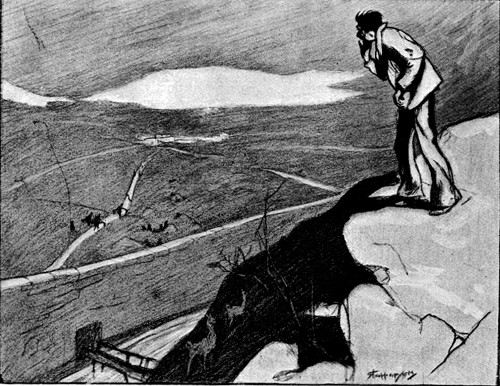 "NUÑEZ STOOD FORWARD AS CONSPICUOUSLY AS POSSIBLE UPON HIS
ROCK."
"NUÑEZ STOOD FORWARD AS CONSPICUOUSLY AS POSSIBLE UPON HIS
ROCK."
The three men stopped, and moved their heads as though they were looking about them. They turned their faces this way and that, and Nuñez gesticulated with freedom. But they did not appear to see him for all his gestures, and after a time, directing themselves towards the mountains far away to the right, they shouted as if in answer. Nuñez bawled again, and then once more, and as he gestured ineffectually the word "blind" came up to the top of his thoughts. "The fools must be blind," he said.
When at last, after much shouting and wrath, Nuñez crossed the stream by a little bridge, came through a gate in the wall, and approached them, he was sure that they were blind. He was sure that this was the Country of the Blind of which the legends told. Conviction had sprung upon him, and a sense of great and rather enviable adventure. The three stood side by side, not looking at him, but with their ears directed towards him, judging him by his unfamiliar steps. They stood close together like men a little afraid, and he could see their eyelids closed and sunken, as though the very balls beneath had shrunk away. There was an expression near awe on their faces.
"A man," one said, in hardly recognisable Spanish. "A man it is—a man or a spirit—coming down from the rocks."
But Nuñez advanced with the confident steps of a youth who enters upon life. All the old stories of the lost valley and the Country of the Blind had come back to his mind, and through his thoughts ran this old proverb, as if it were a refrain:—
"In the Country of the Blind the One-Eyed Man is King."
"In the Country of the Blind the One-Eyed Man is King."
And very civilly he gave them greeting. He talked to them and used his eyes.
"Where does he come from, brother Pedro?" asked one.
"Down out of the rocks."
"Over the mountains I come," said Nuñez, "out of the country beyond there—where men can see. From near Bogota—where there are a hundred thousands of people, and where the city passes out of sight."
"Sight?" muttered Pedro. "Sight?"
"He comes," said the second blind man, "out of the rocks."
The cloth of their coats Nuñez saw was curiously fashioned, each with a different sort of stitching.
They startled him by a simultaneous movement towards him, each with a hand outstretched. He stepped back from the advance of these spread fingers.
"Come hither," said the third blind man, following his motion and clutching him neatly.
And they held Nuñez and felt him over, saying no word further until they had done so.
"Carefully," he cried, with a finger in his eye, and found they thought that organ, with its fluttering lids, a queer thing in him. They went over it again.
"A strange creature, Correa," said the one called Pedro. "Feel the coarseness of his hair. Like a llama's hair."
"Rough he is as the rocks that begot him," said Correa, investigating Nuñez's unshaven chin with a soft and slightly moist hand. "Perhaps he will grow finer."
Nuñez struggled a little under their examination, but they gripped him firm.
"Carefully," he said again.
"He speaks," said the third man. "Certainly he is a man."
"Ugh!" said Pedro, at the roughness of his coat.
"And you have come into the world?" asked Pedro.
"Out of the world. Over mountains and glaciers; right over above there, half-way to the sun. Out of the great, big world that goes down, twelve days' journey to the sea."
They scarcely seemed to heed him. "Our fathers have told us men may be made by the forces of Nature," said Correa. "It is the warmth of things, and moisture, and rottenness—rottenness."
"Let us lead him to the elders," said Pedro.
"Shout first," said Correa, "lest the children be afraid. This is a marvellous occasion."
So they shouted, and Pedro went first and took Nuñez by the hand to lead him to the houses.
He drew his hand away. "I can see," he said.
"See?" said Correa.
"Yes; see," said Nuñez, turning towards him, and stumbled against Pedro's pail.
"His senses are still imperfect," said the third blind man. "He stumbles, and talks unmeaning words. Lead him by the hand."
"As you will," said Nuñez, and was led along, laughing.
It seemed they knew nothing of sight.
Well, all in good time he would teach them.
He heard people shouting, and saw a[Pg 406] number of figures gathering together in the middle roadway of the village.
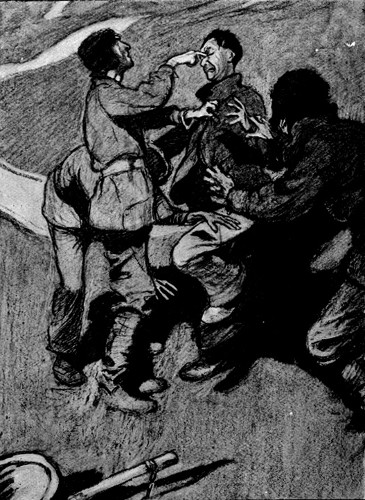 "'CAREFULLY,' HE CRIED, WITH A FINGER IN HIS EYE."
"'CAREFULLY,' HE CRIED, WITH A FINGER IN HIS EYE."
He found it tax his nerve and patience more than he had anticipated, that first encounter with the population of the Country of the Blind. The place seemed larger as he drew near to it, and the smeared plasterings queerer, and a crowd of children and men and women (the women and girls he was pleased to note had, some of them, quite sweet faces, for all that their eyes were shut and sunken) came about him, holding on to him, touching him with soft, sensitive hands, smelling at him, and listening at every word he spoke. Some of the maidens and children, however, kept aloof as if afraid, and indeed his voice seemed coarse and rude beside their softer notes. They mobbed him. His three guides kept close to him with an effect of proprietorship, and said again and again, "A wild man out of the rocks."
"Bogota," he said. "Bogota. Over the mountain crests."
"A wild man—using wild words," said Pedro. "Did you hear that—Bogota? His mind has hardly formed yet. He has only the beginnings of speech."
A little boy nipped his hand. "Bogota!" he said, mockingly.
"Aye! A city to your village. I come from the great world—where men have eyes and see."
"His name's Bogota," they said.
"He stumbled," said Correa—"stumbled twice as we came hither."
"Bring him in to the elders."
And they thrust him suddenly through a doorway into a room as black as pitch, save at the end there faintly glowed a fire. The crowd closed in behind him and shut out all but the faintest glimmer of day, and before he could arrest himself he had fallen headlong over the feet of a seated man. His arm, out-flung, struck the face of someone else as he went down; he felt the soft impact of features and heard a cry of anger, and for a moment he struggled against a number of hands that clutched him. It was a one-sided fight. An inkling of the situation came to him and he lay quiet.
"I fell down," he said; "I couldn't see in this pitchy darkness."
There was a pause as if the unseen persons about him tried to understand his words. Then the voice of Correa said: "He is but newly formed. He stumbles as he walks and mingles words that mean nothing with his speech."
Others also said things about him that he heard or understood imperfectly.
"May I sit up?" he asked, in a pause. "I will not struggle against you again."
They consulted and let him rise.
The voice of an older man began to question him, and Nuñez found himself trying to explain the great world out of which he had[Pg 407] fallen, and the sky and mountains and sight and such-like marvels, to these elders who sat in darkness in the Country of the Blind. And they would believe and understand nothing whatever that he told them, a thing quite outside his expectation. They would not even understand many of his words. For fourteen generations these people had been blind and cut off from all the seeing world; the names for all the things of sight had faded and changed; the story of the outer world was faded and changed to a child's story; and they had ceased to concern themselves with anything beyond the rocky slopes above their circling wall. Blind men of genius had arisen among them and questioned the shreds of belief and tradition they had brought with them from their seeing days, and had dismissed all these things as idle fancies and replaced them with new and saner explanations. Much of their imagination had shrivelled with their eyes, and they had made for themselves new imaginations with their ever more sensitive ears and fingertips. Slowly Nuñez realized this: that his expectation of wonder and reverence at his origin and his gifts was not to be borne out; and after his poor attempt to explain sight to them had been set aside as the confused version of a new-made being describing the marvels of his incoherent sensations, he subsided, a little dashed, into listening to their instruction. And the eldest of the blind men explained to him life and philosophy and religion, how that the world (meaning their valley) had been first an empty hollow in the rocks, and then had come first inanimate things without the gift of touch, and llamas and a few other creatures that had little sense, and then men, and at last angels, whom one could hear singing and making fluttering sounds, but whom no one could touch at all, which puzzled Nuñez greatly until he thought of the birds.
He went on to tell Nuñez how this time had been divided into the warm and the cold, which are the blind equivalents of day and night, and how it was good to sleep in the warm and work during the cold, so that now, but for his advent, the whole town of the blind would have been asleep. He said Nuñez must have been specially created to learn and serve the wisdom they had acquired, and that for all his mental incoherency and stumbling behaviour he must have courage and do his best to learn, and at that all the people in the doorway murmured encouragingly. He said the night—for the blind call their day night—was now far gone, and it behoved everyone to go back to sleep. He asked Nuñez if he knew how to sleep, and Nuñez said he did, but that before sleep he wanted food. They brought him food, llama's milk in a bowl and rough salted bread, and led him into a lonely place to eat out of their hearing, and afterwards to slumber until the chill of the mountain evening roused them to begin their day again. But Nuñez slumbered not at all.
Instead, he sat up in the place where they had left him, resting his limbs and turning the unanticipated circumstances of his arrival over and over in his mind.
Every now and then he laughed, sometimes with amusement and sometimes with indignation.
"Unformed mind!" he said. "Got no senses yet! They little know they've been insulting their Heaven-sent King and master....
"I see I must bring them to reason.
"Let me think.
"Let me think."
He was still thinking when the sun set.
Nuñez had an eye for all beautiful things, and it seemed to him that the glow upon the snow-fields and glaciers that rose about the valley on every side was the most beautiful thing he had ever seen. His eyes went from that inaccessible glory to the village and irrigated fields, fast sinking into the twilight, and suddenly a wave of emotion took him, and he thanked God from the bottom of his heart that the power of sight had been given him.
He heard a voice calling to him from out of the village.
"Yaho there, Bogota! Come hither!"
At that he stood up, smiling. He would show these people once and for all what sight would do for a man. They would seek him, but not find him.
"You move not, Bogota," said the voice.
He laughed noiselessly and made two stealthy steps aside from the path.
"Trample not on the grass, Bogota; that is not allowed."
Nuñez had scarcely heard the sound he made himself. He stopped, amazed.
The owner of the voice came running up the piebald path towards him.
He stepped back into the pathway. "Here I am," he said.
"Why did you not come when I called you?" said the blind man. "Must you be led like a child? Cannot you hear the path as you walk?"
Nuñez laughed. "I can see it," he said.[Pg 408]
"There is no such word as see," said the blind man, after a pause. "Cease this folly and follow the sound of my feet."
Nuñez followed, a little annoyed.
"My time will come," he said.
"You'll learn," the blind man answered. "There is much to learn in the world."
"Has no one told you, 'In the Country of the Blind the One-Eyed Man is King'?"
"What is blind?" asked the blind man, carelessly, over his shoulder.
Four days passed and the fifth found the King of the Blind still incognito, as a clumsy and useless stranger among his subjects.
It was, he found, much more difficult to proclaim himself than he had supposed, and in the meantime, while he meditated his coup d'état, he did what he was told and learnt the manners and customs of the Country of the Blind. He found working and going about at night a particularly irksome thing, and he decided that that should be the first thing he would change.
They led a simple, laborious life, these people, with all the elements of virtue and happiness as these things can be understood by men. They toiled, but not oppressively; they had food and clothing sufficient for their needs; they had days and seasons of rest; they made much of music and singing, and there was love among them and little children. It was marvellous with what confidence and precision they went about their ordered world. Everything, you see, had been made to fit their needs; each of the radiating paths of the valley area had a constant angle to the others, and was distinguished by a special notch upon its kerbing; all obstacles and irregularities of path or meadow had long since been cleared away; all their methods and procedure arose naturally from their special needs. Their senses had become marvellously acute; they could hear and judge the slightest gesture of a man a dozen paces away—could hear the very beating of his heart. Intonation had long replaced expression with them, and touches gesture, and their work with hoe and spade and fork was as free and confident as garden work can be. Their sense of smell was extraordinarily fine; they could distinguish individual differences as readily as a dog can, and they went about the tending of llamas, who lived among the rocks above and came to the wall for food and shelter, with ease and confidence. It was only when at last Nuñez sought to assert himself that he found how easy and confident their movements could be.
He rebelled only after he had tried persuasion.
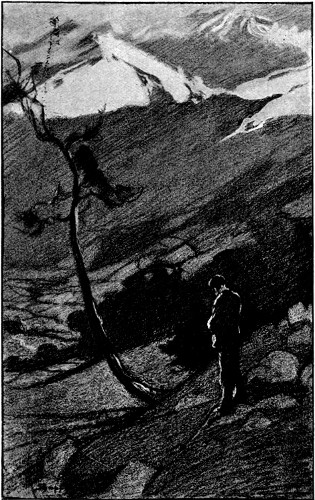 "THE GLOW UPON THE SNOW-FIELDS AND GLACIERS WAS THE MOST
BEAUTIFUL THING HE HAD EVER SEEN."
"THE GLOW UPON THE SNOW-FIELDS AND GLACIERS WAS THE MOST
BEAUTIFUL THING HE HAD EVER SEEN."
He tried at first on several occasions to tell them of sight. "Look you here, you people," he said. "There are things you do not understand in me."
Once or twice one or two of them attended to him; they sat with faces downcast and ears turned intelligently towards him, and he did[Pg 409] his best to tell them what it was to see. Among his hearers was a girl, with eyelids less red and sunken than the others, so that one could almost fancy she was hiding eyes, whom especially he hoped to persuade. He spoke of the beauties of sight, of watching the mountains, of the sky and the sunrise, and they heard him with amused incredulity that presently became condemnatory. They told him there were indeed no mountains at all, but that the end of the rocks where the llamas grazed was indeed the end of the world; thence sprang a cavernous roof of the universe, from which the dew and the avalanches fell; and when he maintained stoutly the world had neither end nor roof such as they supposed, they said his thoughts were wicked. So far as he could describe sky and clouds and stars to them it seemed to them a hideous void, a terrible blankness in the place of the smooth roof to things in which they believed—it was an article of faith with them that the cavern roof was exquisitely smooth to the touch. He saw that in some manner he shocked them, and gave up that aspect of the matter altogether, and tried to show them the practical value of sight. One morning he saw Pedro in the path called Seventeen and coming towards the central houses, but still too far off for hearing or scent, and he told them as much. "In a little while," he prophesied, "Pedro will be here." An old man remarked that Pedro had no business on path Seventeen, and then, as if in confirmation, that individual as he drew near turned and went transversely into path Ten, and so back with nimble paces towards the outer wall. They mocked Nuñez when Pedro did not arrive, and afterwards, when he asked Pedro questions to clear his character, Pedro denied and outfaced him, and was afterwards hostile to him.
Then he induced them to let him go a long way up the sloping meadows towards the wall with one complaisant individual, and to him he promised to describe all that happened among the houses. He noted certain goings and comings, but the things that really seemed to signify to these people happened inside of or behind the windowless houses—the only things they took note of to test him by—and of those he could see or tell nothing; and it was after the failure of this attempt, and the ridicule they could not repress, that he resorted to force. He thought of seizing a spade and suddenly smiting one or two of them to earth, and so in fair combat showing the advantage of eyes. He went so far with that resolution as to seize his spade, and then he discovered a new thing about himself, and that was that it was impossible for him to hit a blind man in cold blood.
He hesitated, and found them all aware that he had snatched up the spade. They stood all alert, with their heads on one side, and bent ears towards him for what he would do next.
"Put that spade down," said one, and he felt a sort of helpless horror. He came near obedience.
Then he had thrust one backwards against a house wall, and fled past him and out of the village.
He went athwart one of their meadows, leaving a track of trampled grass behind his feet, and presently sat down by the side of one of their ways. He felt something of the buoyancy that comes to all men in the beginning of a fight, but more perplexity. He began to realize that you cannot even fight happily with creatures who stand upon a different mental basis to yourself. Far away he saw a number of men carrying spades and sticks come out of the street of houses and advance in a spreading line along the several paths towards him. They advanced slowly, speaking frequently to one another, and ever and again the whole cordon would halt and sniff the air and listen.
The first time they did this Nuñez laughed. But afterwards he did not laugh.
One struck his trail in the meadow grass and came stooping and feeling his way along it.
For five minutes he watched the slow extension of the cordon, and then his vague disposition to do something forthwith became frantic. He stood up, went a pace or so towards the circumferential wall, turned, and went back a little way. There they all stood in a crescent, still and listening.
He also stood still, gripping his spade very tightly in both hands. Should he charge them?
The pulse in his ears ran into the rhythm of "In the Country of the Blind the One-Eyed Man is King!"
Should he charge them?
He looked back at the high and unclimbable wall behind—unclimbable because of its smooth plastering, but withal pierced with many little doors, and at the approaching line of seekers. Behind these others were now coming out of the street of houses.
Should he charge them?
"Bogota!" called one. "Bogota! where are you?"
He gripped his spade still tighter and[Pg 410] advanced down the meadows towards the place of habitations, and directly he moved they converged upon him. "I'll hit them if they touch me," he swore; "by Heaven, I will. I'll hit." He called aloud, "Look here, I'm going to do what I like in this valley! Do you hear? I'm going to do what I like and go where I like."
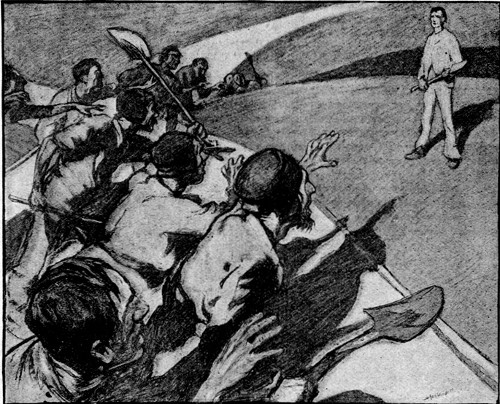 "THEY WERE MOVING IN UPON HIM QUICKLY."
"THEY WERE MOVING IN UPON HIM QUICKLY."
They were moving in upon him quickly, groping, yet moving rapidly. It was like playing blind man's buff with everyone blind-folded except one. "Get hold of him!" cried one. He found himself in the arc of a loose curve of pursuers. He felt suddenly he must be active and resolute.
"You don't understand," he cried, in a voice that was meant to be great and resolute, and which broke. "You are blind and I can see. Leave me alone!"
"Bogota! Put down that spade and come off the grass!"
The last order, grotesque in its urban familiarity, produced a gust of anger. "I'll hurt you," he said, sobbing with emotion. "By Heaven, I'll hurt you! Leave me alone!"
He began to run—not knowing clearly where to run. He ran from the nearest blind man, because it was a horror to hit him. He stopped, and then made a dash to escape from their closing ranks. He made for where a gap was wide, and the men on either side, with a quick perception of the approach of his paces, rushed in on one another. He sprang forward, and then saw he must be caught, and swish! the spade had struck. He felt the soft thud of hand and arm, and the man was down with a yell of pain, and he was through.
Through! And then he was close to the street of houses again, and blind men, whirling spades and stakes, were running with a sort of reasoned swiftness hither and thither.
He heard steps behind him just in time, and found a tall man rushing forward and swiping at the sound of him. He lost his nerve, hurled his spade a yard wide at this antagonist, and whirled about and fled, fairly yelling as he dodged another.
He was panic-stricken. He ran furiously to and fro, dodging when there was no need to dodge, and, in his anxiety to see on every side of him at once, stumbling. For a moment he was down and they heard his[Pg 411] fall. Far away in the circumferential wall a little doorway looked like Heaven, and he set off in a wild rush for it. He did not even look round at his pursuers until it was gained, and he had stumbled across the bridge, clambered a little way among the rocks, to the surprise and dismay of a young llama, who went leaping out of sight, and lay down sobbing for breath.
And so his coup d'état came to an end.
He stayed outside the wall of the valley of the blind for two nights and days without food or shelter, and meditated upon the Unexpected. During these meditations he repeated very frequently and always with a profounder note of derision the exploded proverb: "In the Country of the Blind the One-Eyed Man is King." He thought chiefly of ways of fighting and conquering these people, and it grew clear that for him no practicable way was possible. He had no weapons, and now it would be hard to get one.
The canker of civilization had got to him even in Bogota, and he could not find it in himself to go down and assassinate a blind man. Of course, if he did that, he might then dictate terms on the threat of assassinating them all. But——Sooner or later he must sleep!...
He tried also to find food among the pine trees, to be comfortable under pine boughs while the frost fell at night, and—with less confidence—to catch a llama by artifice in order to try to kill it—perhaps by hammering it with a stone—and so finally, perhaps, to eat some of it. But the llamas had a doubt of him and regarded him with distrustful brown eyes and spat when he drew near. Fear came on him the second day and fits of shivering. Finally he crawled down to the wall of the Country of the Blind and tried to make his terms. He crawled along by the stream, shouting, until two blind men came out to the gate and talked to him.
"I was mad," he said. "But I was only newly made."
They said that was better.
He told them he was wiser now, and repented of all he had done.
Then he wept without intention, for he was very weak and ill now, and they took that as a favourable sign.
They asked him if he still thought he could "see."
"No," he said. "That was folly. The word means nothing. Less than nothing!"
They asked him what was overhead.
"About ten times ten the height of a man there is a roof above the world—of rock—and very, very smooth. So smooth—so beautifully smooth...." He burst again into hysterical tears. "Before you ask me any more, give me some food or I shall die!"
He expected dire punishments, but these blind people were capable of toleration. They regarded his rebellion as but one more proof of his general idiocy and inferiority, and after they had whipped him they appointed him to do the simplest and heaviest work they had for anyone to do, and he, seeing no other way of living, did submissively what he was told.
He was ill for some days and they nursed him kindly. That refined his submission. But they insisted on his lying in the dark, and that was a great misery. And blind philosophers came and talked to him of the wicked levity of his mind, and reproved him so impressively for his doubts about the lid of rock that covered their cosmic casserole that he almost doubted whether indeed he was not the victim of hallucination in not seeing it overhead.
So Nuñez became a citizen of the Country of the Blind, and these people ceased to be a generalized people and became individualities to him, and familiar to him, while the world beyond the mountains became more and more remote and unreal. There was Yacob, his master, a kindly man when not annoyed; there was Pedro, Yacob's nephew; and there was Medina-saroté, who was the youngest daughter of Yacob. She was little esteemed in the world of the blind, because she had a clear-cut face and lacked that satisfying, glossy smoothness that is the blind man's ideal of feminine beauty, but Nuñez thought her beautiful at first, and presently the most beautiful thing in the whole creation. Her closed eyelids were not sunken and red after the common way of the valley, but lay as though they might open again at any moment; and she had long eyelashes, which were considered a grave disfigurement. And her voice was weak and did not satisfy the acute hearing of the valley swains. So that she had no lover.
There came a time when Nuñez thought that, could he win her, he would be resigned to live in the valley for all the rest of his days.
He watched her; he sought opportunities of doing her little services, and presently he found that she observed him. Once at a rest-day gathering they sat side by side in the dim starlight, and the music was sweet. His hand came upon hers and he dared to clasp it. Then very tenderly she returned his pressure. And one day, as they were at their meal in[Pg 412] the darkness, he felt her hand very softly seeking him, and as it chanced the fire leapt then, and he saw the tenderness of her face.
He sought to speak to her.
He went to her one day when she was sitting in the summer moonlight spinning. The light made her a thing of silver and mystery. He sat down at her feet and told her he loved her, and told her how beautiful she seemed to him. He had a lover's voice, he spoke with a tender reverence that came near to awe, and she had never before been touched by adoration. She made him no definite answer, but it was clear his words pleased her.
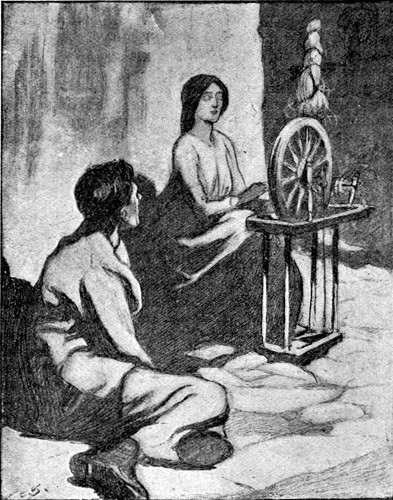 "HE SAT DOWN AT HER FEET."
"HE SAT DOWN AT HER FEET."
After that he talked to her whenever he could take an opportunity. The valley became the world for him, and the world beyond the mountains where men lived by day seemed no more than a fairy tale he would some day pour into her ears. Very tentatively and timidly he spoke to her of sight.
Sight seemed to her the most poetical of fancies, and she listened to his description of the stars and the mountains and her own sweet white-lit beauty as though it was a guilty indulgence. She did not believe, she could only half understand, but she was mysteriously delighted, and it seemed to him that she completely understood.
His love lost its awe and took courage. Presently he was for demanding her of Yacob and the elders in marriage, but she became fearful and delayed. And it was one of her elder sisters who first told Yacob that Medina-saroté and Nuñez were in love.
There was from the first very great opposition to the marriage of Nuñez and Medina-saroté; not so much because they valued her as because they held him as a being apart, an idiot, incompetent thing below the permissible level of a man. Her sisters opposed it bitterly as bringing discredit on them all; and old Yacob, though he had formed a sort of liking for his clumsy, obedient serf, shook his head and said the thing could not be. The young men were all angry at the idea of corrupting the race, and one went so far as to revile and strike Nuñez. He struck back. Then for the first time he found an advantage in seeing, even by twilight, and after that fight was over no one was disposed to raise a hand against him. But they still found his marriage impossible.
Old Yacob had a tenderness for his last little daughter, and was grieved to have her weep upon his shoulder.
"You see, my dear, he's an idiot. He has delusions; he can't do anything right."
"I know," wept Medina-saroté. "But he's better than he was. He's getting better. And he's strong, dear father, and kind—stronger and kinder than any other man in the world. And he loves me—and, father, I love him."
Old Yacob was greatly distressed to find her inconsolable, and, besides—what made it more distressing—he liked Nuñez for many things. So he went and sat in the windowless council-chamber with the other elders and watched the trend of the talk, and said, at the proper time, "He's better than he was. Very likely, some day, we shall find him as sane as ourselves."[Pg 413]
Then afterwards one of the elders, who thought deeply, had an idea. He was the great doctor among these people, their medicine-man, and he had a very philosophical and inventive mind, and the idea of curing Nuñez of his peculiarities appealed to him. One day when Yacob was present he returned to the topic of Nuñez. "I have examined Nuñez," he said, "and the case is clearer to me. I think very probably he might be cured."
"That is what I have always hoped," said old Yacob.
"His brain is affected," said the blind doctor.
The elders murmured assent.
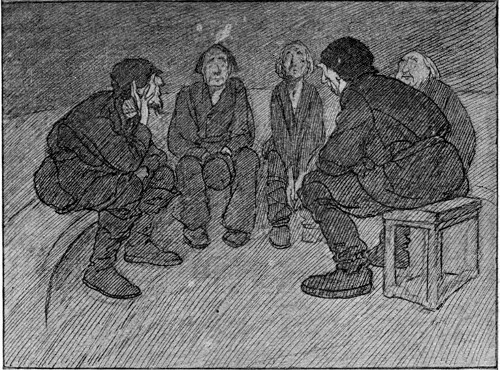 "'HIS BRAIN IS AFFECTED,' SAID THE BLIND DOCTOR."
"'HIS BRAIN IS AFFECTED,' SAID THE BLIND DOCTOR."
"Now, what affects it?"
"Ah!" said old Yacob.
"This," said the doctor, answering his own question. "Those queer things that are called the eyes, and which exist to make an agreeable depression in the face, are diseased, in the case of Nuñez, in such a way as to affect his brain. They are greatly distended, he has eyelashes, and his eyelids move, and consequently his brain is in a state of constant irritation and distraction."
"Yes?" said old Yacob. "Yes?"
"And I think I may say with reasonable certainty that, in order to cure him completely, all that we need to do is a simple and easy surgical operation—namely, to remove these irritant bodies."
"And then he will be sane?"
"Then he will be perfectly sane, and a quite admirable citizen."
"Thank Heaven for science!" said old Yacob, and went forth at once to tell Nuñez of his happy hopes.
But Nuñez's manner of receiving the good news struck him as being cold and disappointing.
"One might think," he said, "from the tone you take that you did not care for my daughter."
It was Medina-saroté who persuaded Nuñez to face the blind surgeons.
"You do not want me," he said, "to lose my gift of sight?"
She shook her head.
"My world is sight."
Her head drooped lower.
"There are the beautiful things, the beautiful little things—the flowers, the lichens amidst the rocks, the light and softness on a piece of fur, the far sky with its drifting down of clouds, the sunsets and the stars. And there is you. For you alone it is good to have sight, to see your sweet, serene face, your kindly lips, your dear, beautiful hands folded together.... It is these eyes of mine you won, these eyes that hold me to you, that these idiots seek. Instead, I must touch you, hear you, and never see you again. I must come under that roof of rock and stone and darkness,[Pg 414] that horrible roof under which your imaginations stoop.... No; you would not have me do that?"
A disagreeable doubt had arisen in him. He stopped and left the thing a question.
"I wish," she said, "sometimes——" She paused.
"Yes?" said he, a little apprehensively.
"I wish sometimes—you would not talk like that."
"Like what?"
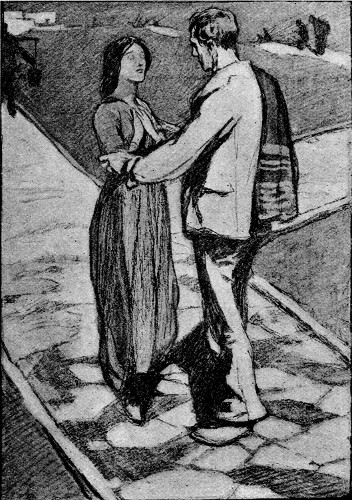 "HE HAD A FEW MINUTES WITH MEDINA-SAROTÉ BEFORE SHE WENT
APART TO SLEEP."
"HE HAD A FEW MINUTES WITH MEDINA-SAROTÉ BEFORE SHE WENT
APART TO SLEEP."
"I know it's pretty—it's your imagination. I love it, but now——"
He felt cold. "Now?" he said, faintly.
She sat quite still.
"You mean—you think—I should be better, better perhaps——"
He was realizing things very swiftly. He felt anger perhaps, anger at the dull course of fate, but also sympathy for her lack of understanding—a sympathy near akin to pity. "Dear," he said, and he could see by her whiteness how tensely her spirit pressed against the things she could not say. He put his arms about her, he kissed her ear, and they sat for a time in silence.
"If I were to consent to this?" he said at last, in a voice that was very gentle.
She flung her arms about him, weeping wildly. "Oh, if you would," she sobbed, "if only you would!"
For a week before the operation that was to raise him from his servitude and inferiority to the level of a blind citizen Nuñez knew nothing of sleep, and all through the warm, sunlit hours, while the others slumbered happily, he sat brooding or wandered aimlessly, trying to bring his mind to bear on his dilemma. He had given his answer, he had given his consent, and still he was not sure. And at last work-time was over, the sun rose in splendour over the golden crests, and his last day of vision began for him. He had a few minutes with Medina-saroté before she went apart to sleep.
"To-morrow," he said, "I shall see no more."
"Dear heart!" she answered, and pressed his hands with all her strength.
"They will hurt you but little," she said; "and you are going through this pain, you are going through it, dear lover, for me.... Dear, if a woman's heart and life can do it, I will repay you. My dearest one, my dearest with the tender voice, I will repay."
He was drenched in pity for himself and her.
He held her in his arms, and pressed his lips to hers and looked on her sweet face for the last time. "Good-bye!" he whispered to that dear sight, "good-bye!"
And then in silence he turned away from her.
She could hear his slow retreating footsteps, and something in the rhythm of them threw her into a passion of weeping.
He walked away.
He had fully meant to go to a lonely place where the meadows were beautiful with white narcissus, and there remain until the hour of his sacrifice should come, but as he walked he lifted up his eyes and saw the morning, the morning like an angel in golden armour, marching down the steeps....[Pg 415]
It seemed to him that before this splendour he and this blind world in the valley, and his love and all, were no more than a pit of sin.
He did not turn aside as he had meant to do, but went on and passed through the wall of the circumference and out upon the rocks, and his eyes were always upon the sunlit ice and snow.
He saw their infinite beauty, and his imagination soared over them to the things beyond he was now to resign for ever!
He thought of that great free world that he was parted from, the world that was his own, and he had a vision of those further slopes, distance beyond distance, with Bogota, a place of multitudinous stirring beauty, a glory by day, a luminous mystery by night, a place of palaces and fountains and statues and white houses, lying beautifully in the middle distance. He thought how for a day or so one might come down through passes drawing ever nearer and nearer to its busy streets and ways. He thought of the river journey, day by day, from great Bogota to the still vaster world beyond, through towns and villages, forest and desert places, the rushing river day by day, until its banks receded and the big steamers came splashing by and one had reached the sea—the limitless sea, with its thousand islands, its thousands of islands, and its ships seen dimly far away in their incessant journeyings round and about that greater world. And there, unpent by mountains, one saw the sky—the sky, not such a disc as one saw it here, but an arch of immeasurable blue, a deep of deeps in which the circling stars were floating....
His eyes began to scrutinize the great curtain of the mountains with a keener inquiry.
For example: if one went so, up that gully and to that chimney there, then one might come out high among those stunted pines that ran round in a sort of shelf and rose still higher and higher as it passed above the gorge. And then? That talus might be managed. Thence perhaps a climb might be found to take him up to the precipice that came below the snow; and if that chimney failed, then another farther to the east might serve his purpose better. And then? Then one would be out upon the amber-lit snow there, and half-way up to the crest of those beautiful desolations. And suppose one had good fortune!
He glanced back at the village, then turned right round and regarded it with folded arms.
He thought of Medina-saroté, and she had become small and remote.
He turned again towards the mountain wall down which the day had come to him.
Then, very circumspectly he began his climb.
When sunset came he was no longer climbing, but he was far and high. His clothes were torn, his limbs were blood-stained, he was bruised in many places, but he lay as if he were at his ease, and there was a smile on his face.
From where he rested the valley seemed as if it were in a pit and nearly a mile below. Already it was dim with haze and shadow, though the mountain summits around him were things of light and fire. The mountain summits around him were things of light and fire, and the little things in the rocks near at hand were drenched with light and beauty, a vein of green mineral piercing the grey, a flash of small crystal here and there, a minute, minutely-beautiful orange lichen close beside his face. There were deep, mysterious shadows in the gorge, blue deepening into purple, and purple into a luminous darkness, and overhead was the illimitable vastness of the sky. But he heeded these things no longer, but lay quite still there, smiling as if he were content now merely to have escaped from the valley of the Blind, in which he had thought to be King. And the glow of the sunset passed, and the night came, and still he lay there, under the cold, clear stars.
It is many a long year since I first began to find delight in wandering through the least-known districts of the capital, in visiting strange quarters inhabited by strange people, in penetrating dim, mysterious regions where thousands of our fellow-citizens live, cut off from the rest of the populace by a network of streets and slums into which it is nobody's business but the inhabitants' to enter, and where a visitor from beyond is rarely seen.
At first my travels were undertaken solely to gratify my own curiosity. Later on, when there came to me an opportunity of exploring with a less selfish end in view, many circumstances combined to give me an insight into the life of the people which I could never have gained as a mere onlooker. So it has come about that to-day I can not only survey the streets of the strange lands in the capital of King Edward, but I can enter the houses and take my notes from the cellar to the roof. I am privileged to sit around the coke fire in lodging-houses where an ordinary stranger would meet with scant courtesy; and the mysteries of "How the Poor Live" are freely unveiled to me. In the vilest of the native quarters, in the queerest of the foreign quarters, I am permitted to spend days and nights, not peeping furtively at the human comedies and tragedies in which the strange men and women are players, but made way for as one entitled to a front place in the local audience.
Of some of the things that I have seen I have written from time to time, but I have always longed for the pencil of the artist to enable the reader to realize what some of the scenes actually mean. And now my wish has been gratified. I have been able to wander off the track in London accompanied by an artist confrère, and to provide him with opportunities for making sketches on the spot.
It is four o'clock on Sunday afternoon as we come out of Aldgate Station and in a few minutes turn into Middlesex Street, littered with paper and straw and rubbish, the remains of the great Sunday morning market, which is at its highest at noon and gradually disappears as the afternoon wears on.
The scene is known to most Londoners, for the fame of Petticoat Lane, as the street was formerly called, has spread through the length and breadth of the land.
But we must pass through it to get off the track in the Ghetto, which has burst its old boundaries and now extends over a large area which until lately was a Christian quarter.
It is not till we come to Wentworth Street that the strangeness of the Sunday scene reveals itself. Here all the shops are open and the narrow thoroughfare is packed with the stalls of Jewish hawkers. We hear a little English at the top of Wentworth Street, but as we push our way through the seething crowd and get nearer to Brick Lane the English words become rarer and rarer, and presently only the German Hebrew jargon known as "Yiddish" reaches our ears.
We are in the heart of the old Ghetto. The alien immigrants, many of them fresh from the Pale of Settlement in Russia and the persecutions of Roumania, are chaffering and bargaining with their co-religionists who have been in London long enough to stock a barrow or a stall and start on the path of financial progress, which may lead their sons, if not themselves, viâ Dalston, Canonbury, Maida Vale, and Bayswater, to Kensington, and perhaps Park Lane.
Stop for a moment and gaze at the crowd. A London child seeing it for the first time would look at the faces and recall the Bible pictures. Everywhere the Oriental type predominates. The old, solemn-looking men—the poorest of the hawkers, for they have come to the Land of Promise too late to struggle out of the ruck—have the beards and features of the Patriarchs. They are calling aloud the price of their poor goods in the lachrymose sing-song of the Eastern pedlar. Pious Jews are these aged immigrants, and if you were to follow them to their synagogue you would see them swaying to and fro as they repeat their prayers in the same mournful, wailing voice with which they cry their wares.[Pg 417]
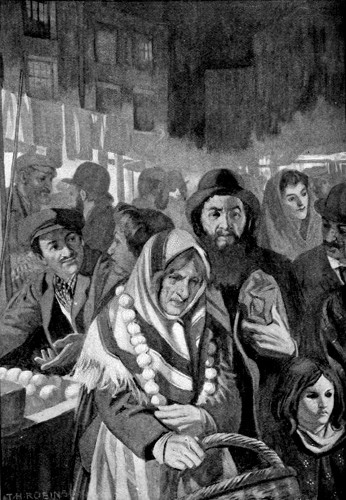 "IN WENTWORTH STREET."
"IN WENTWORTH STREET."
The women are as Eastern as the men. The girls are handsome, dark-haired, dark-eyed daughters of Israel, whose type of beauty has not changed in all the thousand years of persecution and exile.
The younger women are well dressed, with a tendency to brilliant colours and the "Paris fashion" that is displayed in the gay millinery shops of the Ghetto. The children, who have been running in and out of the crowd, are neat and clean, their pinafores are white, their boots are good and well-fitting, their hair is bound with bright ribbons, and their frocks are pretty. The first thought of the poorest alien immigrant is for his children, and his pride is to see them well clad and well cared for.
The middle-aged women and the old women are true daughters of the East. They wear coloured shawls over their heads. There is a curious monotony in the coiffure of the women of the Ghetto who have passed their first youth. The woman of thirty and the woman of seventy seem equally well supplied with a head of glossy black hair. The stranger wonders, as he looks into an old, wrinkled face, at the abundance of black hair surmounting it. If he asks the[Pg 418] reason he will learn that many of the Russian Jewesses cut their own hair off on the day of their marriage and wear a wig for the rest of their lives. To the Oriental the glory of a woman is her hair. The Jewish bride was expected to sacrifice this attraction in order that she should not entice the eyes of men.
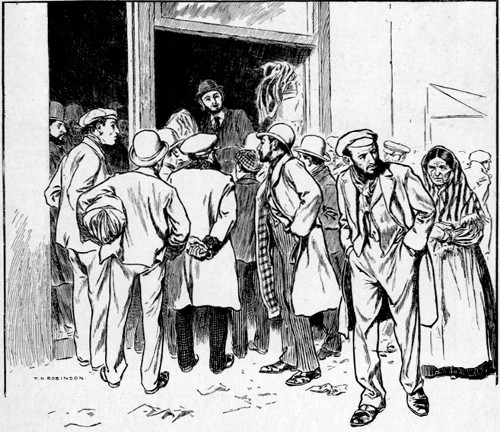 "A CLOTHES AUCTION IN FULL SWING."
"A CLOTHES AUCTION IN FULL SWING."
It is a custom of long ago and the Russian Jewesses adhere to it. Most of the older women came into the Ghetto straight from the ship that landed them in the Thames, and they rarely go beyond its boundaries. Many of them would not if they had the chance.
Here is a clothes auction in full swing. The sombre shop, the front window of which is pushed half-way up, is packed with ready-made suits. The proprietor is selling them to an eager crowd of men, who, when their bid is accepted, take trousers, coats, and waistcoats over their arm and walk away with their purchase. There is a tailor's shop close at hand where twenty cutters and a large number of hands are employed in preparing suits solely for the Sunday sale in this street.
Within a stone's throw of this street is a great Sunday gold and diamond market. During the morning and early afternoon you may see a number of men with little wash-leather bags or velvet-lined cases displaying their glittering merchandise to one another. The jewel mart and exchange is in progress. Many hundreds of pounds' worth of jewels change hands within a few minutes. In Wentworth Street the buyer will haggle and bargain for half an hour over a few pence. In St. James's Place a transaction involving hundreds of pounds is carried out in a minute with scarcely a superfluous word. The business is conducted with perfect good-humour, but the dealers are among the keenest and cleverest men in the City of London.
But we are still only half off the track, for now and again the Gentile sightseer penetrates as far as this.
As we come out from Wentworth Street[Pg 419] into Brick Lane, where there is no market and so no crowd, the long line of open shops and busy warehouses, the hum and bustle of trade and toil in full swing, strike us as peculiar when we remember that it is Sunday. Leaving Brick Lane with its Russian post-office, its Roumanian restaurants, and shop after shop where the young men of the Ghetto take the syrups and temperance drinks that are their principal liquid refreshment, we make our way down Commercial Street and plunge into the new Ghetto, a vast area far more foreign than the old Ghetto, and now entirely given up to the alien immigrant. In the broad main thoroughfare the shops are all open and trade is at its height. The factories are busy, the furniture shops are loading their vans, the shipping agents and bankers are taking money for remittance to relatives abroad who are to leave the Russian Pale and come to the city paved with gold, or booking passages to America and the Colonies for the immigrants who are "moving on."
Here the scene to the unaccustomed Gentile eye is only odd. Directly he turns into the small streets the stranger is filled with absolute astonishment. Many of them are still crowded with dwelling-houses of the poorest class; but where the Gentile dwelt the Jew trades. House after house has been transformed into a shop. Windows have been taken out and living rooms packed with merchandise. Every available corner is used, and one sees the proprietor sitting in a little front room so packed in with rolls of gay-coloured cloths, fancy boxes, and packages that one imagines his only way of getting out must be by a harlequin leap through the window.
You may wander through miles of streets in this quarter and see the same strange sight—the immigrant Jew who has established himself keeping open shop in a dwelling-house all the Sunday through. You may see trade in full tide at eight o'clock in the morning. When midnight has rung out from the churches which still remain as memorials of the vanished Christian population you will still see the shops open and the Rembrandtesque figure of the owner sitting among his wares, waiting for a chance customer. He is perhaps reading a Yiddish paper, printed in Hebrew characters, by the light of a candle, slowly guttering to its last flicker.
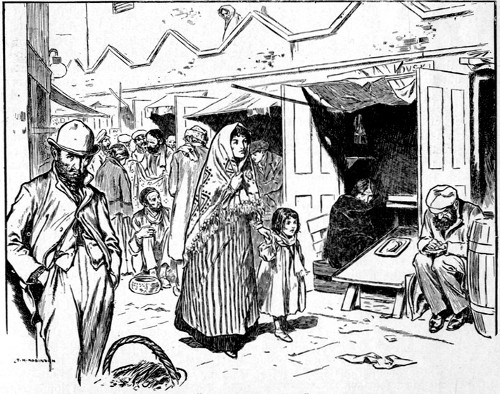 "THE ORIENTAL BAZAAR."
"THE ORIENTAL BAZAAR."
But it is not yet night, though the twilight is falling as we turn into Morgan Street, and[Pg 420] come suddenly upon a page of the old Orient bound up in the book of modern Western life.
Here is a building which is fitly labelled "The Oriental Bazaar." You are in London, but you might be in Cairo or Mogador. The bazaar or "market" is reached from the street by deep flights of steps. It is open to the sky, and beyond it and above it is a street of houses, and a roadway along which flit now and again Eastern women with gay-coloured shawls over their heads.
The "shops" of the market are built in little recesses. In these sit silent Oriental figures—the dealers. Most of the day's business is over. There are only a few loiterers, and the men and women who keep the little shops sit silent and emotionless as the Arabs among their unsold wares. In one shop the stock has been sold out and the proprietor is sitting in the gloom playing cards with a little party of men friends.
It is a picture for Rembrandt. The only light in the arched recess which forms the shop is that of a candle. Round the candle are grouped half-a-dozen dark, weird-looking men, all intent upon the game.
There is one card to be played. Uttering a little guttural cry, the man who holds it brings it down on the counter with a thud. The game the men are playing is one peculiar to these people. It is called Clabber-yas. The last card played, the ninth trump, adds ten points to the score and wins the game.
And at that moment the distant church bells ring out to call the Christian worshippers to evening prayer.
But the Sabbath evening does not find the Jews undevout. The darkness has fallen now, and we make our way back to the crowded streets of the old Ghetto. Here the long lines of lighted shops are now packed with their evening customers, who are buying meat and groceries and selecting furniture, being measured for new suits, trying on smart hats and cloaks of the latest West-end fashion, and examining the pink and blue and yellow silk petticoats which make such a gay show in the brilliantly-lighted windows of the milliners. We turn into a quiet street where the prevailing note is gloom, and, having secured the friendly escort of a Jewish clergyman's son, without whose presence we should hesitate to intrude, we pass through a dark doorway and find ourselves among a group of men whose features and whose occupations would have delighted the heart of Gustave Doré.
In the hall, or ante-room, of the building are shelves packed with ancient-looking volumes—books of Rabbinic lore and law. Gathered together in groups are a number of Jews, young and old, who are standing around a desk at which an aged man with a long grey beard is reading a well-worn volume and explaining certain passages of it to the men who crowd about him and listen intently to his words.
We are in the ante-room of a building which is known as the "Machazeke Hadass V'Shomrei Shabbas"—that is, "The Strengtheners of the Law and Guardians of the Sabbath." It is known officially as "The Spitalfields Great Synagogue." The members of it, almost all alien immigrants, comprise the ultra-orthodox section of the community. They have their own Chief Rabbi, their own Shechita Board (the board that controls the slaughtering of animals), and their own Beth Din (the court of justice). These pious Jews are distinguished by their scrupulous observance of the Sabbath as a day of rest. They will not even carry their handkerchief on the Sabbath day because it constitutes carrying a burden. That is forbidden, so they tie it round their waist as a girdle, where it becomes part of their clothing and so allowable. They will not carry an umbrella on the Sabbath, not only because it is a burden, but also because the putting up of an umbrella is considered equivalent to the erecting of a tent over the head. And they strictly obey the injunction which says neither thou nor thy servant shall do any manner of work on the Sabbath day. For what is absolutely necessary they employ an occasional servant, who is known as the "Shobbos Goy." They never give him a direct order for the performance of a household task, but they sometimes manage to evade the injunction. For instance, if it is bitterly cold and coals are wanted on the fire, they don't say, "Put more coals on." They shiver and rub their hands and say, "It is terribly cold." Then the Shobbos Goy takes the hint and makes the fire up.
Let us linger for a moment among this strange group of devout Jews, few of whom can speak a word of English, though they are likely to pass the rest of their lives in our midst.
The pious old man who is thumbing the book is displaying his Talmudic erudition to his hearers. The synagogue is open night and day, and this ante-room is always filled with reverent and intelligent loungers, who[Pg 421] listen to the exposition of the Talmud and occasionally discuss the affairs of the moment, for the alien Jew has brought with him the old custom of making the synagogue a meeting-place and a club.
In the same room a number of men are swaying to and fro and repeating their prayers in the Oriental fashion. Everywhere there is a note that is a revelation to the Gentile visitor who is privileged to look upon the scene.
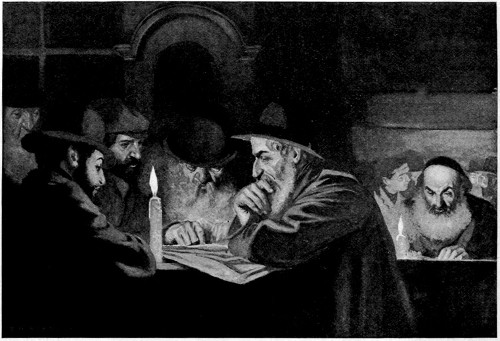 "IN THE SYNAGOGUE."
"IN THE SYNAGOGUE."
The privilege is not easily gained, for these pious Jews, most of them from the lands of persecution and massacre, are still nervous and fearful. They have not yet learned the true meaning of English freedom, and the Alien Commission is to them a warning note of some new disaster that threatens.
Passing from the Talmud school into the synagogue itself, you are startled to find the Royal Arms of England, elaborately carved and coloured, standing out boldly on the walls.
The mystery is solved when we learn that this was originally a Huguenot chapel, owned by the French refugees who settled in Spitalfields after the revocation of the Edict of Nantes. At one time the Huguenots were under special Royal favour, which may account for the display of the Royal Arms in their place of worship. The Jews acquired the building and converted it into a synagogue about ten years ago.
The synagogue is only dimly lighted. Here and there a few worshippers are sitting in the pews repeating their prayers or reading a tattered volume. In one pew sits an old man writing by the aid of a tallow candle, which he has stuck on the little shelf in front of him. He is writing out one of the tiny scrolls which, encased in a capsule of tin or glass, forms the "Mezuzzah," the amulet which every orthodox Jew places on his doors; or perhaps the miniature manuscript is intended to be placed inside the "Tephillin"—that is, the phylacteries which are bound round the head and the left arm for the morning prayers. Remembering that the Mezuzzah and the Tephillin are direct Sinaitic ordinances, we look at the old man writing by the gleam of the candle in the gloomy synagogue with feelings of awe and reverence. Forty centuries ago the injunction was given in the far-off Eastern desert which the Hebrew exile is transcribing to-day in the heart of London.
But, weird and mystic as the scene is, we do not care to linger. Already the uninvited presence of Christian strangers has attracted considerable attention, and the efforts of our[Pg 422] artist to sketch unobserved have brought about us a number of the pious and aged aliens, who consult together in Yiddish and eventually put forward a spokesman, who, in broken English, politely asks us what we want.
We make our explanation and assure the head of the little deputation that we have no evil intent, and then as quickly as is consistent with dignity we make our way through the Talmud room, the readers and expounders and the aged men rocking to and fro in prayer, and pass out into the darkness of the night. On the step an old man stands and looks after us. The pale light coming through the open door falls upon his face and shows a deep scar that looks like a sabre cut. The old man is one of the survivors of the massacre of Kischineff.
And now we are back again in the big trading streets, with the yellow blaze of gas and lamp oil showing up the bright costumes of young Jewesses who are on their way to balls and parties and even to theatrical performances, which are frequent Sunday features of this foreign land which is in London but not of it.
Every now and then through the packed streets dashes a carriage with a spanking pair of greys. Sunday is the day for weddings in the Ghetto. The white ribbon on the whip of the coachman catches the eye again and again, and always a little crowd turns to follow the vehicle and take up its station outside the Hall in which the marriage feast is being celebrated. These wedding carriages are to be seen making their way through the narrow streets in every direction. They are picking up the invited guests at their dwellings. As soon as one load has been deposited at the Hall, off the driver hurries in search of another.
All is merriment within, and all is good temper and good order outside. The crowd blocks the pavement to listen and to make critical remarks on the toilettes of the guests as they arrive. One sharp turn out of the gay, crowded street and the scene is changed. Here everything is gloom, and in the gloom is a little group of slouching men and slatternly women loafing at the doors of dark, forbidding-looking houses.
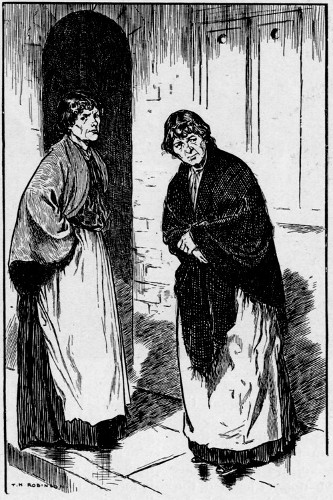 "LOAFING AT THE DOORS OF DARK, FORBIDDING-LOOKING HOUSES."
"LOAFING AT THE DOORS OF DARK, FORBIDDING-LOOKING HOUSES."
We are in a quarter that has been rendered notorious by the revelations of coroners' inquests. This is a little bit of the Ghetto that the Jews have not yet taken from the Christians. It is the street of common lodging-houses where strange murders have been done. We pass quickly by the group of loafing tramps who have come out of the lodging-house kitchens to gossip, and make our way up a narrow, tortuous passage to another street of evil fame, where lodging-houses of the lowest class still remain. Battered wrecks of lost humanity, male and female, flit to and fro in the darkness. A woman pauses under the solitary lamp and we see that her face is bruised and her eyes are blackened. The door of one lodging-house stands ajar and the English tongue salutes our ears once more. It is not a welcome relief, for the sentiment of the words is foul and blasphemous. At the top of the court one comes again upon good buildings and light and a sound of childish merriment.[Pg 423] A number of little Jewish children are dancing a dance of their own in the lamplight.
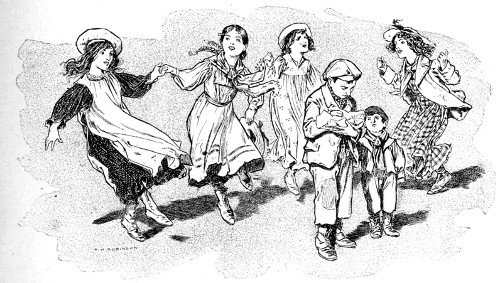 "A NUMBER OF LITTLE JEWISH CHILDREN ARE DANCING."
"A NUMBER OF LITTLE JEWISH CHILDREN ARE DANCING."
We pass out into a broad main thoroughfare, and still the shops are open and doing a brisk business. Here is a little restaurant with its bill of fare in Hebrew characters. We push the door ajar and enter, for we know that it was once the haunt of the Bessarabians, the formidable gang who had a standing vendetta with the Odessians, and who fought them not long ago outside the Yiddish theatre, the fray ending in a man being stabbed to death.
The room we enter is lighted by a single jet of gas. There are only one or two young fellows sitting about and smoking cigarettes. The proprietor in his shirt sleeves stands behind the counter. At the end of the room is an opening covered with heavy curtains. Now and again a man enters, nods to the proprietor, and passes through them.
We have ordered tea, for which we pay a penny a cup. The proprietor brings it himself, looks at us curiously, and I endeavour to allay his suspicion by speaking to him in German. He replies amiably, and I try to engage him in conversation. I ask him if the Bessarabians still use the house.
His manner alters. He has heard of such people, but they never came to his establishment—never. I ask him if there is another restaurant beyond the curtain. Again he looks at me curiously.
No, there is nothing beyond but his own dwelling rooms. I want to get behind those curtains; but I have not the password, and there is no chance. Some day I hope to be more fortunate. For this café was the meeting-place of the Bessarabians, one of the most dangerous gangs in the East-end, and behind those curtains you passed to a room which was a gambling den. There the quarrel took place which led to midnight murder at the corner of the dark street.
We walk quietly away and in five minutes we are back upon the beaten track. Everywhere are closed shops and the calm of the Christian Sunday night. The householders pass on their homeward way. The sweethearts linger for a while before they part at the door, or separate to go each a different way.
And though they are within a few minutes' walk of the strange scenes we have looked upon by turning a little way off the beaten track, most of these people are as ignorant of their existence as was the great French critic who came for the first time to London and was taken to Piccadilly Circus, was told that it was the famous Whitechapel—and believed it.
The following collection of pictures, in each of which the artist has depicted an event in the lives of the great musicians, can open with nothing more suitably than with the charming picture of "The Child Handel," by Margaret Dicksee. Handel's father strongly opposed the child's passionate love for music, and the more his great gifts developed the more severely was he forbidden to occupy himself with music. The little boy was obliged to have recourse to subterfuge, and when his elders believed him snug in bed he used to steal on tip-toe to the lumber-room, where he had discovered an old spinet, on which he played softly to his heart's content, alone and fancy-free. In one of these moments of enjoyment, when the divine genius spoke to the child, he forgot himself and played louder and louder—all the sound of the old spinet streamed through the silent night, waking the sleepers in the house, who believed that the angels were keeping vigil over the old town of Halle. But little George's father bethought himself of the musical propensities of the boy, and, as the latter was not to be found in his bed, the lantern was lit and a search-party followed where the music led them. Alas! Poor George was found, severely reprimanded, and dismissed to bed. The picture brings the scene so vividly before our minds that we are glad to know the sequel. George was not to be suppressed. A short time afterwards his father went to Weissenfels, where, in consequence of the presence of the music-loving Prince, many concerts were to be held. Little George knew this, and, as his father would not let him go, he ran after the coach so long that his parent was compelled to take him in. The Prince heard of the extraordinary child-musician, and, thanks to his intercession, Handel's father at last gave permission that his son should be taught music.
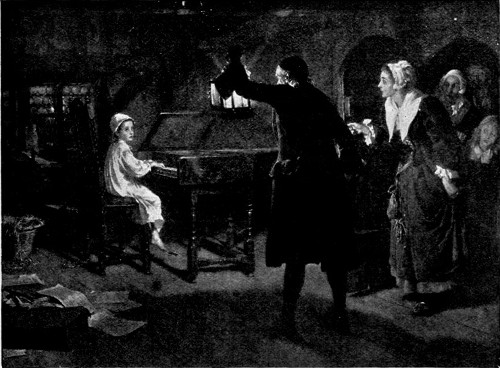 "THE CHILD HANDEL."
"THE CHILD HANDEL."The next picture shows us Sebastian Bach, "the father of all music," playing before Frederick the Great. The painter has chosen the moment when the King is giving Bach a theme on which to improvise. This theme, "a right royal one," as Bach called it, was afterwards worked out by him and sent back to the King, under the name of "A Musical Sacrifice." The King, who was himself a remarkable musician, had shown Bach the greatest appreciation, and this visit to Potsdam seems to have been one of the happiest events in Bach's life. Those who are inclined to regard Frederick, in his musical capacity, as no better than a dilettante flute-player would do well to remember that he was among the first to recognise and to encourage the genius of one of the greatest musicians of all time. Yet Bach's greater works remained in manuscript, and it was left to musicians of a later period—especially to Mendelssohn—to unearth and make them known to the world at large.
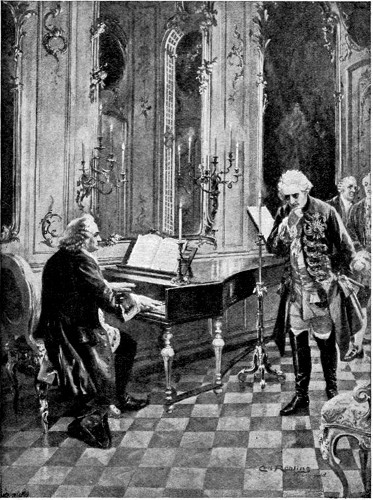 "FREDERICK THE GREAT AND SEBASTIAN BACH."
"FREDERICK THE GREAT AND SEBASTIAN BACH."Another of our master-musicians, Haydn, unlike Bach, who never left his country, came to England, and reached in this country the summit of his renown. In the picture on the next page we see him on board ship. Well wrapped in his great-coat he stands on deck and seems to enjoy the sea-breezes, unconscious of the curiosity of the other passengers. He is wondering what will await him in that strange country across the sea. Will they understand him and the message he has to[Pg 426] deliver to them: harmonies so pure and simple from a heart so kindly and a will so strong? And they did understand him in England; a glorious season of success awaited him. Sympathy met him everywhere, and in such fulness that on returning home to Austria he stopped at the little village of his birth and, kneeling at the threshold of his father's humble cottage, he thanked God for all the happiness which he had known in England.
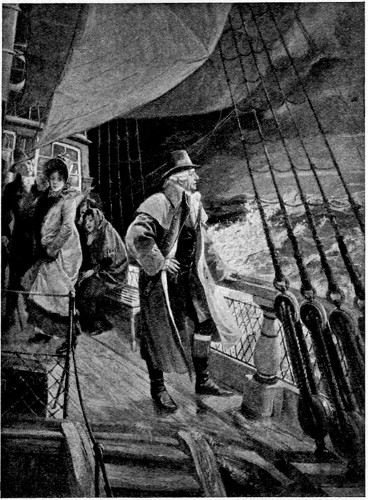 "HAYDN CROSSING TO ENGLAND."
From the Picture by Carl Röhling.
By permission of the Berlin Photographic Company, 133, New Bond Street,
London, W.
Copyright, 1902, by Photographische Gesellschaft.
"HAYDN CROSSING TO ENGLAND."
From the Picture by Carl Röhling.
By permission of the Berlin Photographic Company, 133, New Bond Street,
London, W.
Copyright, 1902, by Photographische Gesellschaft.
In his wake followed another and a brighter star. When Haydn was at the zenith of his success all Germany began to talk of the little infant prodigy, Wolfgang Amadeus Mozart. Our first Mozart picture shows him at the epoch of his life when he first fell in love. While on a visit to an uncle he met his fate in the shape of one of his youthful cousins, Aloysia Weber. The two sisters were pretty; the older, whom in the picture we see lingering in the other room, was full of kindness and sweet unselfishness, always putting forward the younger and more talented sister. Aloysia had a beautiful and well-trained voice, and could read a song at first sight. What was more natural than that the two young people who loved music should learn to love each other? Then came the parting hour. Mozart was compelled to go on one of his extensive tours. Two years passed by before he could return to his[Pg 427] Aloysia. She had, of course, vowed everlasting love; but, alas for the faithlessness, the vanity of woman! Wolfgang came back, faithful and loving as he had left, to find that Aloysia had grown into a very beautiful girl, who had tasted the joys of celebrity as a singer. Success had turned her head and she had nothing to say to the young musician, who was only on the road to make his fame, and she threw away a treasure which she was too ignorant to prize.
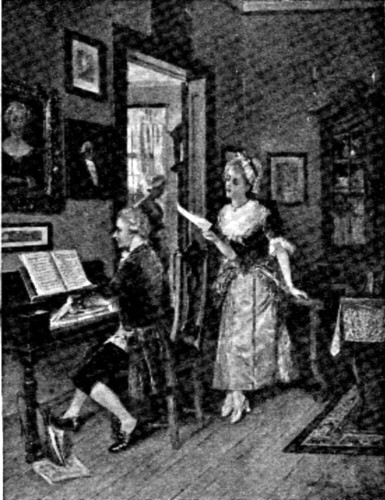 "MOZART AND ALOYSIA WEBER."
"MOZART AND ALOYSIA WEBER."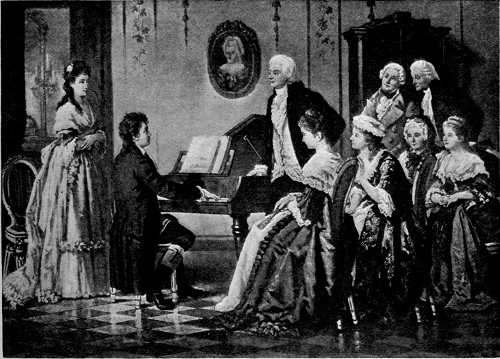 "MOZART AND BEETHOVEN."
"MOZART AND BEETHOVEN."In the next picture we see Mozart again when, at the height of his own fame, he listens to one who was destined to be greater even than himself—the young Beethoven. The young musician of sixteen asked him for a theme on which to improvise. Slowly the genius unfolded his wings; the simple theme seemed to grow to a mighty phrase, which was taken up by other voices as the harmony swelled under the fingers of the player who was destined to show the coming generations the power of music at its greatest. Mozart listened more and more attentively, his eyes fixed upon the young musician, his face wearing an[Pg 428] almost reverential look under the spell of celestial inspiration, which came now like the rushing of a mighty wind. The music still went on. Beethoven had forgotten that he was not alone; but Mozart turned to his friends. "Listen!" he said. "And remember, of this young man the whole world will speak."
Kaulbach, in his painting, "Mozart's Requiem," has immortalized the moment when fate cut short the life of Mozart. The fire of his genius, the never-ceasing, burning desire to embody the immortal inspirations which floated so richly in his brain, had "fretted the pigmy body to decay." Ill and depressed he was leaning back in his chair, when a stranger was announced, who asked him to compose a Requiem as full of dignity and beauty as his genius could conceive, a work which should be without an equal. He laid down a roll of a thousand ducats on Mozart's table and went away without disclosing his name, saying only that he would call again. Then the master collected his last strength, and a sublime effort resulted in the unique work, before which the world still stands in awe and reverence. He felt from the first moment that he was writing his own Requiem.
The work was finished and now he wished to hear it. Too weak to stir from his room, he summoned his friends to perform the Requiem before him. They came and he listened, still and happy, to those mighty strains of sadness; and, so listening, his own soul flew to Heaven. This is the scene of Kaulbach's picture.
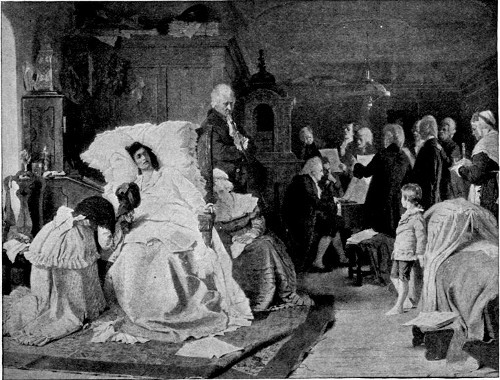 "THE LAST HOUR OF MOZART."
"THE LAST HOUR OF MOZART."The well-known and well-beloved "Moonlight Sonata," whose power and beauty will delight for ages, is the subject of the very pretty story depicted on the next page. It is said that Beethoven passed, in the course of one of his rambling walks, a lonely street in the suburbs of Vienna, and heard from an open window the strains of his own music. The music came from a room on the ground floor, and when he approached he saw a young girl sitting at the piano and a child listening to her, huddled up on a chair near by. Impulsive as he was, he at once entered, saying, "I know that piece. What makes you play it? Does it please you?" "I love all Beethoven's compositions,"[Pg 429] said the young girl in a sweet, quiet voice, without showing any surprise at being thus interrupted by a stranger. But the child came quickly towards him, saying, "My sister is blind, and music is her only joy. What is it you want, sir?" With that peculiar directness which was so characteristic of his nature, he simply said, "I wish to play to you. I am Beethoven." Then the two girls settled themselves joyfully to listen. The moon had risen, the street was silent, the tears glistened in the blind eyes of the elder girl—and then came the wonderful mysterious song of that Adagio in C sharp minor, which rose and fell and soared again to Heaven. Such revelation of human feeling strained the nerves of these two young beings almost beyond endurance. A slight pause, and the graces of the Minuet played around them, soothed them, brushed the tears away, and spoke of life and youth and gladness. And then it sang on—another rushing storm—and melody after melody followed, and wildest outbreak of the Titan's own rugged nature, and then it cleared up into majestic strength—imposing chords of greatness—then silence. Beethoven turned and went as he had come, and long after he gave to the world what he saw and felt before these two lonely children.
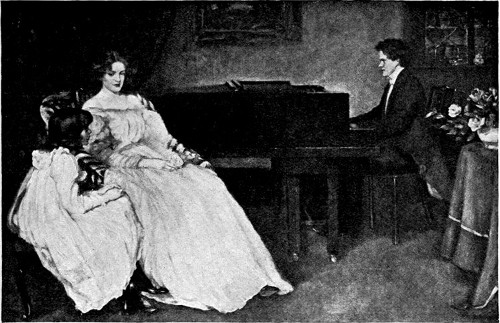 "THE MOONLIGHT SONATA."
"THE MOONLIGHT SONATA."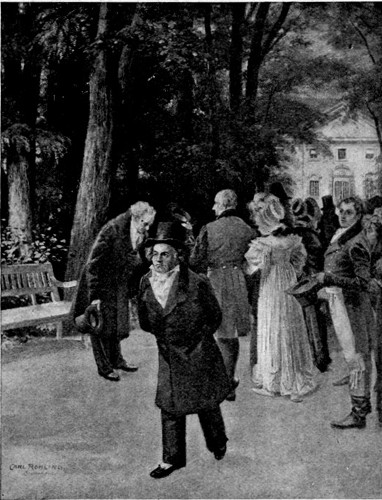 "BEETHOVEN AND GOETHE IN TEPLITZ."
"BEETHOVEN AND GOETHE IN TEPLITZ."The picture entitled "Beethoven and Goethe in Teplitz" illustrates an episode which shows Beethoven in the company of Germany's greatest poet, for whom he had an enthusiastic admiration. Beethoven's was a proud nature, and he sometimes showed his pride in a manner which had nothing in common with the smooth and polished manners of the aristocratic society in which he and Goethe were wont to move.
Beethoven and Goethe met at Teplitz, a Bohemian watering-place much frequented by Royalties and aristocratic society. They were walking together, when the Emperor and Empress and their suite came towards them. Goethe, standing still, hat in hand, bowed almost to the ground, as it is customary on the Continent. Beethoven pressed his hat tighter on his head, let go Goethe's arm, and tried to elbow his way through the crowd; but the Empress had seen him and greeted him smilingly as she passed on, whilst Goethe received only the courtesy accorded to every unknown person. This is the moment shown us by the artist. The expression of surprise in the faces of the Royal visitors at Goethe's obsequious politeness, the indulgent smiles which follow the irate Beethoven, are very amusing.
Franz Schubert is the creator of the German "Lied." He was the first who gave this kind of music a deeper meaning and a more elevated form, and, guided by his dramatic instinct, produced such masterpieces as the "Erlking" and the "Müller-lieder." The singer is surprised to find most of these songs written in a very high key, and before somebody had taken the trouble to transpose them this was, even in Germany, a drawback to their popularity. The reason was as follows. One of Schubert's best friends was a very popular singer in Vienna, and his tenor voice was of an exceptional compass. Schubert wrote most of his songs for him. The painter has had the happy idea of giving us a portrait of this man in the act of singing, while Schubert himself is playing the accompaniment. The young lady who stands at the other side of the piano is probably the girl of whom Schubert said: "I loved once a girl, she was not beautiful—but, oh, so kind-hearted, good, and loving! And she sang my songs with a most beautiful soprano voice. We loved each other for three years, and we were happy. Then I had to give her up. I could never succeed in getting a post which would have enabled me to marry. I had no right to prevent her from marrying a man who could give her a home and make her happy." It is sad that a man whom we acknowledge as one of the greatest of musicians should be compelled to give up every thought of the happiness which comes to even the simplest worker in another field.
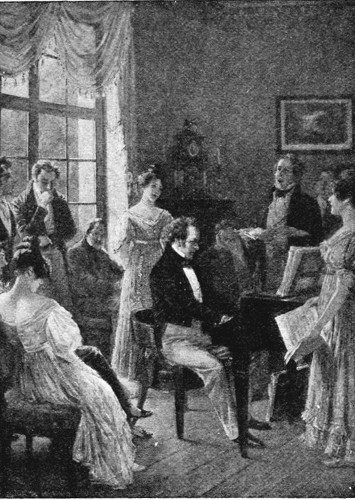 "SCHUBERT AND HIS FRIENDS."
"SCHUBERT AND HIS FRIENDS."The next painting illustrates a romantic [Pg 431]episode of Schumann's life. In 1836 Robena Laidlaw, though only sixteen, was Court pianist of the Queen of Hanover, and her fame had already spread over Germany, England, and Russia. She played his music for him, followed his inspirations, and rejoiced at the flights of his genius. They had tasted to the full the delight of understanding each other in the beautiful language of music.
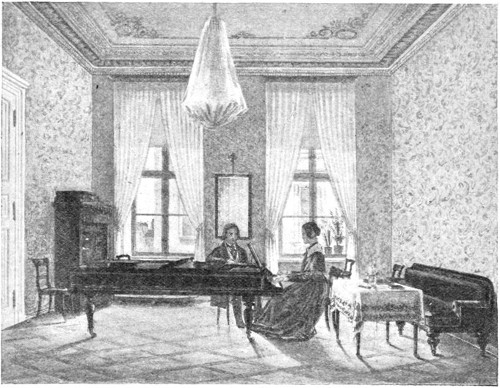 "SCHUMANN AND ROBENA LAIDLAW."
"SCHUMANN AND ROBENA LAIDLAW."One day they were wandering in the Rosenau—the rose-gardens of Leipzig. The time of parting had come. His life and hers were unsettled and full of plans and ambitions. She was to start for Paris the next day, and to go from there to Russia to play before the Czar and the Imperial Court. Did they realize their own feelings at the moment, or know how much akin such friendship is to love?
He arranged the cushions around her in the little boat upon the lake and bade her wait for him; he would bring her a rose as a parting gift. She had long to wait, and when he came at last he said, with that melancholy expression which, even in his younger years, was already his: "I searched so long and could after all only find a rose which is not worthy of you. But I will send you a remembrance of the Rosenau."
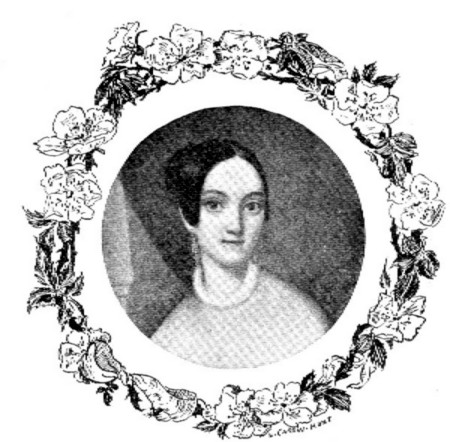 ROBENA LAIDLAW.
ROBENA LAIDLAW.Surfeited with the triumphs which fall naturally to the share of a great artiste and a beautiful girl, Robena found, on returning from a State concert at St. Petersburg, among many costly gifts of jewels and flowers which awaited her, a simple roll of music with the German postmark. It contained the twelve Phantasiestücke which are now reckoned among the most poetical and beautiful of Schumann's works. He wrote: "I have not asked, before sending[Pg 432] them to the printer's, your permission to dedicate these pieces to you. They are yours, and I hope you will accept them. The whole Rosenau with all its romance is in them. Forget me not, and send me your portrait soon, as you promised."
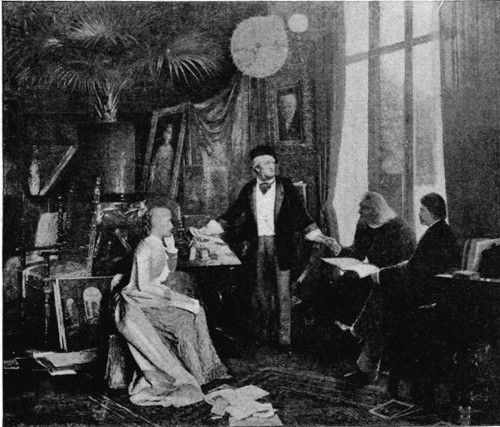 "WAGNER IN HIS HOME AT WAHNFRIED."
"WAGNER IN HIS HOME AT WAHNFRIED."Wasielewski tells in his "Schumanniana" that he heard him once, shortly before his last illness, playing in the twilight, as he loved to do. Melodies full of tender beauty floated around; the exquisite piece "des Abends," the first of the Phantasiestücke; then reminiscences of "des Nachts," wild and desperate, as if haunted by loneliness and terror; and then again the sweet and tender song of the evening's silent longing. The listener outside the door felt his heart nearly burst with emotion, but Schumann shut the piano immediately when the door was opened, and no allusion to what had passed was possible. Had he returned in this lonely moment to the memories of youth? Was it a last and loving greeting to the past?
The great composer who gave so much to the world is long laid to rest in the cemetery of Bonn, and the waves of the Rhine sing his eternal slumber-song, but the Phantasiestücke will live on, and sing of the romance which was never told in words.
Robena Laidlaw died only two years ago in London. Among the many souvenirs of this brilliant artiste's career was found a withered rose, and written by her on a leaflet: "Schumann gave me this rose at the Rosenau, 1836."
Beckmann's picture represents the last of the epoch-making musicians, Richard Wagner. We see him discussing "Parsifal," his last and grandest work, with his wife and his two faithful friends, Liszt and Hans von Wolzogen. Wagner was then already living in his own beautiful home in Bayreuth, surrounded by the luxuries he so dearly loved, having as companion the woman who understood him best. His battle had been hard, but his ultimate conquest was decisive, and we may feel contented in the hope that culture is in our days so widespread and advanced that genius is but rarely exposed to pay with a life of misery for the halo of its greatness.

If anyone cares to look up the Patriarch in Lloyd's List it will be discovered that the owner of her was T. Tyser, but it matters very little whether she was built of heavier plating than the rules required, or whether she was cemented or built under special survey or what not. For T. Tyser, otherwise Mr. Thomas Tyser, was not only the owner of the Patriarch, but also the owner of a dozen other vessels all beginning with a "P." He was, moreover, the owner of a large block of land in the heart of Melbourne; he had several streets, of which the biggest was Tyser Street, S.E., in London, and his banking account was certainly of heavier metal than he had any personal use for. He was a rough dog from the north country, and in the course of half a century's fight in London he came out top dog in his own line and was more or less of a millionaire.
"And he's my uncle," said Geordie Potts; "his sister was my mother, and here I am before the stick in one of his old wind-jammers and gettin' two-pun-ten in this here Patriarch of his, and hang me if I believe the old bloke has another relation in the world. It's hard lines, mates—it's hard lines. Don't you allow it's hard lines?"
It was Sunday morning in the south-east trades, and every sail was drawing "like a bally droring-master," as Geordie once said, and the "crowd" of the Patriarch were all fairly easy in their minds and ready for a discussion.
"If so be you are 'is nevvy, as you state," said the port watch, cautiously, "we allow it's hard lines."
"I've stated it frequent," said Geordie, "and it's the truth, the whole truth, and nothin' but it, so help me. D'ye think I'd claim to be old Tyser's sister's son if I wasn't? I'd scorn to claim it."
"Any man would scorn to be Tyser's sister's son," said the starboard watch. "He'd scorn to be 'im unless he was, for Tyser's a mean old dog, ain't he, Geordie?"
Geordie thanked his watch-mates for backing him up so.
"That's right, chaps. There's no meaner in the north of England—or the south, for that matter—and the way this ship's found is scandalous."
"The grub's horrid," said both watches.
"And look at the gear," said Geordie; "everything ready to part a deal easier than my uncle is. I never lays hold of a halliard but I'm thinking I'll go on my back if I pulls heavy. Oh, it's a fair scandal!"[Pg 434]
He considered the scandal soberly and with some sadness.
"He might leave you some dibs, Geordie," suggested his mate, Jack Braby. "He might, after all."
"Not a solitary dime," said Geordie. "Him and me quarrelled because my father fought him in the street, and I hit the old hunks with a bit of a brick because he got my dad down."
"Wot was the row about?" asked the others, eagerly.
"Nothin' to speak of," said Geordie. "My old man said he was a bloodsucker, and that led to words. And I never hurt him to speak of. And yet I've shipped in one of his ships, and am as poor as he's rich. He allowed none of us would get a farthing; he shouted it out in the market-place and said hospitals would get it, because one of his skippers that he'd sacked cut him up awful with a staysail hank, and they sewed him very neat at one of 'em."
"There's nothin' so good in a fight as a staysail 'ank," said Jack Braby, contemplatively. "I cut a policeman all to rags wiv one once."
"Was that the time you done three months' 'ard?" asked the port watch.
"Six," said Braby, proudly; "and I told the beak I could do it on my 'ead. But, Geordie, if you was owner yourself what would you do?"
"Yes, wot?" asked the rest.
Geordie shook his head and sighed.
"I'd make my ships such that sailormen would be wantin' to pay to go in 'em," said Geordie. "I've laid awake thinkin' of it."
"Oh, tell us," said all hands, with as much unanimity as if they were tailing on to the halliards under the stimulus of "Give us some time to blow the man down." "Tell us, Geordie."
"I'd be friends with all my men, for one thing," said Geordie, "and I'd not have a single Dutchman in a ship of mine."
The three "Dutchmen" on board, one of whom was a Swede, another a German, and the third a Finn, shifted uneasily on their chests, but said nothing.
"And not a Dago," continued the "owner," "and I'd give double wages and grog three times a day and tobacco thrown in. And the cook shouldn't be a hash-spoiler, but what Frenchies call a chef."
"We never heard of that. How d'ye spell it, Geordie?"
"S—H—E—double F," said Geordie; "and it means a man that is known not to spoil vittles, as most sea-cooks does, by the very look of him. And when it was wet or cold the galley fire should be alight all night. And the skipper and the mates should be told by me, and told very stern, that if they vallied their billets a continental they'd behave like gents and not cuss too much. And there shouldn't be no 'working up,' and any officer of mine that was dead on 'dry pulls' on the halliards should have the sack quick. And every time a ship of mine came into dock I'd be there, and I'd see what the crowd's opinion was of the skipper and the mates. Oh, I'd make my ship a Paradise, I would!"
Most of the men nodded approval, but Braby wasn't quite satisfied.
"And would there be grog every time of shortenin' sail, Geordie?"
"Oh, of course," said Geordie, "and every time you made sail too."
But an old seaman shook his head.
"'Tis mighty fine, mates, to 'ear Geordie guff as to what 'e'd do," he growled, "but I ain't young and I've seed men get rich, and they wasn't in the least what they allowed they'd be. Geordie 'ere is one of hus now, and 'e feels where the shoe pinches; but if so be 'e got rotten with money 'e'd be for calling sailormen swine as like as not. And 'e'd wear a topper."
"You're a liar; I wouldn't," roared Geordie.
"Maybe I am a liar," said the old chap, "but I've seen what I've looked at. If you was to learn as your uncle was dead now, you'd go aft and set about on the poop and see hus doin' pulley-hauley, with a seegar in your teeth. Riches spoils a man, and it can't be helped; it 'as to, somehow. I've no fault to find with you now, Geordie Potts; for so young a man you're a good seaman and a good shipmate (though you 'ave called me a liar), but you take my word for it, money would make an 'og of you."
And here was matter for high debate which lasted all through the trades, through the horse latitudes, and into the region of the brave west winds till the Patriarch had made more than half her casting.
"So I'm to be a mean swab and a real swine when I'm rich," said Geordie. "Oh, well, have it your own way. There's times some of you makes me feel I'd like to make you sit up."
"'Ear, 'ear," said the old fo'c's'le man; "there's the very 'aughty richness workin' in his mind, shipmates. What'll the real thing do if 'is huncle pegs out sudden?"[Pg 435]
It was curious to note that a certain subdued hostility rose up between most of the men and Geordie. They sat apart and discussed him. Even Jack Braby threw out dark and melancholy hints that they wouldn't be chums any more if old Tyser's money came to his nephew. There were at times faint suggestions that Geordie was getting touched with his possible prosperity.
"I'll live ashore and have a public-house," said Geordie Potts.
And they picked up Cape Otway light in due time, and ran through Port Phillip Heads by-and-by, and came to an anchor off Sandridge. Presently they berthed alongside the pier and began to discharge their cargo; and one hot day went by like another, till they were empty and began to fill up again with wool. In six weeks they were almost ready for sea once more. And the very night before they hauled out from their berth and lay at anchor in the bay, Geordie went ashore at six o'clock "all by his lonesome," as he and Jack Braby had fought over the job which Braby was to get from his mate when old Tyser died intestate. And as he got to the end of the pier he met a young clerk from the agent's office who knew him by sight.
"I say, I'm in a great hurry," said the boy; "my girl's waiting for me. Will you take these letters to Captain Smith, or I'll miss my train back? I'll give you a bob."
"Righto!" said Geordie; and he pouched the shilling and the letters, and the young fellow ran for his train.
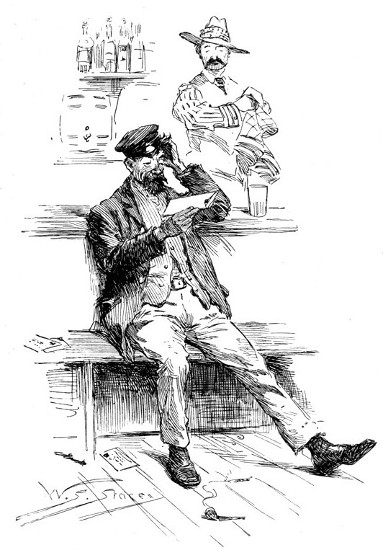 "'JERUSH,' SAID GEORDIE, 'THIS CAN'T BE ME!'"
"'JERUSH,' SAID GEORDIE, 'THIS CAN'T BE ME!'"
"The letters can wait," said Geordie Potts, "but the bob can't, and I've five more besides. Jack might have had his whack out of it if he hadn't wanted to be my manager when he ain't fit for it."
He put the letters into his pocket and made his way to the Sandridge Arms, where he sat and drank by himself. It was seven o'clock, and he was by then tolerably "full," before it occurred to him to see if he still had the letters. He took them out, and the very first his eyes lighted on was one in a long envelope addressed to
"Jerush," said Geordie, "this can't be me! 'Esq.' is what they puts after names of gents. Even the skipper don't have it after his."
He fingered the long envelope and took another drink to consider the matter on.
"Snakes! it must be me," he said, as he drew confidence out of his glass; "there's no other Potts but me."
He was over-full by now, and he opened the letter and began to read it:—
"My Dear Sir——"
"By all that's living," said Geordie, "me 'my dear sir'!"
He went on reading:—
"My Dear Sir,—We regret to inform you of the sudden death of your uncle, Mr. Thomas Tyser, on the 10th instant. He left no will, and you, as the next of kin and heir-at-law, are entitled to all his real and personal estate, which is, as you are doubtless aware, very large.[Pg 436] According to our present estimate it will amount to at least half a million sterling, and as we have been his legal advisers for the last twenty years and know all his affairs we can assure you that with proper management of certain undertakings at present in our hands, it may be much more than our estimate. In order that you may return at once we enclose you a draft on the Union Bank of Australia for two hundred pounds, and have instructed Captain Smith to give you your discharge, which he will, of course, do at once.
"We hope, as we have been so long in the confidence of Mr. Tyser, that you will see no reason to complain of our care of your interests.
"My stars!" said Geordie. And he stared aghast at a square piece of paper, which he had reason to believe represented two hundred pounds. "My stars! what a pot o' money!"
He gasped and took another drink.
"I'm the owner of the Patriarch," he said, and grasping all the letters and his two-hundred-pound draft he rammed them down into the bottom of his inside breast-pocket. "I'm the owner of—hic—the—hic—Patriarch."
He came out of his corner and went to the bar.
"Gimme a drink—an expensive drink, one that'll cost five bob," he demanded of the barman.
"You'd better have a bottle o' brandy," said the barman.
"I wants the best."
"This is Hennessy's forty star brandy," said the liar behind the bar. "There's no better in the world."
And Geordie retreated with the bottle to his corner and took a long drink of a poisonous compound which contained as much insanity in it as a small lunatic asylum. He came back to the bar presently and told the barman that he was a millionaire.
"I own half Newcastle and a lot of Bourke Street, Melbourne, and a baker's dozen of ships, and lumps of London!" said Geordie.
"Lend me a thousand pounds till to-morrow," said the barman.
"I like you—hic—I'll do it," said Geordie, and with that he fell headlong and forgot his wealth. They dragged him outside on the veranda and let him lie in the cool of the evening. He was picked up there two hours later by Jack Braby and some of the starboard watch and taken on board.
"He let on he was a millionaire," said the barman, contemptuously.
Braby shook his head.
"Ah, he's liable to allow that when he's full, sir," said Braby.
But that fatal bottle kept Geordie Potts wholly insensible till they were outside the Heads again and on their way to England, with the smoke of the tug-boat far astern. And presently the second mate, Mr. Brose, who was a very rough sort of dog, and had sweated his way up to his present exalted rank from that of a foremast hand, hauled Geordie out by the collar of his coat, and had him brought to by means of a bucketful of nice Bass's Straits water. Geordie gasped like a dying dolphin, but came to rapidly.
"I'll teach you to get drunk, you swab," said Brose. "Take them wet things off and turn to."
And Geordie obeyed like a child in the presence of force majeure.
"Oh, I've got a head," he told his mates, "and it seems to me that I had a most extraordinary dream."
"Wot did you dream of, old Cocklywax?" asked Braby; "did you dream you'd come in for old Tyser's money?"
And Geordie gasped.
"S'help me," he murmured. "S'help me, did I dream?"
He dropped his marline-spike as if it were red hot and made a break for the fo'c's'le and his wet coat.
"Now if so be I dreamed," he said, "there'll be naught in this pocket. And if I didn't, I'm jiggered."
He put his hand in and brought out a handful of damp and crushed letters, and came out upon deck staggering. Mr. Brose saw him, and was on his tracks like a fish-hawk on a herring-gull. Geordie saw him coming and stood open-mouthed.
"Oh, sir," said Geordie. "Oh, sir——"
"Oh, rot," said Brose; "what's your little shenanakin game? Get to work, or I'll have you soused till you're half dead."
But Geordie could explain nothing.
"Oh, sir," he stammered, and held up his papers, shaking them feebly. And Brose shook him, anything but feebly, so that Geordie's teeth chattered.
"If you please, sir," he cried out at last, "if you please, sir, don't. I owns her."
"You owns wot?" demanded Brose; and the rest of the men edged as near as they dared.[Pg 437]
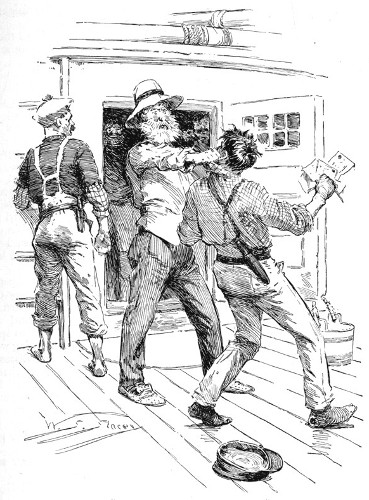 "BROSE SHOOK HIS MATE ONCE MORE."
"BROSE SHOOK HIS MATE ONCE MORE."
"He's drunk still," said Braby, as Brose shook his mate once more.
"I owns the bally Patriarch," screamed Geordie, "and all the rest of 'em, and all my uncle's richness, and I won't be shook, I won't!"
And Brose let him go.
"You're mad," said Brose, "you're mad."
"I ain't," roared Geordie, who was fast recovering from the shock, "I ain't. Take these; read 'em—read 'em out; let the skipper read 'em. I owns the Patriarch and the Palermo and the Proosian and the whole line. The lawyer says so!"
He put the lot of damp letters into Mr. Brose's hands and sat down on the spare top-mast lashed under the rail.
"There's letters for the captain 'ere," said Brose, suspiciously; "'ow did you get 'em?"
"'Twas a youngster from the office give 'em me," replied Geordie, "and I took a drink first, and there was one for me, and it said so—said I was the owner, said it plain."
And when Brose had read the opened letter he gasped too and went aft to see the skipper. The rest of the watch gathered round Geordie and spoke in awe-struck whispers.
"Is it true, Geordie?"
"Gospel," said Geordie. "It's swore to. They sends me two hundred quid in a paper."
"Show us," said the starbowlines, "show us."
"'Tis in the paper the second has," said Geordie. "It's wrote, 'Pay George Potts, Esq., two hundred quid on the nail.'"
"I'd never 'ave let the second 'ave it," said Braby. "Like as not 'e'll keep it."[Pg 438]
"Then I'll sack him," said Geordie, firmly. "Let him dare try to keep it, and I'll sack him and not pay him no wages."
"This is a very strange game, this is," said Braby. "I never 'eard tell of the likes. Did they put 'Esk' on your letter?"
"They done so," said Geordie. "I've seen uncle's letters and they done so to him."
"Then it must be true," said Braby. "They only puts 'Esk' on gents' letters."
And Williams, the steward, was observed coming for'ard scratching his head.
"Where the deuce am I?" asked Williams, "and wot's the game? I'm sent by the captain to say, 'Will Mr. Potts step into the cabin?'"
They all looked at Geordie.
"Mr. Potts? Why, that's you, Geordie."
"I s'pose it must be," said the owner. "Must I go, mates?"
"Of course," cried Braby.
But Geordie fidgeted.
"I could go in if we were painting of her cabin," he murmured; "but to talk with the skipper——"
That evidently disgruntled him.
"'Tis your own cabin any'ow," said Braby. "I'd walk in like a lord."
"Well, I s'pose I must," said Geordie, reluctantly, and he went aft with Williams.
"And you're the owner?" asked Williams.
Geordie sighed.
"So it seems, stooard," he admitted.
"It licks creation," said Williams.
"So it does," said Geordie, and the next moment he found himself announced as "Mr. Potts," and he stood before the captain with his cap in his hand, looking as if he was about to be put in irons for mutiny; but, as a matter of fact, the old skipper was a deal more nervous than he was.
"This seems all correct, Mr. Potts," said Smith.
"Does it, sir?" asked Geordie. "I'm very sorry, sir, but it ain't my fault, sir. I never meant—at least, I never allowed my uncle would do it, because my father, sir, said he was a bloodsucker, and they fought, and I hit uncle with a brick, sir, to make him let go of father's beard."
"Oh, yes, to be sure," said the captain, nervously, "but I'm thinking what to do. It's a very anomalous situation for you to be here, Potts—Mr. Potts, I mean."
But Geordie held up his hand.
"I'd much rather be Potts, sir, thanking you all the same."
"I couldn't do it," replied the skipper. "I was thinking that you might like me to put back to Melbourne?"
"Wot for, sir?" demanded the owner.
"So that you could go home in a P. and O. boat," said old Smith.
"Thanking you kindly, sir," replied Geordie, "I'd rather stay in the Patriarch. I don't like steamers and never did."
He had a vague notion that the skipper wanted him to go home before the mast in one.
"Then you wish me not to put back, Mr. Potts?" said Smith.
"I'd very much rather not, sir," replied Geordie. "I'm very happy here, sir, and takin' it all round the Patriarch's a comfortable ship, sir. May I go for'ard now, sir?"
He made a step for the cabin door.
"Oh, dear, oh, dear," said old Smith, "you mustn't; you must have a berth here and be a passenger."
The skipper's obvious nervousness was not without its effect upon the new owner. For old Smith knew that if he lost his present billet he was not likely to find another one, and he had nothing saved to speak of. So somehow, and without knowing why, Geordie, without being in the least disrespectful, was more decided in his answer than he would have been if the "old man" had showed himself as hard and severe as usual.
"Not me," said Geordie, "not me, sir; I wouldn't and I couldn't. I'd be that uncomfortable—oh, a passenger, good evings, no!"
"But bein' owner you can't stay for'ard," urged the skipper.
"Oh, yes, I can, sir," said Geordie; "I'd prefer it."
Smith sighed.
"If you prefer it, of course you must. But if you change your mind you'll let me know."
"Right—I will, sir," said Geordie.
The skipper walked with him to the cabin door.
"And if you don't want to work, Mr. Potts, I dare say we can get on without your services, though we shall miss them," he said, anxiously.
"I couldn't lie about and do nix," replied Geordie. "I'd die of it."
And away he went for'ard, while the skipper and Mr. Brose and Mr. Ware, waked out of his watch below to hear the extraordinary news, discussed the situation.
"And 'ave I to call 'im Mr. Potts?" asked Brose, with a pathetic air of disgust.
"I say so," replied the skipper. "I can't[Pg 439] afford, Brose, as you know, to lose this job. And old Tyser promised me a kind of marine superintendent's billet when I left the Patriarch, and I dessay this young chap will act decent about it."
"I'm fair knocked," replied Ware. "I'm jolly glad that he ain't in my watch. This is hard lines on you, Brose."
"If you please, Mr. Potts, will you be so good has to be so kind has to be so hobliging as to go and over'aul the gear on the main," piped Brose, in furious mockery, "Oh, this is 'ard!"
"Far from it," said old Smith; "you ought to be proud. It ain't every second mate has a millionaire owner in his watch."
But Brose was sullen.
"You mark me, this josser won't do no 'and's turn that 'e don't like."
And for'ard the crowd said the same. As a result, for at least ten days Geordie Potts worked very well indeed. But, of course, Brose, under the skipper's orders, gave him all the soft jobs that were going. The second mate got into a mode of exaggerated courtesy which was almost painful.
"Be so good, Mr. Potts, as to put a nice, neat Matthew Walker on this 'ere lanyard."
Or—
"Mr. Potts, please be kind enough to go aloft and stop that spilling line to the jack-stay."
And at meal times the port watch mimicked Brose.
"Dear Mr. Potts, howner, be so good as to heat this 'orrid 'ash without growling."
And presently, when the weather began to get cold and the men brought out their Cape Horn pea-jackets and their mitts, Geordie commenced to growl a little.
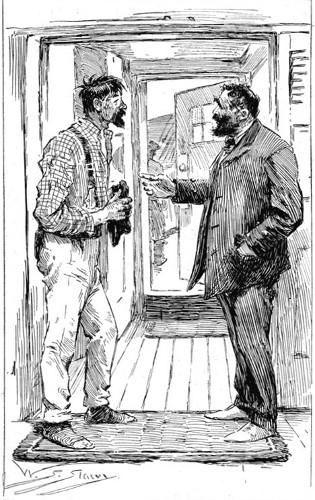 "'IF YOU DON'T WANT TO WORK, MR. POTTS, I DARESAY WE CAN GET
ON WITHOUT YOUR SERVICES,' HE SAID."
"'IF YOU DON'T WANT TO WORK, MR. POTTS, I DARESAY WE CAN GET
ON WITHOUT YOUR SERVICES,' HE SAID."
"I hates turnin' out in the gravy-eye watch worse and worse," he said. "I've half a mind to let on I'm sick."
"You'd better go haft and tell the old man to 'ave the galley fire kep' alight all night," said the crowd, crossly. "But you dasn't."
"I dast," said Geordie; "why, I owns the bally galley!"
"You dasn't!"
"I will," said Geordie. And next morning he went aft and touched his cap to the skipper and begged to be allowed to speak to him.
"The galley fire at night?" said Smith. "Oh, certainly, Mr. Potts. I never done it because it was against the horders of your late revered huncle, sir."
"He was as mean as mean," said Geordie; "I think I can afford the fire, sir."
The fire was lighted and the crowd said Geordie was the right sort.
"And wot about the gear, Mr. Howner?" asked Jack Braby. "If I was you, before it gets too rotten cold I'd 'ave a real over'aulin' of things."
"I'll think of it," said Geordie. And that very afternoon he tackled Brose.
"The gear's tolerable rotten, sir," he began. And the second greaser knew he was right and yet didn't like to say so. He yearned to curse him. "And I'm thinkin'," said Geordie, "it would be a good thing to get up new stuff and overhaul everything. I risks my life every time I goes aloft. The very reef earings would part if a schoolgirl yanked at 'em."[Pg 440]
"You'd better speak to Mr. Ware," said Brose, choking.
And at eight bells Geordie spoke to the chief officer, who was quite as anxious as the skipper to keep his billet.
"It shall be done, Mr. Potts," said Ware.
In the first watch that night Geordie felt very tired, and said so. When it was eight bells in the middle watch he was still asleep, or pretended to be.
"Rouse out, howner," said Braby, and he shook Geordie up.
"I feels tolerable ill," said Geordie; "I don't think I shall turn out."
He didn't, and the rest of the port watch went on deck by themselves. At the muster Mr. Potts didn't answer to his name.
"Mr. Potts is hill, sir," said the obsequious watch; "'e said 'e couldn't turn out."
"I thought it would come soon," said Brose to himself. And he went for'ard to the fo'c's'le.
"Are you very ill?" he asked, drily.
"I don't know quite how I feel," said the owner, "but I thinks a little drop of brandy would do me good."
"I wish I could poison it," said Brose, under his voice. "This is most 'umiliatin' to a man in the persition of an officer."
By noon Geordie was well enough to sit on deck and smoke a pipe. The "old man" came to see him.
"Wouldn't you like a berth aft now, Mr. Potts?" urged the skipper.
"I'll think about it, captain," said Geordie. "And in the meantime I don't think I'll turn to."
The skipper turned to Brose.
"We can dispense with Mr. Potts's services for the time, eh, Mr. Brose?"
"Certingly," said Brose. But he walked to the rail and spat into the great Pacific.
From that time onward Geordie did no work to speak of except to take his trick at the wheel. And when they were south of the Horn he decided to do that no longer.
"If you'll take my wheel for the rest of the passage, I'll double your wages," he said to Braby. And Braby jumped at the offer. In the morning Geordie went to the poop. It was noticeable that he went up the weather poop ladder. Except in cases of hurry and emergency such a thing is next door to gross insubordination at sea.
"I ain't goin' to take no more wheels," said Geordie. "And Braby will take mine. I've doubled his wages."
Even old Smith gasped. As for Brose, he felt sea-sick for the first time since he first went down Channel in an outward-bounder thirty years before.
"I'll make a note of it," said the skipper.
They shortened sail in a quick flurry of a gale out of the south-west later in the day, and as all the topsails were down on the cap at once it was "jump," and no mistake. As an act of kindly condescension the owner went to the wheel and shoved away the Dutchman there, who was congratulating himself on not being on a topsail yard.
"Get aloft, you Dutch swab," said Geordie; "I'll take her for you."
And Mr. Ware bellowed like a bull, for he had a fine foretopsail voice, and when it was a real breeze his language rose with the seas and was fine and flowery, vigorous and ornamental, and magnificent. While he was in the middle of a peroration which would have excited envy in Cicero, or Burke, or a barrister with no case, he heard the owner shouting; for a private interview with the steward had given Geordie great confidence.
"Mr. Ware, Mr. Ware, I'd be glad if you'd cuss the men less. I don't like it."
The chief officer collapsed as if he were a balloon with a hole in it. And for the next minute he and the skipper engaged in an excited conversation.
"I can't—can't stand it," said Ware.
"You must," said old Smith, almost tearfully.
And Ware did stand it. But when the Patriarch was shortened down and he left the deck, he went below and swore very horribly for five minutes by any chronometer.
"Now I know what Brose feels," said Ware. "I've a great sympathy for poor Brose."
The owner ordered a tot for all hands when they came down from aloft. And he called the cook aft and harangued him from the break of the poop.
"Now, Mr. Spoil-Grub, mind you cook better than you've been doin', or I'll have you ducked in a tub and set your mate to do your work."
He turned to the skipper with a beaming smile in his blue eyes.
"I can talk straight, can't I, cap?" he hiccoughed, blandly. "I'm thinkin' I'll lie down in the cabin."
And when the old man went below he found Geordie dossing in his own sacred bunk. The poor old chap went and sat in the cabin and put his head on his hands.
"This is a most horrid experience," he said, mournfully. "I don't like howners on board—I don't like 'em a bit."[Pg 441]
But it was not only the after-guard who suffered. Geordie shifted his dunnage aft at last, and though when he was sober he left the skipper's berth, he made himself very comfortable in the steward's. And he loafed about all day on deck with his pipe in his mouth. He began to look at the men with alien eyes.
"I tell you they're loafin'," said he to Ware. "Don't I know 'em? They watches you like cats, and when your eyes are off 'em they do nothin'. I'm payin' 'em to work and I'm payin' you to make 'em. There's a leak somewhere."
And he addressed the crowd from the poop.
"You're a lazy lot," he said, "that's wot you are. For two pins I'd put out the galley fire, and I'd cut off your afternoon watch below."
And next day he raised their wages. A week later he cut them down again. The skipper had a hard job to keep track of what the ship owed them.
"I wish we was home," groaned old Smith. "Oh, he'll be a terror of an owner!"
"I'll murder him," said Brose.
"Wot did I tell you chaps about the 'orrid effecs of sudden richness on a man?" asked the old fo'c's'le man for'ard. "Geordie Potts was a good sort, but Mr. George Potts, Esquire, is an 'oly terror. 'E raises hus hup and cuts hus down like grass."
And it presently came about that the only time they had any peace was when Geordie was very much intoxicated. But when they got into the calms of Capricorn on the home stretch to the north he developed a taste for gambling and made the old skipper sit up all night playing "brag" for huge sums of money.
"I lends you the dibs, and, win or lose, it's all hunky for you," said Geordie. He made out orders to pay the "old man" several thousand pounds, and Smith began to feel rich. Then Geordie raked Ware into the game. At last even Brose succumbed to the lure of "I promises to pay Mr. Brose five hundred on the nail," and joined the gamble.
"This is a dash comfortable ship," said Geordie. "What's a few thousand to me? I don't mind losin'. Stooard, bring rum."
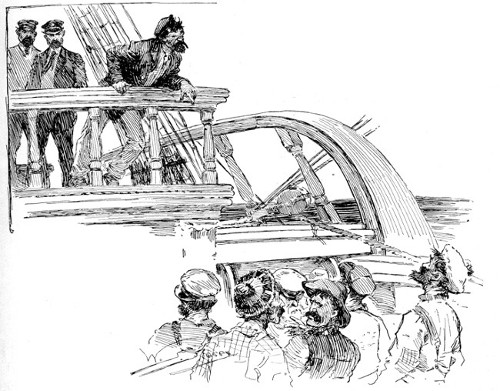 "HE ADDRESSED THE CROWD FROM THE POOP."
"HE ADDRESSED THE CROWD FROM THE POOP."
By the time they picked up the north-east trades poor old Smith owed the "owner" ten thousand pounds. Ware was five thousand to the good, and Brose, who had played poker in California, was worth fifteen thousand in strange paper. He began to dream of a row of houses with a public-house at each end. He and Geordie grew quite thick and compared public-house ideals.
"I'm goin' to buy a hotel," said Geordie;[Pg 442] "there's one in Trafalgar Square, London, as I've in my mind. I'll fit up the bar till it fair blazes with golden bottles."
He borrowed the mate's clothes and had a roaring time, and then they came into the Channel and picked up a tug, and went round the Foreland into London river.
"I'll bet lawyers and so on will be down to meet me," said Geordie. "They'll be full up with gold. To think of it! And to think I hit my poor old uncle with a brick!"
He mourned over his brutality.
"He wasn't half a bad chap," he said, "and I don't see what call my dad had to call him a bloodsucker after all."
They docked in the South-West Dock, and sure enough they had not been alongside their berth five minutes before old Tyser's usual London agent and a very legal-looking person came on board.
"Let me introduce you to the new owner," said the obsequious skipper, as he led up Geordie, who had a smile on him large enough to cut a mainsail out of.
"Oh," said the lawyer, "then this is Mr. Potts?"
"That's me," said Geordie. "Have you brought any money with you? I owes Mr. Ware five thousand and Mr. Brose fifteen."
The lawyer smiled.
"I'm afraid there's some mistake, Mr. Potts. Your uncle left a will after all."
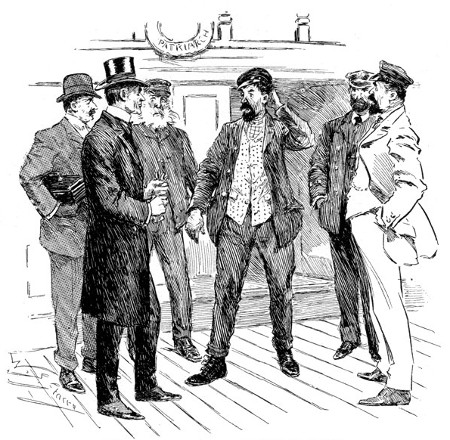 "I'M AFRAID THERE'S SOME MISTAKE, MR. POTTS."
"I'M AFRAID THERE'S SOME MISTAKE, MR. POTTS."
Geordie's jaw dropped and so did Ware's. But Brose's fell as falls the barometer in the centre of a cyclone.
"And me—did he leave me nothin'?" roared Geordie.
"Oh, yes," said the solicitor. "Mr. Gray, will you kindly give me that cash-box you are carrying?"
And the agent handed him the cash-box. "He left you this," said the lawyer. "And in this sealed envelope is the key."
Geordie grabbed the box eagerly.
"It's heavy," he said, "it's tolerable heavy."
And putting it on the rail he opened it with the key.
There was half a brick in it.
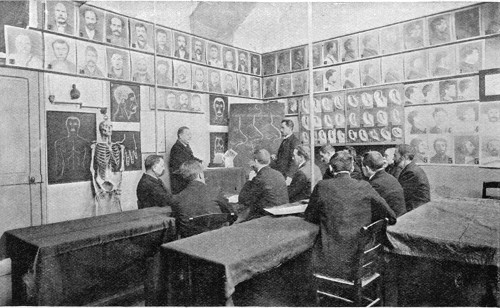 DETECTIVES RECEIVING A LECTURE ON THE METHOD OF
IDENTIFICATION BY NOSES.
DETECTIVES RECEIVING A LECTURE ON THE METHOD OF
IDENTIFICATION BY NOSES.The painter and the writer, the world has been assured repeatedly by the very highest authorities, can never encroach very far on each other's domains. Whereas a picture conveys the same idea to every beholder, so far at least as the outward aspect of the personages represented is concerned, a mere description can only give such vague and hazy outlines that the ideas of no two readers need ever be identical. How is it that no critic has ever suggested that this apparent inferiority of literature might, perhaps, simply be lack of science on the part of the author? Such, however, would appear to be the logical deduction to be drawn from the innovation which M. Bertillon, after ten years' persistent efforts, has recently succeeded in getting officially adopted by the Paris Detective Police.
M. Bertillon has proved that the appearance of any individual may be expressed in terms so clear, precise, and unequivocal that identically the same image is evoked in the mind of everybody who hears or reads the description. With nothing else but such a description to guide him in his search, anybody of normal intelligence is able, after a few lessons from the inventor of the system, to unerringly pick out the person indicated from a crowd, however great, and in an incredibly short time. The new method materially adds to the efficacy of the anthropometrical system of identification, with which the name of Bertillon, the inventor of the "thumb-prints" method, is inseparably connected. A brief outline of that system may here be given.
The variety of Nature is infinite; she never repeats herself. No two leaves are ever precisely alike, much less two human beings. A superficial observer may fancy that two individuals resemble each other in a remarkable manner. Let him examine them more attentively; he will find that they differ radically in almost every detail. The farther he carries his examination the more numerous and the more conspicuous will the differences appear, until at last he may almost experience a difficulty in discovering any trace of the resemblance that before seemed so striking. This is a résumé of some of the principal axioms at the base of M. Bertillon's teaching.
Every person, then, who for one reason or another comes within the power of the law[Pg 444] in France and in some other countries is photographed and measured in prevision of his transgressing on some future occasion.
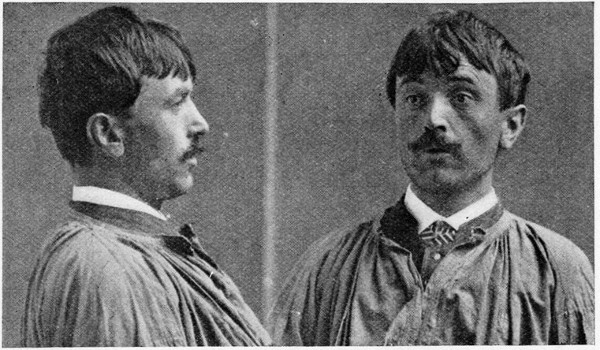 THESE ARE THE PORTRAITS OF A CRIMINAL, TAKEN IN PROFILE AND
FULL FACE.
THESE ARE THE PORTRAITS OF A CRIMINAL, TAKEN IN PROFILE AND
FULL FACE.
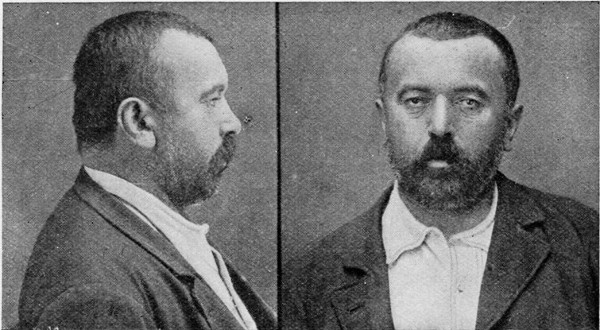 THIS IS THE SAME CRIMINAL, WHO WAS IDENTIFIED BY A DETECTIVE
AND ARRESTED ON THE EVIDENCE OF HIS EARS.
THIS IS THE SAME CRIMINAL, WHO WAS IDENTIFIED BY A DETECTIVE
AND ARRESTED ON THE EVIDENCE OF HIS EARS.
The complete description and measurements are transferred to a piece of thin cardboard, on which are also pasted two photographs of the subject—one full face, the other in profile, both reduced to one-seventh of life size. This is termed the prisoner's "fiche," which is now put away for future reference. Every year about twelve thousand "fiches" are thus added to the collection in Paris. In ten years this means one hundred and twenty thousand; in twenty years nearly a quarter of a million.
Let us assume now that a crime has been committed. All the evidence tends to prove that the culprit is none other than a certain man who passed through M. Bertillon's hands some years ago. His "fiche" is taken out, and copies of the photograph on it are distributed in the usual quarters. This old photograph is the only guide the police have by which to identify the fugitive. In the interval that has elapsed since it was taken, however, the man's outward appearance may have so completely changed that he might now walk under the very nose of the cleverest detectives in Europe, trained in the old school, without being recognised. Just such a case occurred quite recently in Paris, and was specially taken in hand by one of the most experienced men the "Sûreté" possessed at the time, but without result. Six months later a comparatively inexperienced detective arrested the criminal, who was on the point of embarking for America. Trained by M. Bertillon's new method to concentrate his attention exclusively on features which hardly ever vary, and to neglect entirely such accidental details as the fashion of wearing the hair and beard and the apparel, he had at once recognised the person he was in search of by the characteristic shape of ears and nose. This case is given in the accompanying photographs.
The contrary case to the foregoing instance—that is to say, the arrest of an innocent man, on the ground that he resembled a photograph in the detective's possession—used to be an all too frequent occurrence. Not even the very keenest of the law's sleuthhounds were able to avoid such mistakes. A good example is shown in the photographs next reproduced. Innumerable instances, too, are recorded of people claiming, as that of a brother, a husband, or a son who had disappeared, a body which, had they but been M. Bertillon's pupils[Pg 445] for an hour, they could never by any possibility have confounded with their missing relative. So persuaded have women often been of the accuracy of their own judgment that there have been cases in which they have at first indignantly repudiated the husband or son who subsequently reappears on the scene in flesh and blood and seeks to prove that he is not dead after all.
A detective is now taught that he must use the photograph he is supplied with merely as a check, to make assurance doubly sure, before he ventures on an arrest. What he must principally rely upon is the visual portrait he can evoke in his own imagination, a portrait which, he is told, is only valuable so far as he is able to describe it in words. That which we cannot clearly describe we cannot clearly conceive, is the pith of M. Bertillon's teaching. The pupil is, consequently, made to analyze each feature of the photograph separately, and express the result in certain conventional formulæ that convey a definite meaning to his own mind and to the mind of everybody else who has studied the same method. He makes, in fact, "a portrait in words."
The feature that presents the greatest diversity of form and size is the ear, and, strangely enough, the ear is precisely a feature which we hardly ever consciously look at. It has been reserved for M. Bertillon to point out how admirably it is adapted for the purpose of establishing a person's identity. The size of the ear, the relative proportions to one another of the folds, its contour, the surface and shape of the lobe, the manner the lobe is attached to the cheek, and the inclination of the bottom interior ridge known as the antitragus differ most materially in every individual. Let a modern French detective describe an ear as "Deq. cav. vex. tra. sep"; all his colleagues are immediately able to form a mental image of the description of ear he means.
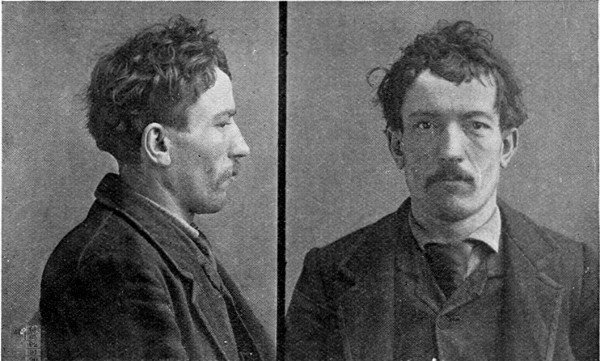 THESE ARE THE PORTRAITS OF A CRIMINAL.
THESE ARE THE PORTRAITS OF A CRIMINAL.
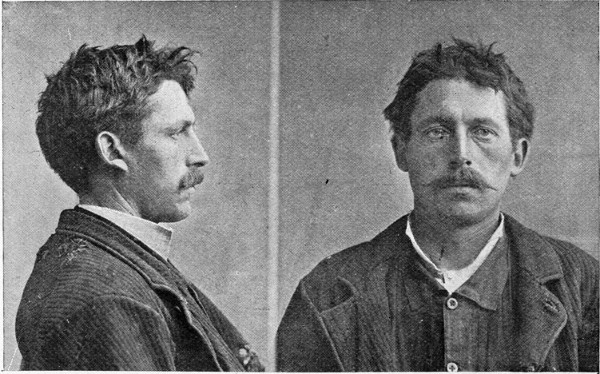 THESE ARE PORTRAITS OF AN INNOCENT MAN WHO WAS ARRESTED BY
AN UNTRAINED DETECTIVE AS BEING THE SAME MAN, BUT HIS EARS ALONE WERE
SUFFICIENT TO ACQUIT HIM.
THESE ARE PORTRAITS OF AN INNOCENT MAN WHO WAS ARRESTED BY
AN UNTRAINED DETECTIVE AS BEING THE SAME MAN, BUT HIS EARS ALONE WERE
SUFFICIENT TO ACQUIT HIM.
Similarly for the nose, of which three main varieties are recognised, according as the line of the back is concave, rectilinear, or convex. Each of these three principal classes is divided into three divisions according to the direction of the base line—ascending, horizontal, or descending. The degree of concavity or convexity of the line of the nose,[Pg 446] as well as the degree in which the base line descends or mounts, is indicated in very simple fashion by putting the term denoting the form into brackets or underlining it. Thus a moderately concave-backed nose is expressed by the abbreviation "cav."; if the concavity is very slightly marked by (cav.); and, if very accentuated, by cav. Noses of which the line is very sinuous or arched are denoted by the abbreviations "s" and "a." A nose described as cav. (s) would have a very strongly-marked concavity and be slightly sinuous, whereas (cav.) s would denote a nose but slightly concave, but with a very sinuous outline. The form of the root of the nose is also indicated in similar fashion to the back and base. So much for the shape of the nose. Its dimensions relatively to the face, its width, length, and degree of projection, are also indicated, for it is evident that size is quite independent of shape.
The degree of inclination of the forehead is another feature that is noted, as well as the general aspect of the complexion, colour of hair and eyes, and anything about the face that is in the least abnormal.
The entire course of instruction in "word-portraits" extends over thirty lessons of two hours each. At the end of the course an examination is held, in which the pupil must acquit himself honourably in the practical tests imposed upon him, if he wishes to obtain the coveted certificate, without which he can now hope for no promotion. Several hundred persons are assembled; with the exception of a few privileged strangers, almost all are connected directly or indirectly with the various services of the police administration. M. Bertillon or his principal lieutenant, M. Payen, hands a slip of paper to the candidate, containing some such brief indications as the following: "R—cav. (deq.) cav. × 1·62. O. 1878." "Pick out the person to whom this refers," adds the examiner. In an incredibly short space of time one of the audience finds himself "under arrest." The figures 1·62, it may be said, denote the person's height; "O" stands for orange-coloured eyes; and 1878 denotes, approximately, the year of birth—that is, that he is now about twenty-six years of age.
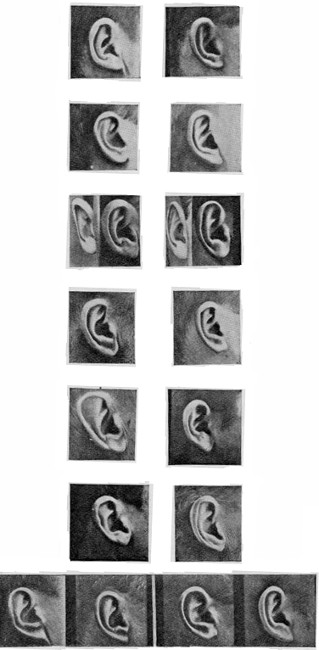 DIFFERENT TYPES OF EARS FROM THE CLASSIFICATION-BOOK.
DIFFERENT TYPES OF EARS FROM THE CLASSIFICATION-BOOK.
We have the authority of our cleverest modern humorist for the statement that the burglar and the cut-throat like a little innocent amusement occasionally; what wonder, then, if the austere detective does also? His chiefs, therefore, thoughtfully turn these examinations into occasions of grave merry-making by giving one or other of the examinees a descriptive portrait of some high functionary, perhaps of the Prefect of Police himself, should he be present. The fledgeling is thus placed in a dilemma; he must either display his incompetence or do violence to all his notions of respect for the official hierarchy, and put a disrespectful hand on one of the few shoulders in the world that he has looked upon as sacred. The manner in which the luckless wight acquits himself of his invidious task forms the theme of many a conversation in the "highest detective circles" of the French capital for the next week or so.
M. Bertillon has recently compiled an album containing about fifteen hundred photographs of the most notorious French criminals, classified exclusively by the shape of their ears and noses and their height. The man whose[Pg 447] portrait figures in this blackest of black books has, at any rate, the satisfaction of knowing that his physiognomy will not disappear from the world without leaving some memories behind it.
Other black books contain portraits of foreigners of different nationalities. The writer was allowed to peep into that relating to "English and American" malefactors who are at loggerheads with the Paris Prefecture of Police, and was patriotically pleased to find that their total number—five hundred—is only one-fifth that of the Belgians. A very large proportion, too, of these soi-disant English and American citizens, if their names are any criterion, might be Russians, Danes, Turks, or Prussians, but are certainly not Englishmen. Anglo-Saxondom may flatter herself that, in so far as France is concerned, she is a most exemplary race.
When the practice of portraits in words becomes generalized, as will no doubt very soon be the case, members of all those professions at which the laws of most countries persist in looking askance will have but a sorry time, if, indeed, they are able to subsist at all. Within the space of an hour or two telegraph and telephone will have carried a brief but unmistakable word-portrait of them to every corner of the civilized world if necessary. In large towns like London and Paris, twenty thousand pairs of trained eyes, covering the entire area of the city, can be set simultaneously on the search for the fugitive murderer or burglar, who will discover that the old methods of disguise are of but little use to him. A rumour that certain London banks contemplated having all their employés measured and photographed on M. Bertillon's system caused a considerable amount of murmuring recently, the measure being considered as somewhat derogatory by the clerks. By this extension of the method, however, their portraits can be taken without their knowledge, since neither camera nor measuring rule is necessary. Absconding cashiers will, in future, therefore have to be remarkably circumspect in their choice of foreign residence. Impostors like the claimant to the Tichborne estates, whose trial convulsed the Anglo-Saxon world over thirty years ago, will be given short shrift. It may be remarked, however, that one of the principal points brought forward at the trial to prove that the Claimant was not the man he pretended to be was precisely that the lobe of his ear was quite differently formed to the lobe of the real Roger Tichborne. This only proves once more the old adage that under the sun there is nothing new.
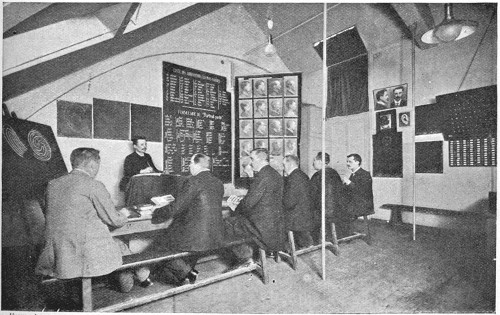 DETECTIVES RECEIVING A LESSON ON EARS.
DETECTIVES RECEIVING A LESSON ON EARS.The writer would here express his thanks to M. Lepine, the Prefect of Police, and M. Bertillon for their extreme courtesy in acceding to his request to be allowed to attend the course of lessons, and also for permission to use the photographs now reproduced.

Mr. Chalk made but a poor breakfast next morning, the effort to display a feeling of proper sympathy with Mrs. Chalk, who was presiding in gloomy silence at the coffee-pot, and at the same time to maintain an air of cheerful innocence as to the cause of her behaviour, being almost beyond his powers. He chipped his egg with a painstaking attempt to avoid noise, and swallowed each mouthful with a feeble pretence of not knowing that she was watching him as he ate. Her glance conveyed a scornful reproach that he could eat at all in such circumstances, and, that there might be no mistake as to her own feelings, she ostentatiously pushed the toast-rack and egg-stand away from her.
"You—you're not eating, my dear," said Mr. Chalk.
"If I ate anything it would choke me," was the reply.
Mr. Chalk affected surprise, but his voice quavered. To cover his discomfiture he passed his cup up for more coffee, shivering despite himself, as he noticed the elaborate care which Mrs. Chalk displayed in rinsing out the cup and filling it to the very brim. Beyond raising her eyes to the ceiling when he took another piece of toast, she made no sign.
"You're not looking yourself," ventured Mr. Chalk, after a time.
His wife received the information in scornful silence.
"I've noticed it for some time," said the thoughtful husband, making another effort. "It's worried me."
"I'm not getting younger, I know," assented Mrs. Chalk. "But if you think that that's any excuse for your goings on, you're mistaken."
Mr. Chalk murmured something to effect that he did not understand her.
"You understand well enough," was the reply. "When that girl came whistling over the fence last night you said you thought it was a bird."
"I did," said Mr. Chalk, hastily taking a spoonful of egg.
Mrs. Chalk's face flamed. "What sort of bird?" she demanded.
"Singin' bird," replied her husband, with nervous glibness.
Mrs. Chalk left the room.
Mr. Chalk finished his breakfast with an effort, and then, moving to the window, lit his pipe and sat for some time in moody thought. A little natural curiosity as to the identity of the fair whistler would, however, not be denied, and the names of Binchester's fairest daughters passed in review before him.[Pg 449] Almost unconsciously he got up and surveyed himself in the glass.
"There's no accounting for tastes," he said to himself, in modest explanation.
His mind still dwelt on the subject as he stood in the hall later on in the morning, brushing his hat, preparatory to taking his usual walk. Mrs. Chalk, upstairs listening, thought that he would never have finished, and drew her own conclusions.
With the air of a man whose time hangs upon his hands Mr. Chalk sauntered slowly through the narrow by-ways of Binchester. He read all the notices pasted on the door of the Town Hall and bought some stamps at the post-office, but the morning dragged slowly, and he bent his steps at last in the direction of Tredgold's office, in the faint hope of a little conversation.
To his surprise, Mr. Tredgold senior was in an unusually affable mood. He pushed his papers aside at once, and, motioning his visitor to a chair, greeted him with much heartiness.
"Just the man I wanted to see," he said, cheerfully. "I want you to come round to my place at eight o'clock to-night. I've just seen Stobell, and he's coming too."
"I will if I can," said Mr. Chalk.
"You must come," said the other, seriously. "It's business."
"Business!" said Mr. Chalk. "I don't see——"
"You will to-night," said Mr. Tredgold, with a mysterious smile. "I've sent Edward off to town on business, and we sha'n't be interrupted. Good-bye. I'm busy."
He shook hands with his visitor and led him to the door; Chalk, after a vain attempt to obtain particulars, walked slowly home.
Despite his curiosity it was nearly half-past eight when he arrived at Mr. Tredgold's that evening, and was admitted by his host. The latter, with a somewhat trite remark about the virtues of punctuality, led the way upstairs and threw open the door of his study.
"Here he is," he announced.
A slender figure sitting bolt upright in a large grandfather-chair turned at their entrance, and revealed to the astonished Mr. Chalk the expressive features of Miss Selina Vickers; facing her at the opposite side of the room Mr. Stobell, palpably ruffled, eyed her balefully.
"This is a new client of mine," said Tredgold, indicating Miss Vickers.
Mr. Chalk said "Good evening."
"I tried to get a word with you last night," said Miss Vickers. "I was down at the bottom of your garden whistling for over ten minutes as hard as I could whistle. I wonder you didn't hear me."
"Hear you!" cried Mr. Chalk, guiltily conscious of a feeling of disappointment quite beyond his control. "What do you mean by coming and whistling for me, eh? What do you mean by it?"
"I wanted to see you private," said Miss Vickers, calmly, "but it's just as well. I went and saw Mr. Tredgold this morning instead."
"On a matter of business," said Mr. Tredgold, looking at her. "She came to me, as one of the ordinary public, about some—ha—land she's interested in."
"An island," corroborated Miss Vickers.
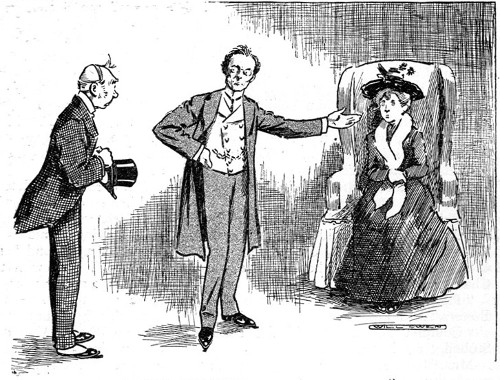 "'THIS IS A NEW CLIENT OF MINE,' SAID TREDGOLD."
"'THIS IS A NEW CLIENT OF MINE,' SAID TREDGOLD."
Mr. Chalk took a chair and looked round in amazement. "What, another?" he said, faintly.[Pg 450]
Mr. Tredgold coughed. "My client is not a rich woman," he began.
"Chalk knows that," interrupted Mr. Stobell. "The airs and graces that girl will give herself if you go on like that——"
"But she has some property there which she is anxious to obtain," continued Mr. Tredgold, with a warning glance at the speaker. "That being so——"
"Make him wish he may die first," interposed Miss Vickers, briskly.
"Yes, yes; that's all right," said Tredgold, meeting Mr. Chalk's startled gaze.
"It will be when he's done it," retorted the determined Miss Vickers.
"It's a secret," explained Mr. Tredgold, addressing his staring friend. "And you must swear to keep it if it's told you. That's what she means. I've had to and so has Stobell."
A fierce grunt from Mr. Stobell, who was still suffering from the remembrance of an indignity against which he had protested in vain, came as confirmation. Then the marvelling Mr. Chalk rose, and instructed by Miss Vickers took an oath, the efficacy of which consisted in a fervent hope that he might die if he broke it.
"But what's it all about?" he inquired, plaintively.
Mr. Tredgold conferred with Miss Vickers, and that lady, after a moment's hesitation, drew a folded paper from her bosom and beckoned to Mr. Chalk. With a cry of amazement he recognised the identical map of Bowers's Island, which he had last seen in the hands of its namesake. It was impossible to mistake it, although an attempt to take it in his hand was promptly frustrated by the owner.
"But Captain Bowers said that he had burnt it," he cried.
Mr. Tredgold eyed him coldly. "Burnt what?" he inquired.
"The map," was the reply.
"Just so," said Tredgold. "You told me he had burnt a map."
"Is this another, then?" inquired Mr. Chalk.
"P'r'aps," said Miss Vickers, briefly.
"As the captain said he had burnt his, this must be another," said Tredgold.
"Didn't he burn it, then?" inquired Mr. Chalk.
"I should be sorry to disbelieve Captain Bowers," said Tredgold.
"Couldn't be done," said the brooding Stobell, "not if you tried."
Mr. Chalk sat still and eyed them in perplexity.
"There is no doubt that this map refers to the same treasure as the one Captain Bowers had," said Tredgold, with the air of one making a generous admission. "My client has not volunteered any statement as to how it came into her possession——"
"And she's not going to," put in Miss Vickers, dispassionately.
"It is enough for me that we have got it," resumed Mr. Tredgold. "Now, we want you to join us in fitting out a ship and recovering the treasure. Equal expenses; equal shares."
"What about Captain Bowers?" inquired Mr. Chalk.
"He is to have an equal share without any of the expense," said Tredgold. "You know he gave us permission to find it if we could, so we are not injuring anybody."
"He told us to go and find it, if you remember," said Stobell, "and we're going to."
"He'll have a fortune handed to him without any trouble or being responsible in any way," said Tredgold, impressively. "I should like to think there was somebody working to put a fortune like that into my lap. We shall have a fifth each."
"That'll be five—thousand—pounds for you, Selina," said Mr. Stobell, with a would-be benevolent smile.
Miss Vickers turned a composed little face upon him and languidly closed one eye.
"I had two prizes for arithmetic when I was at school," she remarked; "and don't you call me Selina, unless you want to be called Bobbie."
A sharp exclamation from Mr. Tredgold stopped all but the first three words of Mr. Stobell's retort, but he said the rest under his breath with considerable relish.
"Don't mind him," said Miss Vickers. "I'm half sorry I let him join, now. A man that used to work for him once told me that he was only half a gentleman, but he'd never seen that half."
Mr. Stobell, afraid to trust himself, got up and leaned out of the window.
"Well, we're all agreed, then," said Tredgold, looking round.
"Half a second," said Miss Vickers. "Before I part with this map you've all got to sign a paper promising me my proper share, and to give me twenty pounds down."
Mr. Tredgold hesitated and looked serious. Mr. Chalk, somewhat dazed by the events of the evening, blinked at him solemnly. Mr. Stobell withdrew his head from the window and spoke.[Pg 451]
"Twenty—pounds!" he growled.
"Twenty pounds," repeated Miss Vickers, "or four hundred shillings, if you like it better. If you wait a moment I'll make it pennies."
She leaned back in her chair and, screwing her eyes tight, began the calculation. "Twelve noughts are nought," she said, in a gabbling whisper; "twelve noughts are nought, twelve fours are forty——"
"All right," said Mr. Tredgold, who had been regarding this performance with astonished disapproval. "You shall have the twenty pounds, but there is no necessity for us to sign any paper."
"No, there's no necessity," said Miss Vickers, opening her small, sharp eyes again, "only, if you don't do it, I'll find somebody that will."
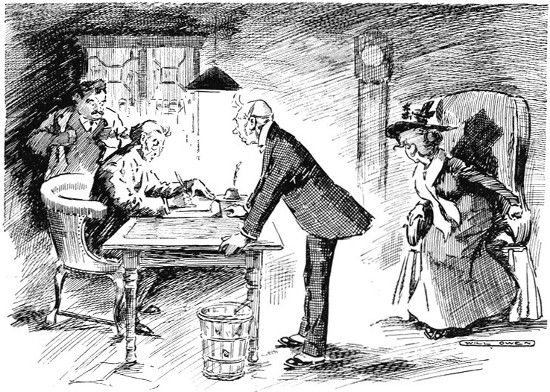 "MR. TREDGOLD PREPARED TO DRAW UP THE REQUIRED AGREEMENT."
"MR. TREDGOLD PREPARED TO DRAW UP THE REQUIRED AGREEMENT."
Mr. Tredgold argued with her, but in vain; Mr. Chalk, taking up the argument and expanding it, fared no better; and Mr. Stobell, opening his mouth to contribute his mite, was quelled before he could get a word out.
"Them's my terms," said Miss Vickers; "take 'em or leave 'em, just as you please. I give you five minutes by the clock to make up your minds; Mr. Stobell can have six, because thinking takes him longer. And if you agree to do what's right—and I'm letting you off easy—Mr. Tredgold is to keep the map and never to let it go out of his sight for a single instant."
She put her head round the side of the chair to make a note of the time, and then, sitting upright with her arms folded, awaited their decision. Before the time was up the terms were accepted, and Mr. Tredgold, drawing his chair to the table, prepared to draw up the required agreement.
He composed several, but none which seemed to give general satisfaction. At the seventh attempt, however, he produced an agreement which, alluding in vague terms to a treasure quest in the Southern Seas on the strength of a map provided by Miss Vickers, promised one-fifth of the sum recovered to that lady, and was considered to meet the exigencies of the case. Miss Vickers herself, without being enthusiastic, said that she supposed it would have to do.
Another copy was avoided, but only with great difficulty, owing to her criticism of Mr. Stobell's signature. It took the united and verbose efforts of Messrs. Chalk and Tredgold to assure her that it was in his usual style, and rather a good signature for him than otherwise. Miss Vickers, viewing it with her head on one side, asked whether he couldn't make his mark instead; a question which Mr. Stobell, at the pressing instance of his friends, left unanswered. Then Tredgold[Pg 452] left the room to pay a visit to his safe, and, the other two gentlemen turning out their pockets, the required sum was made up, and with the agreement handed to Miss Vickers in exchange for the map.
She bade them good-night, and then, opening the door, paused with her hand on the knob and stood irresolute.
"I hope I've done right," she said, somewhat nervously. "It was no good to anybody laying idle and being wasted. I haven't stolen anything."
"No, no," said Tredgold, hastily.
"It seems ridiculous for all that money to be wasted," continued Miss Vickers, musingly. "It doesn't belong to anybody, so nobody can be hurt by our taking it, and we can do a lot of good with it, if we like. I shall give some of mine away to the poor. We all will. I'll have it put in this paper."
She fumbled in her bodice for the document, and walked towards them.
"We can't alter it now," said Mr. Tredgold, decidedly.
"We'll do what's right," said Mr. Chalk, reassuringly.
Miss Vickers smiled at him. "Yes, I know you will," she said, graciously, "and I think Mr. Tredgold will, but——"
"You're leaving that door open," said Mr. Stobell, coldly, "and the draught's blowing my head off, pretty near."
Miss Vickers eyed him scornfully, but in the absence of a crushing reply disdained one at all. She contented herself instead by going outside and closing the door after her with a sharpness which stirred every hair on his head.
"It's a most extraordinary thing," said Mr. Chalk, as the three bent exultingly over the map. "I could ha' sworn to this map in a court of justice."
"Don't you worry your head about it," advised Mr. Stobell.
"You've got your way at last," said Tredgold, with some severity. "We're going for a cruise with you, and here you are raising objections."
"Not objections," remonstrated the other; "and, talking about the voyage, what about Mrs. Chalk? She'll want to come."
"So will Mrs. Stobell," said that lady's proprietor, "but she won't."
"She mustn't hear of it till the last moment," said Tredgold, dictatorially; "the quieter we keep the whole thing the better. You're not to divulge a word of the cruise to anybody. When it does leak out it must be understood we are just going for a little pleasure jaunt. Mind, you've sworn to keep the whole affair secret."
Mr. Chalk screwed up his features in anxious perplexity, but made no comment.
"The weather's fine," continued Tredgold, "and there's nothing gained by delay. On Wednesday we'll take the train to Biddlecombe and have a look round. My idea is to buy a small, stout sailing-craft second-hand; ship a crew ostensibly for a pleasure trip, and sail as soon as possible."
Mr. Chalk's face brightened. "And we'll take some beads, and guns, and looking-glasses, and trade with the natives in the different islands we pass," he said, cheerfully. "We may as well see something of the world while we're about it."
Mr. Tredgold smiled indulgently and said they would see. Messrs. Stobell and Chalk, after a final glance at the map and a final perusal of the instructions at the back, took their departure.
"It's like a dream," said the latter gentleman, as they walked down the High Street.
"That Vickers girl ud like more dreams o' the same sort," said Mr. Stobell, as he thrust his hand in his empty pocket.
"It's all very well for you," continued Mr. Chalk, uneasily. "But my wife is sure to insist upon coming."
Mr. Stobell sniffed. "I've got a wife too," he remarked.
"Yes," said Mr. Chalk, in a burst of unwonted frankness, "but it ain't quite the same thing. I've got a wife and Mrs. Stobell has got a husband—that's the difference."
Mr. Stobell pondered this remark for the rest of the way home. He came to the conclusion that the events of the evening had made Mr. Chalk a little light-headed.
Until he stood on the platform on Wednesday morning with his brother adventurers Mr. Chalk passed the time in a state of nervous excitement, which only tended to confirm his wife in her suspicions of his behaviour. Without any preliminaries he would burst out suddenly into snatches of sea-songs, the "Bay of Biscay" being an especial favourite, until Mrs. Chalk thought fit to observe that, "if the thunder did roar like that she should not be afraid of it." Ever sensitive to a fault, Mr. Chalk fell back upon "Tom Bowling," which he thought free from openings of that sort, until Mrs. Chalk, after commenting upon the inability of the late Mr. Bowling to hear the tempest's howling, indulged in idle speculations as to[Pg 453] what he would have thought of Mr. Chalk's. Tredgold and Stobell bought papers on the station, but Mr. Chalk was in too exalted a mood for reading. The bustle and life as the train became due were admirably attuned to his feelings, and when the train drew up and they embarked, to the clatter of milk-cans and the rumbling of trolleys, he was beaming with satisfaction.
"I feel that I can smell the sea already," he remarked.
Mr. Stobell put down his paper and sniffed; then he resumed it again and, meeting Mr. Tredgold's eye over the top of it, sniffed more loudly than before.
"Have you told Edward that you are going to sea?" inquired Mr. Chalk, leaning over to Tredgold.
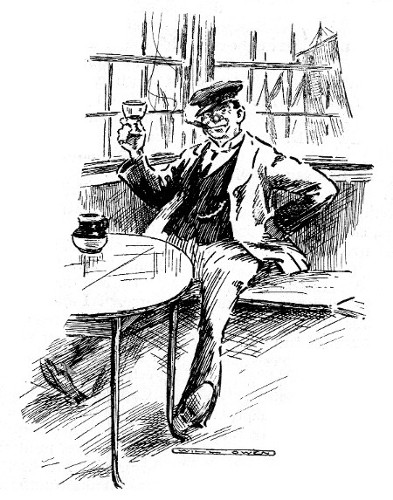 "'FINE DAY, GENTLEMEN,' SAID THE STRANGER, AS HE RAISED HIS
GLASS."
"'FINE DAY, GENTLEMEN,' SAID THE STRANGER, AS HE RAISED HIS
GLASS."
"Certainly not," was the reply; "I don't want anybody to know till the last possible moment. You haven't given your wife any hint as to why you are going to Biddlecombe to-day, have you?"
Mr. Chalk shook his head. "I told her that you had got business there, and that I was going with you just for the outing," he said. "What she'll say when she finds out——"
His imagination failed him and, a prey to forebodings, he tried to divert his mind by looking out of window. His countenance cleared as they neared Biddlecombe, and, the line running for some distance by the side of the river, he amused himself by gazing at various small craft left high and dry by the tide.
A short walk from the station brought them to the mouth of the river which constitutes the harbour of Biddlecombe. For a small port there was a goodly array of shipping, and Mr. Chalk's pulse beat faster as his gaze wandered impartially from a stately barque in all the pride of fresh paint to dingy, sea-worn ketches and tiny yachts.
Uncertain how to commence operations, they walked thoughtfully up and down the quay. If any of the craft were for sale there was nothing to announce the fact, and the various suggestions which Mr. Chalk threw off from time to time as to the course they should pursue were hardly noticed.
"One o'clock," said Mr. Stobell, extracting a huge silver timepiece from his pocket, after a couple of wasted hours.
"Let's have something to eat before we do any more," said Mr. Tredgold. "After that we'll ferry over and look at the other side."
They made their way to the King of Hanover, an old inn, perched on the side of the harbour, and, mounting the stairs, entered the coffee-room, where Mr. Stobell, after hesitating for some time between the rival claims of roast beef and grilled chops, solved the difficulty by ordering both.
The only other occupant of the room, a short, wiry man, with a close-shaven, hard-bitten face, sat smoking, with a glass of whisky before him, in a bay window at the end of the room, which looked out on the harbour. There was a maritime flavour about him which at once enlisted Mr. Chalk's sympathies and made him overlook the small, steely-grey eyes and large and somewhat brutal mouth.
"Fine day, gentlemen," said the stranger, nodding affably to Mr. Chalk as he raised his glass.
Mr. Chalk assented, and began a somewhat minute discussion upon the weather, which lasted until the waiter appeared with the lunch.
"Bring me another drop o' whisky, George," said the stranger, as the latter was about to leave the room, "and a little stronger, d'ye hear? A man might drink this and still be in the Band of Hope."
"We thought it wouldn't do for you to get the chuck out of it after all these years, Cap'n Brisket," said George, calmly. "It's a whisky that's kept special for teetotalers like you."[Pg 454]
Captain Brisket gave a hoarse laugh and winked at Mr. Stobell; that gentleman, merely pausing to empty his mouth and drink half a glass of beer, winked back.
"Been here before, sir?" inquired the captain.
Mr. Stobell, who was busy again, left the reply to Mr. Chalk.
"Several times," said the latter. "I'm very fond of the sea."
Captain Brisket nodded, and, taking up his glass, moved to the end of their table, with the air of a man disposed to conversation.
"There's not much doing in Biddlecombe nowadays," he remarked, shaking his head. "Trade ain't what it used to be; ships are more than half their time looking for freights. And even when they get them they're hardly worth having."
Mr. Chalk started and, leaning over, whispered to Mr. Tredgold.
"No harm in it," said the latter. "Better leave it to me. Shipping's dull, then?" he inquired, turning to Captain Brisket.
"Dull?" was the reply. "Dull ain't no name for it."
Mr. Tredgold played with a salt-spoon and frowned thoughtfully.
"We've been looking round for a ship this morning," he said, slowly.
"As passengers?" inquired the captain, staring.
"As owners," put in Mr. Chalk.
Captain Brisket, greatly interested, drew first his glass and then his chair a yard nearer. "Do you mean that you want to buy one?" he inquired.
"Well, we might if we could get one cheap," admitted Tredgold, cautiously. "We had some sort of an idea of a cruise to the South Pacific; pleasure, with perhaps a little trading mixed up with it. I suppose some of these old schooners can be picked up for the price of an old song?"
The captain, grating his chair along the floor, came nearer still; so near that Mr. Stobell instinctively put out his right elbow.
"You've met just the right man," said Captain Brisket, with a boisterous laugh. "I know a schooner, two hundred and forty tons, that is just the identical article you're looking for, good as new and sound as a bell. Are you going to sail her yourself?"
"No," said Mr. Stobell, without looking up, "he ain't."
"Got a master?" demanded Captain Brisket, with growing excitement. "Don't tell me you've got a master."
"Why not?" growled Mr. Stobell, who, having by this time arrived at the cheese, felt that he had more leisure for conversation.
"Because," shouted the other, hitting the table a thump with his fist that upset half his whisky—"because if you haven't Bill Brisket's your man."
The three gentlemen received this startling intelligence with such a lack of enthusiasm that Captain Brisket was fain to cover what in any other man might have been regarded as confusion by ringing the bell for George and inquiring with great sternness of manner why he had not brought him a full glass.
"We can't do things in five minutes," said Mr. Tredgold, after a long and somewhat trying pause. "First of all we've got to get a ship."
"The craft you want is over the other side of the harbour waiting for you," said the captain, confidently. "We'll ferry over now if you like, or, if you prefer to go by yourselves, do; Bill Brisket is not the man to stand in anyone's way, whether he gets anything out of it or not."
"Hold hard," said Mr. Stobell, putting up his hand.
Captain Brisket regarded him with a beaming smile; Mr. Stobell's two friends waited patiently.
"What ud a schooner like that fetch?" inquired Mr. Stobell.
"It all depends," said Brisket. "Of course, if I buy—"
Mr. Stobell held up his hand again. "All depends whether you buy it for us or sell it for the man it belongs to, I s'pose?" he said, slowly.
Captain Brisket jumped up, and to Mr. Chalk's horror smote the speaker heavily on the back. Mr. Stobell, clenching a fist the size of a leg of mutton, pushed his chair back and prepared to rise.
"You're a trump," said Captain Brisket, in tones of unmistakable respect, "that's what you are. Lord, if I'd got the head for business you have I should be a man of fortune by now."
Mr. Stobell, who had half risen, sat down again, and, for the first time since his last contract but one, a smile played lightly about the corners of his mouth. He took another drink and, shaking his head slightly as he put the glass down, smiled again with the air of a man who has been reproached for making a pun.
"Let me do it for you," said Captain Brisket, impressively. "I'll tell you where to go without being seen in the matter or[Pg 455] letting old Todd know that I'm in it. Ask him a price and bate him down; when you've got his lowest, come to me and give me one pound in every ten I save you."
Mr. Tredgold looked at his friends. "If we do that," he said, turning to the captain, "it would be to your interest to buy the ship in any case. How are we to be sure she is seaworthy?"
"Ah, there you are!" said Brisket, with an expansive smile. "You let me buy for you and promise me the master's berth, provided you are satisfied with my credentials. Common sense'll tell you I wouldn't risk my own carcass in a rotten ship."
Mr. Stobell nodded approval and, Captain Brisket with unexpected delicacy withdrawing to the window and becoming interested in the harbour, conferred for some time with his friends. The captain's offer being accepted, subject to certain conditions, they settled their bill and made their way to the ferry.
"There's the schooner," said the captain, pointing, as they neared the opposite shore; "the Fair Emily, and the place she is lying at is called Todd's Wharf. Ask for Mr. Todd, or, better still, walk straight on to the wharf and have a look at her. The old man'll see you fast enough."
He sprang nimbly ashore as the boat's head touched the stairs, and after extending a hand to Mr. Chalk, which was coldly ignored, led the way up the steps to the quay.
"There's the wharf just along there," he said, pointing up the road. "I'll wait for you at the Jack Ashore here. Don't offer him too much to begin with."
"I thought of offering a hundred pounds," said Mr. Tredgold. "If the ship's sound we can't be very much out over that sum."
Captain Brisket stared at him. "No; don't do that," he said, recovering, and speaking with great gravity. "Offer him seventy. Good luck."
He watched them up the road and then, with a mysterious grin, turned into the Jack Ashore, and taking a seat in the bar waited patiently for their return.
Half an hour passed. The captain had smoked one pipe and was half through another. He glanced at the clock over the bar and fidgeted as an unpleasant idea that the bargain, despite Mr. Tredgold's ideas as to the value of schooners, might have been completed without his assistance occurred to him. He took a sip from his glass, and then his face softened as the faint sounds of a distant uproar broke upon his ear.
"What's that?" said a customer.
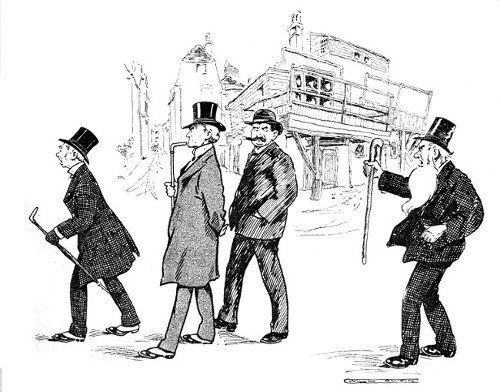 "HIS THREE PATRONS, WITH A HOPELESS ATTEMPT TO APPEAR
UNCONCERNED, WERE COMING DOWN THE ROAD."
"HIS THREE PATRONS, WITH A HOPELESS ATTEMPT TO APPEAR
UNCONCERNED, WERE COMING DOWN THE ROAD."
The landlord, who was glancing at the paper, put it down and listened. "Sounds like old Todd at it again," he said, coming round to the front of the bar.[Pg 456]
The noise came closer. "It is old Todd," said another customer, and hastily finishing his beer moved with the others to the door. Captain Brisket, with a fine air of indifference, lounged after them, and peering over their shoulders obtained a good view of the approaching disturbance.
His three patrons, with a hopeless attempt to appear unconcerned, were coming down the road, while close behind a respectable-looking old gentleman with a long, white beard and a voice like a fog-horn almost danced with excitement. They quickened their pace as they neared the inn, and Mr. Chalk, throwing appearances to the winds, almost dived through the group at the door. He was at once followed by Mr. Tredgold, but Mr. Stobell, black with wrath, paused in the doorway.
"Fetch 'em out," vociferated the old gentleman as the landlord barred the doorway with his arms. "Fetch that red-whiskered one out and I'll eat him."
"What's the matter, Mr. Todd?" inquired the landlord, with a glance at his friends. "What's he done?"
"Done?" repeated the excitable Mr. Todd. "Done? They come walking on to my wharf as if the place——Fetch him out," he bawled, breaking off suddenly. "Fetch him out and I'll skin him alive."
Captain Brisket took Mr. Stobell by the cuff and after a slight altercation drew him inside.
"Tell that red-whiskered man to come outside," bawled Mr. Todd. "What's he afraid of?"
"What have you been doing to him?" inquired Captain Brisket, turning to the pallid Mr. Chalk.
"Nothing," was the reply.
"Is he coming out?" demanded the terrible voice, "or have I got to wait here all night? Why don't he come outside, and I'll break every bone in his body."
Mr. Stobell scratched his head in gloomy perplexity: then, as his gaze fell upon the smiling countenances of Mr. Todd's fellow-townsmen, his face cleared.
"He's an old man," he said, slowly, "but if any of you would like to step outside with me for five minutes, you've only got to say the word, you know."
Nobody manifesting any signs of accepting this offer, he turned away and took a seat by the side of the indignant Tredgold. Mr. Todd, after a final outburst, began to feel exhausted, and forsaking his prey with much reluctance allowed himself to be led away. Snatches of a strong and copious benediction, only partly mellowed by distance, fell upon the ears of the listeners.
"Did you offer him the seventy?" inquired Captain Brisket, turning to Mr. Tredgold.
"I did," said Mr. Chalk, plaintively.
"Ah," said the captain, regarding him thoughtfully; "perhaps you ought to ha' made it eighty. He's asking eight hundred for it, I understand."
Mr. Tredgold turned sharply. "Eight hundred?" he gasped.
The captain nodded, "And I'm not saying it's not worth it," he said, "but I might be able to get it for you for six. You'd better leave it to me now."
Mr. Tredgold at first said he would have nothing more to do with it, but under the softening influence of a pipe and a glass was induced to reconsider his decision. Captain Brisket, waving farewells from the quay as they embarked on the ferry-boat later on in the afternoon, bore in his pocket the cards of all three gentlemen, together with a commission entrusting him with the preliminary negotiations for the purchase of the Fair Emily.
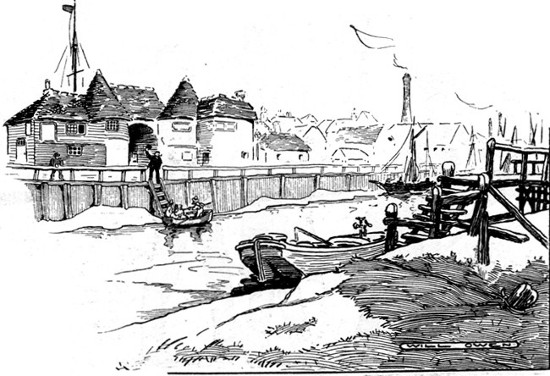 "CAPTAIN BRISKET WAVING FAREWELLS FROM THE QUAY AS THEY
EMBARKED."
"CAPTAIN BRISKET WAVING FAREWELLS FROM THE QUAY AS THEY
EMBARKED."
[A] Copyright, 1904, by W. W. Jacobs, in the United States of America.

[In April of last year the steamer Miosen, from Christiania, sailed from New Orleans. Owing to a damaged tail-shaft off Key West she practically drifted from the Straits of Florida to the Färöe Islands. From the captain's notes the following account of the Gulf Stream voyage is transcribed.]
What is the greatest river in the world? Naturally every Kindergarten pupil would instantly respond by naming the Mississippi, with the Amazon a good second. But that is because they are deceived by geographers jealous of the prerogative of the land. Hydrographers—as, for example, Sir John Murray, K.C.B.—would return a different answer, and it is clear that hydrographers ought to know something about water.
The greatest river in the world, then, begins in the vicinity of Key West, Florida. There is on the globe no such stupendous flow of waters. It defies the severest droughts; in the mightiest floods it never overflows. Its current sweeps onward more rapidly than the Mississippi or the Amazon and its volume is a thousand times greater. Let us rid our mind of the idea of land. The banks and the bottom of this stupendous river are of cold, whilst its current is of warm, water. The name of it is the Gulf Stream. It might properly be called the Atlantic River. Doubtless many hundreds, even thousands, of craft have made the voyage down this river from its source to its mouth, and the trip of the Miosen, of Christiania, Norway, is only remarkable in this: that she virtually drifted the whole distance, four thousand two hundred and twelve miles. The Miosen is a Norwegian steamer of one thousand two hundred and eighty tons, and carried a cargo of molasses, rice, and tobacco from New Orleans to Christiania.
After leaving New Orleans early in April, 1903, she encountered roughish weather in the Gulf of Mexico. But it was not until they had passed the Tortugas group that Captain Westrup suspected that there was anything radically wrong with the machinery. The Miosen was fitted with old-fashioned Glasgow engines, and carried a sail in case of emergency. At Key West she put in for four days to see if the engineer could patch up the propeller sufficiently to enable the vessel to cross the Atlantic. "It was at Key West," said Captain Westrup, "I met an old fellow-mariner, a Swede.
"'Going down the river?' he asked.
"I laughed, not understanding the joke.
"'No; I'm crossing the Atlantic,' I replied.
"I then told him about the fractured propeller.
"'Take my advice,' he said, 'and go by the river route. Like as not you'll drift the whole way, and if you're in no hurry you can give your engines a rest. A single sheet to the wind will do your job.'
"It was the first time I had heard the[Pg 458] expression 'river' as applied to the Gulf Stream. The idea entertained me. I already began to regard my forthcoming trip as a mere jaunt down a river, and with this in my head I took pains to note everything of interest connected with this stupendous stream. And here let me say that two leagues to the south-east of Key West the Gulf mariners point to a buoy labelled in prominent letters 'F. C.,' which stands for Florida Channel. It marks the end of the Gulf of Mexico and the beginning of the Atlantic River."
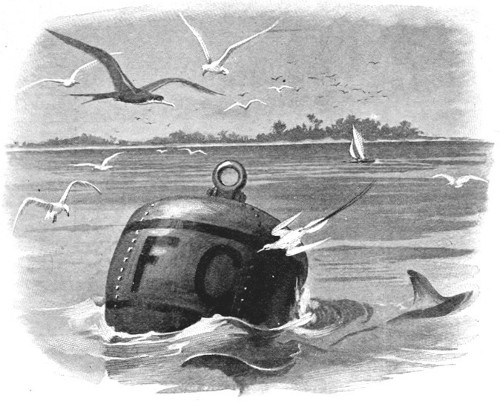 THE BUOY IN FLORIDA CHANNEL.
THE BUOY IN FLORIDA CHANNEL.
The machinery of the Miosen was patched up by the 5th April, and on the following morning the crew had hoisted her solitary sail and departed from Key West. All along south of the Florida reef they had constant glimpses of tarpon, devil-fish, and barracuda, the mightiest fish in the Gulf Stream. For it must be understood that whales and sharks avoid the greatest river in the world. We will explain why later. During the next few days they frequently saw tarpon (Megalops Atlanticus) six feet long, reminding one of gigantic herring. Some of them must have weighed one hundred and fifty pounds; and the one which nearly boarded the steamer, leaping into the air a foot from the bows of the Miosen, was fully this weight.
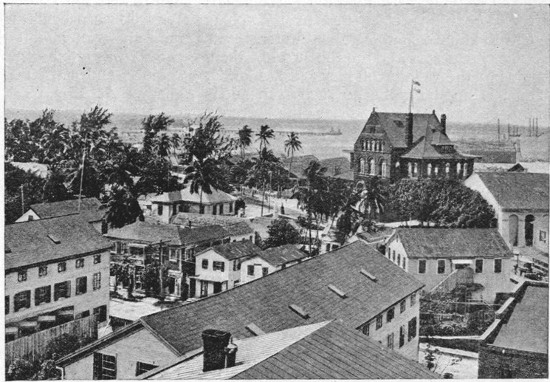 KEY WEST.
KEY WEST."I had heard stories at Key West about the barracuda, which is harpooned very much in the way whales are, although it is a somewhat smaller fish than the tarpon. My friend Captain Altsen told me he had once gone out in a small dinghy off the Keys with a Seminole Indian who was an adept at spearing barracuda. Armed with a long, slender pole tipped with a barb, to which a long rope was fastened, the native had speared the fish, which darted away like 'greased lightning,'[Pg 459] actually towing the boat a full mile before he was hauled aboard exhausted. He said it was pretty exciting sport, and jokingly suggested my engaging a school of barracuda to tow the Miosen to Stockholm. He observed, however, that they would probably leave the ship at Tindhölm, as they only frequent the Gulf Stream.
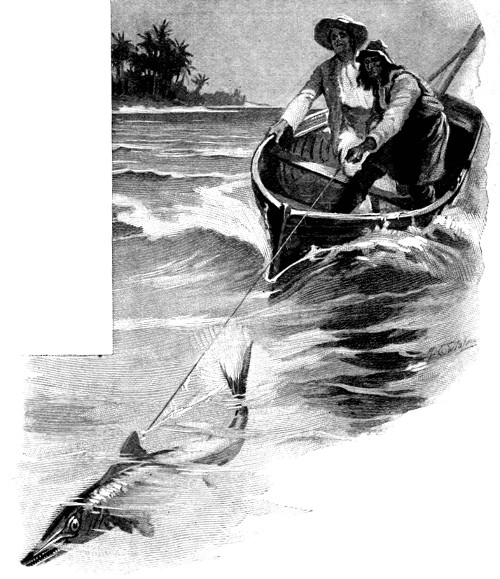 "THE FISH DARTED AWAY LIKE 'GREASED LIGHTNING.'"
"THE FISH DARTED AWAY LIKE 'GREASED LIGHTNING.'"
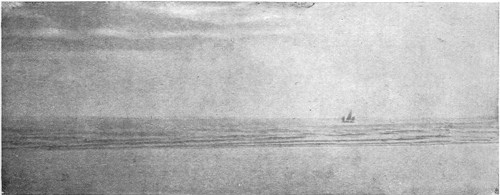 PHOTOGRAPH TAKEN BY THE MATE OF THE "MIOSEN" IN LATITUDE 30,
LONGITUDE 82, SHOWING THE DIFFERENT ASPECT OF THE GREAT RIVER AND THE
OCEAN.
PHOTOGRAPH TAKEN BY THE MATE OF THE "MIOSEN" IN LATITUDE 30,
LONGITUDE 82, SHOWING THE DIFFERENT ASPECT OF THE GREAT RIVER AND THE
OCEAN.
"I may mention that at the beginning our speed was between four and five knots an hour, but we hardly averaged more than about fifty knots a day. There was little wind to speak of. On the 8th we had a fair breeze, which sent us along a couple of knots faster. The speed of the current is, I am told, wholly regulated by the presence or absence of wind; but I give the normal time. As we rounded the south coast of Florida we encountered huge flocks of birds wending their way northward. Anything more placid and beautiful than the Gulf Stream at this point cannot be imagined. The water is a brilliant blue, like the Bay of Naples, while in the far distance may be seen the dark green of the ocean. The temperature of the water I ascertained to be seventy-four degrees Fahrenheit; that of the Atlantic could hardly have been above forty-five degrees. Off Bebini we observed a curious sight, which more than ever impressed the idea of a river on our minds, and this occurred several times in the course of our long trip. The presence of a stiff land breeze blew us out of the channel to the very edge of the Stream, whose boundaries were here as clearly marked as that of the Mississippi. Great quantities of driftwood and flotsam of all sorts, including canes and palm leaves, floated in a long, thin line extending for miles, forming natural banks to the world's greatest river. My mate took a photograph[Pg 460] of this phenomenon, together with others, but, unluckily, in developing them later, all were more or less spoiled, although some idea may be got from the one showing the aspect of the Stream. We also observed numerous flying-fish, which, curiously enough, rarely, if ever, deviated from the path of the Stream, as if they were quite aware of its course and boundaries."
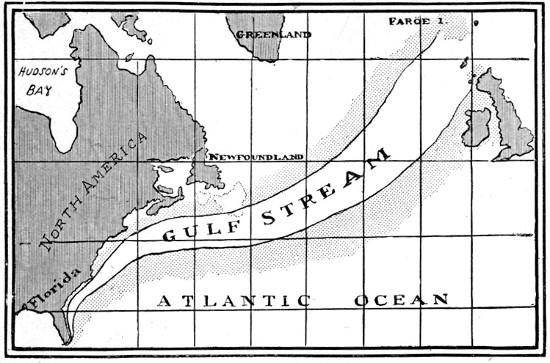 DIAGRAM SHOWING THE COURSE OF THE GULF STREAM.
DIAGRAM SHOWING THE COURSE OF THE GULF STREAM.
From this point the river flows straight to the north, pressing through the ocean with a width of nearly thirty-seven miles, and of an average depth of two hundred fathoms. The mass of water has been estimated at some forty-five millions of cubic yards a second. The mean discharge of the Mississippi is barely twenty-five thousand cubic yards.
As the Gulf Stream expands and spreads in its northward and easterly course, its depth becomes proportionately less considerable. The strata of cold water which serve as its banks retire on each side and allow it more breadth. The cold bed of water which bears it, and over which it flows, as terrestrial rivers glide over beds of rocks, gradually approaches nearer the surface. Off Cape Hatteras the depth is about one hundred and twenty fathoms, and its speed does not exceed three miles an hour, but it is twice as wide as when it emerges from the Strait of Florida. Its width is here seventy-eight miles. Its thickness, of course, constantly diminishes until it is only a thin sheet of warm water on the other side of the Atlantic, and is gradually dissipated in the sub-Arctic sea.
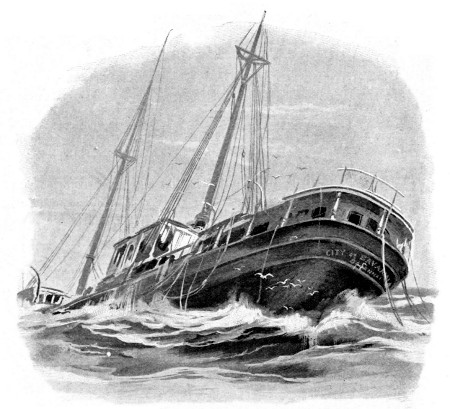 THE "CITY OF SAVANNAH," WRECKED IN THE GREAT STORMS OF
1893.
THE "CITY OF SAVANNAH," WRECKED IN THE GREAT STORMS OF
1893.
As the travellers proceeded almost due north the island of Great Bahama soon[Pg 461] came to form the eastern boundary of the Gulf Stream. In this locality many fearful storms have occurred, for when the river is angry it is one of the most fearful places in the world for a ship to be. It is said that the whole of the Bahama Islands which lie scattered through the sea to the east of the Gulf Stream rest on a foundation of submarine banks formed by the deposits of the river. The same may be said of the islands which line the coasts of Georgia and the Carolinas on the west. Off one of these islands the captain distinctly made out the wreck of a large craft, floating free on the edge of this current, which he has since been told was the City of Savannah, wrecked in the great storms of 1893. Derelicts are common in these parts, no fewer than forty having been reported last year.
Long ago the soundings taken by the officers of the American Coast Survey showed, according to Lieut. Maury, that the Gulf Stream flows along the coast of America at some distance from the land. The slight inclination of the low lands of Georgia and Carolina is continued under water till the sounding line attains a depth of about fifty fathoms. The bottom then sinks rapidly and forms a long valley parallel to the shore of America and the chalky walls of the Appalachian range. In this valley, hollowed to the east of the submarine basement of America, the Gulf Stream waters flow. Owing to the rotatory motion of the globe and also to the curve of the coasts, the Stream follows a constant direction to the north-east. Off New York and Cape Cod it deviates more and more to the east. It ceases to follow the coast-line, and rolls across the open Atlantic towards the shores of Western Europe. Thus, as Maury says, if an enormous cannon had force enough to send a bullet from the Strait of the Bahamas to the North Pole the projectile would follow almost exactly the curve of the Gulf Stream and, gradually deviating on its way, reach Europe from the west.
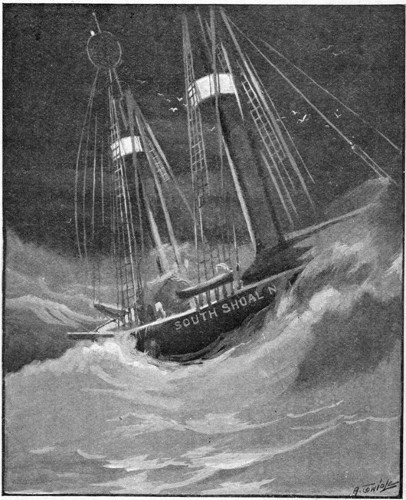 THE SOUTH SHOAL LIGHTSHIP, WHICH MARKS THE SITE OF AN OCEAN
GRAVEYARD.
THE SOUTH SHOAL LIGHTSHIP, WHICH MARKS THE SITE OF AN OCEAN
GRAVEYARD.
We have spoken of the driftwood boundaries of the Gulf Stream; but there is an even more pronounced barrier easily ascertained by a use of the thermometer. The warmest and most rapid part of the Gulf Stream is that in most immediate juxtaposition to a sheet of cold water flowing in an opposite direction off Carolina which bounds our river like a wall of ice. Occasionally the line of demarcation is so precise that it is visible to the naked eye, and the exact moment when a ship leaves the cold current and its prow cleaves the Gulf Stream may be observed. The latter waters are of a beautiful azure, that of the counter-current is greenish; one is saturated with salt, the other contains the mineral to a far slighter extent. But the chief distinction is that one is tepid, the other frigid as ice.
On the 21st one of the men reported having sighted a light to the north, and had also clearly heard a distant bell tolling. This was probably the South Shoal Lightship, which marks the site of an ocean graveyard hereabouts. This lightship, with a[Pg 462] crew of a dozen men, has been adrift nearly thirty times in the course of her history, and was once fourteen days in the Gulf Stream. She is a schooner or barge of two hundred and seventy-five tons, about one hundred feet long, chained to an anchor of three and a half tons. But it is said the life aboard is so unbearably monotonous to the crew that they cut the chain and so send the lightship adrift. The skipper was glad when the Gulf Stream carried him away from the neighbourhood, for he was reminded that over five hundred wrecks have taken place some leagues to the northward of his course.
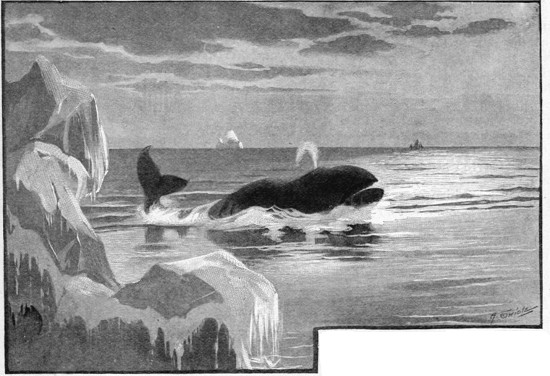 "THE TEMPERATURE OF THE STREAM WAS DISAGREEABLE TO HIM."
"THE TEMPERATURE OF THE STREAM WAS DISAGREEABLE TO HIM."
The Miosen was now bound almost due east, as if headed for the Azores, for the great river curves at this point. Just south of Halifax, in longitude sixty-five degrees, they came across their first iceberg, drifting on the very edge of the stream. There is nothing so unhealthy for an iceberg as the Gulf Stream, and an iceberg seems to know it. When, however, it is fairly caught in its clutches it soon melts away to nothingness before it has been carried many leagues eastward, all depending, of course, upon its size. As with icebergs, so with whales, as we have already mentioned. The vessel encountered a whale later in longitude fifty, but it was obvious that the temperature of the Stream was disagreeable to him, for he soon headed again for the Arctic regions. Other whales make a dash through or remain by the side of the big river and so reach lower latitudes, but a brief sojourn is enough for them. The Gulf Stream is a river which can boast everything maritime but whales.
The great river just touches the southern extremity of the Grand Banks of Newfoundland. This bank of Newfoundland, an enormous plateau surrounded on all sides by abysses five to six miles deep, is chiefly due to the contact of the Arctic current with the Gulf Stream. For here is the chief graveyard of icebergs. On entering the tepid waters of the river the frozen mountains gradually melt and let fall the fragments of rock and loads of earth they bear into the sea. The bank, which rises gradually from the bottom, is the work of the Greenland glaciers and the floes of the Polar Sea. It is the presence of the Gulf Stream in these latitudes which is the cause of the prevalent fogs not only here, but in the islands off Europe. From here onward a sailor can always tell whether or not he is in the Stream by plunging a thermometer overboard. Capt. Westrup found that it crosses the Atlantic with a mean speed of twenty-four knots a day. This had previously been ascertained, according to Maury, by direct measurement at different parts of the ocean, or by means of notes, which, having been[Pg 463] thrown overboard in bottles, carefully closed, have floated for weeks or months at the will of the waves, and then been fished up in other latitudes or found on some seashore. In its long journey this mighty river transports hardly any other alluvium than the living frustules of animalculæ which fill the tepid waters of the current, and are constantly falling like snowflakes to the bottom of the ocean. However, during the whole distance across the Miosen constantly met with the trunks and branches of trees, cane stalks, and woody flotsam, much of which finally reaches the coasts of Europe, even as far as Spitzbergen.
"It was," says M. Reclus, "these remains which our ancestors of the Middle Ages believed to come from the fabulous island of St. Brandan or from Antilia, and which furnished matter for thought to daring navigators like the great Columbus. Seeds carried from the New World by the current have found a favourable soil on the shores of the Azores, and, although many thousands of miles from their native land, have germinated and borne fruit. Frequently the Gulf Stream brings to Europe the damaged products of human industry and the timber of wrecked ships. During the Seven Years' War the main-mast of an English man-of-war, the Tilbury, which had been burnt near San Domingo, was found on the northern coasts of Scotland. Also, a river-boat laden with mahogany was once driven to the Färöe Islands. The remnants of vessels wrecked in the latitude of Guinea have reached the British Isles on the Gulf Stream, and Esquimaux canoes have often been carried on its waves to the Orkneys."
The Färöe Islands formed the temporary stopping-place of the Miosen.
"Here," states the captain, "we disembarked at Thorshaven on May 13th. On the morning of the 12th we sighted Tindhölm, which is generally regarded as the barrier or point marking the end of the longest river in the world. We had begun our voyage at its source, and had traversed four thousand two hundred and twelve miles to its mouth, where the waters spread out into the great North Sea."
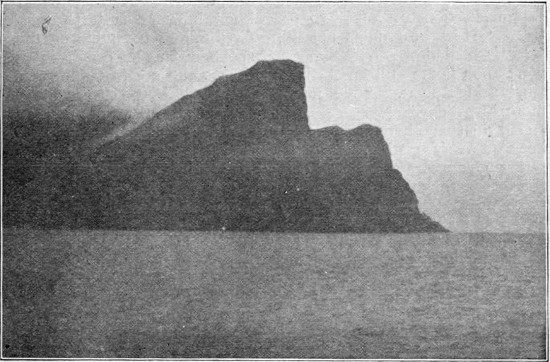 APPROACH TO THE FÄRÖE ISLANDS—THE END OF THE GULF STREAM.
APPROACH TO THE FÄRÖE ISLANDS—THE END OF THE GULF STREAM.Of the incalculable benefit to the climate of the British Isles and Western Europe which the Gulf Stream confers, one need not here pretend to speak. The river waters lose their warmth but slowly, and during winter they often have, off Cape Hatteras and the bank of Newfoundland, a temperature twenty-eight degrees Fahrenheit above that of the ocean. Thus they become a source of heat to Western Europe. Owing to the warmth of its waters the lakes of the Färöe and Shetland Isles never freeze in winter. Great Britain is enveloped in fogs and the myrtle grows on Irish shores in the same latitude as icy Labrador. The western coasts of Ireland have five degrees higher temperature even than those of the eastern, and there the fifty-second degree of latitude corresponds to the thirty-eighth degree in America. All this is ascribed, and rightly, to the proximity of the world's greatest river.
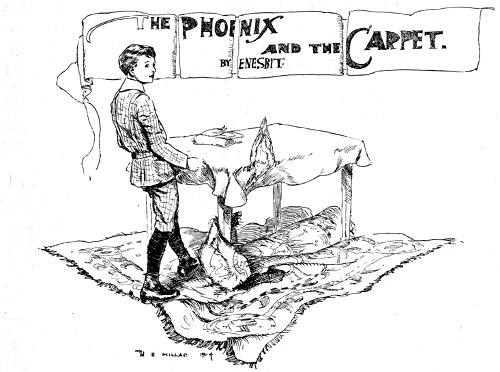
Jane sang this simple song directly after breakfast, and the Phœnix shed crystal tears of affectionate sympathy.
"How beautiful," it said, "is filial devotion!"
"She won't be home till past bed-time, though," said Robert. "We might have one more carpet-day."
He was glad that mother was coming home—quite glad, very glad; but at the same time that gladness was rudely contradicted by a quite strong feeling of sorrow, because now they could not go out all day on the carpet.
"I do wish we could go and get something nice for mother, only she'd want to know where we got it," said Anthea. "And she'd never, never believe the truth. People never do, somehow, if it's at all interesting."
"I'll tell you what," said Robert. "Suppose we wished the carpet to take us somewhere where we could find a purse with money in it—then we could buy her something."
"Suppose it took us somewhere foreign, and the purse was covered with strange Eastern devices, embroidered in rich silks, and full of money that wasn't money at all here, only foreign curiosities, then we couldn't spend it, and people would bother about where we got it, and we shouldn't know how on earth to get out of it all." Cyril moved the table off the carpet as he spoke, and its leg caught in one of Anthea's darns and ripped away most of it, as well as a large slit in the carpet.
"Well, now you have done it," said Robert.
But Anthea was a really first-class sister. She did not say a word till she had got out the Scotch heather-mixture fingering wool, and the darning-needle and the thimble and the scissors, and by that time she had been able to get the better of her natural wish to be thoroughly disagreeable, and was able to say quite kindly:—
"Never mind, Squirrel, I'll soon mend it."
Cyril thumped her on the back. He understood exactly how she had felt, and he was not an ungrateful brother.
"Respecting the purse containing coins," the Phœnix said, scratching its invisible ear[Pg 465] thoughtfully with its shining claw, "it might be as well, perhaps, to state clearly the amount which you wish to find, as well as the country where you wish to find it, and the nature of the coins which you prefer. It would be indeed a cold moment when you should find a purse containing but three oboloi."
"How much is an oboloi?"
"An obol is about twopence halfpenny," the Phœnix replied.
"Yes," said Jane, "and if you find a purse I suppose it is only because someone has lost it, and you ought to take it to the policeman."
"The situation," remarked the Phœnix, "does indeed bristle with difficulties."
"What about a buried treasure," said Cyril, "and everyone was dead that it belonged to?"
"Mother wouldn't believe that," said more than one voice.
"Suppose," said Robert—"suppose we asked to be taken where we could find a purse and give it back to the person it belonged to, and they would give us something for finding it?"
"We aren't allowed to take money from strangers. You know we aren't, Bobs," said Anthea, making a knot at the end of a needleful of Scotch heather-mixture fingering wool (which is very wrong, and you must never do it when you are darning).
"No, that wouldn't do," said Cyril. "Let's chuck it and go to the North Pole, or somewhere really interesting."
"No," said the girls together, "there must be some way."
"Wait a sec," Anthea added. "I've got an idea coming. Don't speak."
There was a silence as she paused with the darning-needle in the air. Suddenly she spoke:—
"I see. Let's tell the carpet to take us somewhere where we can get the money for mother's present, and—and—and get it some way that she'll believe in and not think wrong."
"Well, I must say you are learning the way to get the most out of the carpet," said Cyril. He spoke more heartily and kindly than usual, because he remembered how Anthea had refrained from snarking him about tearing the carpet.
"Yes," said the Phœnix, "you certainly are. And you have to remember that if you take a thing out it doesn't stay in."
No one paid any attention to this remark at the time, but afterwards everyone thought of it.
"Do hurry up, Panther," said Robert; and that was why Anthea did hurry up and why the big darn in the middle of the carpet was all open and webby like a fishing-net, not tight and close like woven cloth, which is what a good, well-behaved darn should be like.
Then everyone put on its outdoor things, the Phœnix fluttered on to the mantelpiece and arranged its golden feathers in the glass, and then all was ready. Everyone got on to the carpet.
"Please go slowly, dear carpet," Anthea began; "we like to see where we're going." And then she added the difficult wish that had been decided on.
Next moment the carpet, stiff and raft-like, was sailing over the roofs of Kentish Town.
"I wish——No, I don't mean that. I mean it's a pity we aren't higher up," said Anthea, as the edge of the carpet grazed a chimney-pot.
"That's right. Be careful," said the Phœnix, in warning tones. "If you wish when you're on a Wishing Carpet, you do wish, and there's an end of it."
So for a short time no one spoke, and the carpet sailed on in calm magnificence over St. Pancras and King's Cross stations and over the crowded streets of Clerkenwell.
"We're going out Greenwich way," said Cyril, as they crossed the streak of rough, tumbled water that was the Thames. "We might go and have a look at the Palace."
On and on the carpet swept, still keeping much nearer to the chimney-pots than the children found at all comfortable. And then, just over New Cross, a terrible thing happened.
Jane and Robert were in the middle of the carpet. Part of them was on the carpet, and part of them—the heaviest part—was on the great central darn.
"It's all very misty," said Jane; "it looks partly like out of doors and partly like in the nursery at home. I feel as if I was going to have measles; everything looked awfully rum then, I remember."
"I feel just exactly the same," Robert said.
"It's the hole," said the Phœnix; "it's not measles, whatever that possession may be."
And at that both Robert and Jane suddenly and at once made a bound to try and get on to the safer part of the carpet, and the darn gave way and their boots went up, and the heavy heads and bodies of them went[Pg 466] down through the hole, and they landed in a position something between sitting and sprawling on the flat leads on the top of a high, grey, gloomy, respectable house whose address was 705, Amersham Road, New Cross.
The carpet seemed to awaken to new energy as soon as it had got rid of their weight, and rose high in the air. The others lay down flat and peeped over the edge of the rising carpet.
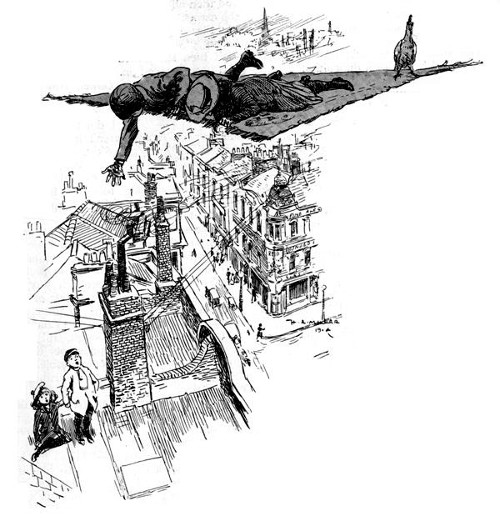 "'ARE YOU HURT?' CRIED CYRIL."
"'ARE YOU HURT?' CRIED CYRIL."
"Are you hurt?" cried Cyril, and Robert shouted "No," and next moment the carpet had sped away, and Jane and Robert were hidden from the sight of the others by a stack of smoky chimneys.
"Oh, how awful!" said Anthea.
"It might have been worse," said the Phœnix. "What would have been the sentiments of the survivors if that darn had given way when we were crossing the river?"
"Yes, there's that," said Cyril, recovering himself. "They'll be all right. They'll howl till someone gets them down, or drop tiles into the front garden to attract the attention of passers-by. Bobs has got my one and five-pence—lucky you forgot to mend that hole in my pocket, Panther, or he wouldn't have had it. They can tram it home."
But Anthea would not be comforted.
"It's all my fault," she said. "I knew the proper way to darn, and I didn't do it. It's all my fault. Let's go home and patch the carpet with your Etons—something really strong—and send it to fetch them."
"All right," said Cyril; "but your Sunday jacket is stronger than my Etons. We must just chuck mother's present, that's all. I wish——"
"Stop!" cried the Phœnix; "the carpet is dropping to earth."
And indeed it was.
It sank swiftly, yet steadily, and landed on the pavement of the Deptford Road. It tipped a little as it landed, so that Cyril and Anthea naturally walked off it, and in an instant it had rolled itself up and hidden behind a gate-post. It did this so quickly that not a single person in the Deptford Road noticed it. The Phœnix rustled its way into the breast of Cyril's coat, and almost at the same moment a well-known voice remarked:[Pg 467]—
"Well, I never! What on earth are you doing here?"
They were face to face with their pet uncle—their Uncle Reginald.
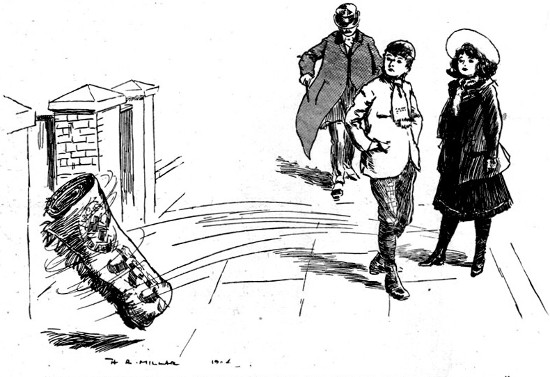 "IN AN INSTANT IT HAD ROLLED ITSELF UP AND HIDDEN BEHIND A
GATE-POST."
"IN AN INSTANT IT HAD ROLLED ITSELF UP AND HIDDEN BEHIND A
GATE-POST."
"We did think of going to Greenwich Palace and talking about Nelson," said Cyril, telling as much of the truth as he thought his uncle could believe.
"And where are the others?" asked Uncle Reginald.
"I don't exactly know," Cyril replied, this time quite truthfully.
"Well," said Uncle Reginald, "I must fly. I've a case in the County Court. That's the worst of being a beastly solicitor. One can't take the chances of life when one gets them. If only I could come with you to the Painted Hall and give you lunch at the Ship afterwards! But, alas! it may not be."
The uncle felt in his pocket.
"I mustn't enjoy myself," he said, "but that's no reason why you shouldn't. Here, divide this by four, and the product ought to give you some desired result. Take care of yourselves. Adieu."
And waving a cheery farewell with his neat umbrella the good and high-hatted uncle passed away, leaving Cyril and Anthea to exchange eloquent glances over the shining golden sovereign that lay in Cyril's hand.
"Well!" said Anthea.
"Well!" said Cyril.
"Well!" said the Phœnix.
"Good old carpet," said Cyril, joyously.
"It was clever of it—so adequate and yet so simple," said the Phœnix, with calm approval.
"Oh, come on home and let's mend the carpet. I am a beast. I'd forgotten the others, just for a minute," said the conscience-stricken Anthea.
They unrolled the carpet quickly and slily—they did not want to attract public attention—and the moment their feet were on the carpet Anthea wished to be at home, and instantly they were.
The kindness of their excellent uncle had made it unnecessary for them to go to such extremes as Cyril's Etons or Anthea's Sunday jacket for the patching of the carpet.
Anthea set to work at once to draw the edges of the broken darn together, and Cyril hastily went out and bought a large piece of the marble-patterned American oil-cloth which careful housewives use to cover dressers and kitchen tables. It was the strongest thing he could think of.
Then they set to work to line the carpet throughout with the oil-cloth. The nursery felt very odd and empty without the others, and Cyril did not feel so sure as he had done about their being able to "tram it" home. So he tried to help Anthea, which was very good for him, but not much use to her.
The Phœnix watched them for a time, but it was plainly growing more and more restless. It fluffed up its splendid feathers, and stood first on one gilded claw and then on the other, and at last it said:[Pg 468]—
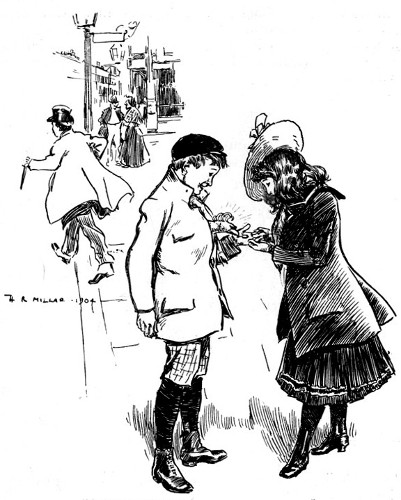 "'GOOD OLD CARPET,' SAID CYRIL, JOYOUSLY."
"'GOOD OLD CARPET,' SAID CYRIL, JOYOUSLY."
"I can bear it no longer. This suspense! My Robert—who set my egg to hatch—in the bosom of whose Norfolk raiment I have nestled so often and so pleasantly! I think, if you'll excuse me——"
"Yes—do," cried Anthea. "I wish we'd thought of asking you before."
Cyril opened the window. The Phoenix flapped its sun-bright wings and vanished.
"So that's all right," said Cyril, taking up his needle and instantly pricking his hand in a new place.
Of course, I know that what you have really wanted to know about all this time is not what Anthea and Cyril did, but—what happened to Jane and Robert after they fell through the carpet on to the leads of the house which was called number 705, Amersham Road.
But I had to tell you the other first. That is one of the most annoying things about stories. You cannot tell all the different parts of them at the same time.
Robert's first remark when he found himself seated on the damp, cold, sooty leads was:—
"Here's a go!"
Jane's first act was tears.
"Dry up, Pussy; don't be a little duffer," said her brother, kindly. "It will be all right."
And then he looked about, just as Cyril had known he would, for something to throw down, so as to attract the attention of the wayfarers far below in the street. He could not find anything. Curiously enough there were no stones on the leads, not even a loose tile. The roof was of slate, and every single slate knew its place and kept it. But, as so often happens, in looking for one thing he found another. There was a trap-door leading down into the house.
And that trap-door was not fastened.
"Stop snivelling and come here, Jane," he cried, encouragingly. "Lend a hand to heave this up. If we can get into the house we might sneak down without meeting anyone, with luck. Come on."
They heaved up the door till it stood straight up, and, as they bent to look into the hole below, the door fell back with a hollow clang on the leads behind, and with its noise was mingled a blood-curdling scream from underneath.
"Discovered!" hissed Robert. "Oh, my cats alive!"
They were indeed discovered.
They found themselves looking down into an attic, which was also a lumber-room. It had boxes and broken chairs, old fenders and picture-frames, and rag-bags hanging from nails.
In the middle of the floor was a box, open, half full of clothes. Other clothes lay on the floor in neat piles. In the middle of the piles of clothes sat a lady, very flat indeed, with her feet sticking out straight in front of her. And it was she who had screamed, and who, in fact, was still screaming.
"Don't!" cried Jane, "please don't! We won't hurt you."
"Where are the rest of your gang?" asked the lady, stopping short in the middle of a scream.
"The others have gone on, on the Wishing Carpet," said Jane, truthfully.[Pg 469]
"The Wishing Carpet?" said the lady.
"Yes," said Jane, before Robert could say, "You shut up!" "You must have read about it. The Phœnix is with them."
Then the lady got up, and picking her way carefully between the piles of clothes she got to the door and through it. She shut it behind her, and the two children could hear her calling "Septimus! Septimus!" in a loud yet frightened way.
"Now," said Robert, quickly; "I'll drop first."
He hung by his hands and dropped through the trap-door.
"Now you. Hang by your hands. I'll catch you. Oh, there's no time for jaw. Drop, I say."
Jane dropped.
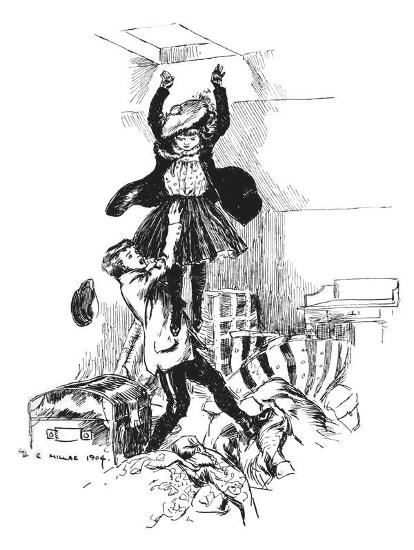 "JANE DROPPED."
"JANE DROPPED."
Robert tried to catch her, and even before they had finished the breathless roll among the piles of clothes, which was what his catching ended in, he whispered:—
"We'll hide—behind those fenders and things; they'll think we've gone along the roofs. Then, when all is calm, we'll creep down the stairs and take our chance."
They hastily hid. A corner of an iron bedstead struck into Robert's side, and Jane had only standing room for one foot—but they bore it—and when the lady came back, not with Septimus, but with another lady, they held their breath and their hearts beat thickly.
"Gone!" said the first lady; "poor little things—quite mad, my dear—and at large! We must lock this room and send for the police."
"Let me look out," said the second lady, who was, if possible, older and thinner and primmer than the first. So the two ladies dragged a box under the trap-door and put another box on the top of it, and then they both climbed up very carefully and put their two trim, tidy heads out of the trap-door to look for the "mad children."
"Now," whispered Robert, getting the bedstead-leg out of his side.
They managed to creep out from their hiding-place and out through the door before the two ladies had done looking out of the trap-door on to the empty leads.
Robert and Jane tiptoed down the stairs—one flight, two flights. Then they looked over the banisters. Horror! a servant was coming up with a loaded scuttle.
The children with one consent crept swiftly through the first open door.
The room was a study, calm and gentle, manly, with rows of books, a writing-table, and a pair of embroidered slippers warming themselves in the fender. The children hid behind the window-curtains. As they passed the table they saw on it a missionary-box with its bottom label torn off, open and empty.
"Oh, how awful!" whispered Jane. "We shall never get away alive."
"Hush!" said Robert, not a moment too soon,[Pg 470] for there were steps on the stairs, and next instant the two ladies came into the room. They did not see the children, but they saw the empty missionary-box.
"I knew it," said one. "Selina, it was a gang. I was certain of it from the first. The children were not mad. They were sent to distract our attention while their confederates robbed the house."
"I am afraid you are right," said Selina; "and where are they now?"
"Downstairs, no doubt, collecting the silver milk-jug and sugar-basin and the punch-ladle that was Uncle Joe's, and Aunt Jerusha's teaspoons. I shall go down."
"Oh, don't be so rash and heroic," said Selina. "Amelia, we must call the police from the window. Lock the door. I will—I will——"
The words ended in a yell as Selina, rushing to the window, came face to face with the hidden children.
"Oh, don't!" said Jane; "how can you be so unkind? We aren't burglars, and we haven't any gang, and we didn't open your missionary-box. We opened our own once, but we didn't have to use the money, so our consciences made us put it back and——Don't! Oh, I wish you wouldn't——"
Miss Selina had seized Jane and Miss Amelia captured Robert. The children found themselves held fast by strong, slim hands, pink at the wrists and white at the knuckles.
"We've got you, at any rate," said Miss Amelia. "Selina, your captive is smaller than mine. You open the window at once and call 'Murder!' as loud as you can."
Selina obeyed; but when she had opened the window, instead of calling "Murder!" she called "Septimus!" because at that very moment she saw her nephew coming in at the gate.
In another minute he had let himself in with his latch-key and had mounted the stairs. As he came into the room Jane and Robert each uttered a shriek of joy so loud and so sudden that the ladies leaped with surprise and nearly let them go.
"It's our own clergyman," cried Jane.
"Don't you remember us?" asked Robert. "You married our burglar for us—don't you remember?"
"I knew it was a gang," said Amelia. "Septimus, these abandoned children are members of a desperate burgling gang who are robbing the house. They have already forced the missionary-box and purloined its contents."
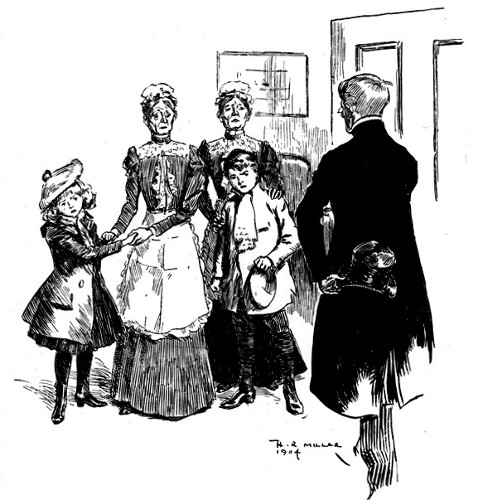 "'DON'T YOU REMEMBER US?' ASKED ROBERT. 'YOU MARRIED OUR
BURGLAR FOR US.'"
"'DON'T YOU REMEMBER US?' ASKED ROBERT. 'YOU MARRIED OUR
BURGLAR FOR US.'"
The Reverend Septimus passed his hand wearily over his brow.[Pg 471]
"I feel a little faint," he said, "running upstairs so quickly."
"We never touched the beastly box," said Robert.
"Then your confederates did," said Miss Selina.
"No, no," said the curate, hastily. "I opened the box myself. This morning I found I had not enough small change for the Mothers' Independent Unity Measles and Croup Insurance payments. I suppose this is not a dream, is it?"
"Dream? No, indeed. Search the house. I insist upon it."
The curate, still pale and trembling, searched the house, which, of course, was blamelessly free of burglars.
When he came back he sank wearily into his chair.
"Aren't you going to let us go?" asked Robert, with furious indignation, for there is something in being held by a strong lady that sets the blood of a boy boiling in his veins with anger and despair. "We've never done anything to you. It's all the carpet. It dropped us on the leads. We couldn't help it. You know how it carried you over to the island, and you had to marry the burglar to the cook."
"Oh, my head!" said the curate.
"Never mind your head just now," said Robert; "try to be honest and honourable, and do your duty in that state of life!"
"This is a judgment on me for something, I suppose," said the Reverend Septimus, wearily, "but I really cannot at the moment remember what."
"Send for the police," said Miss Selina.
"Send for a doctor," said the curate.
"Do you think they are mad then?" said Miss Amelia.
"I think I am," said the curate.
Jane had been crying ever since her capture. Now she said:—
"You aren't now, but perhaps you will be, if——And it would serve you jolly well right, too."
"Aunt Selina," said the curate, "and Aunt Amelia, believe me, this is only an insane dream. You will realize it soon. It has happened to me before. But do not let us be unjust, even in a dream. Do not hold the children; they have done no harm. As I said before, it was I who opened the box."
The strong, bony hands unwillingly loosed their grasp. Robert shook himself and stood in sulky resentment. But Jane ran to the curate and embraced him so suddenly that he had not time to defend himself.
"You're a dear," she said. "It is like a dream just at first, but you get used to it. Now do let us go. There's a good, kind, honourable clergyman."
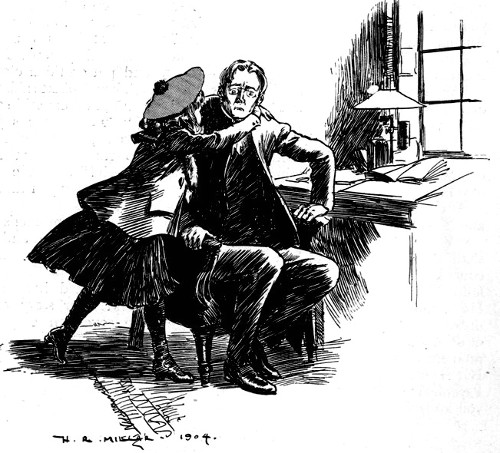 "JANE RAN TO THE CURATE AND EMBRACED HIM."
"JANE RAN TO THE CURATE AND EMBRACED HIM."
"I don't know," said the Reverend Septimus; "it's a difficult problem. It is such a very unusual dream. Perhaps it's only a sort of other life—quite real enough for you to be mad in. And if you're mad there might be a dream-asylum where you'd be kindly treated, and in time restored, cured, to your sorrowing relatives. It is very hard to see your duty plainly, even in ordinary[Pg 472] life, and these dream-circumstances are so complicated——"
"If it's a dream," said Robert, "you will wake up directly, and then you'd be sorry if you'd sent us into a dream-asylum, because you might never get into the same dream again and let us out, and so we might stay there for ever, and then what about our sorrowing relatives who aren't in the dreams at all?"
But all the curate could now say was, "Oh, my head!"
And Jane and Robert felt quite ill with helplessness and hopelessness. A really conscientious curate is a very difficult thing to manage.
And then, just as the hopelessness and the helplessness were getting to be almost more than they could bear, the two children suddenly felt that extraordinary shrinking feeling that you always have when you are just going to vanish. And the next moment they had vanished, and the Reverend Septimus was left alone with his aunts.
"I knew it was a dream," he cried, wildly. "I've had something like it before. Did you dream it too, Aunt Selina, and you, Aunt Amelia? I dreamed that you did, you know."
Aunt Selina looked at him and then at Aunt Amelia. Then she said, boldly:—
"What do you mean? We haven't been dreaming anything. You must have dropped off in your chair."
The curate heaved a sigh of relief.
"Oh, if it's only I," he said; "if we'd all dreamed it I could never have believed it, never!"
Afterwards Aunt Selina said to the other aunt:—
"Yes, I know it was an untruth, and I shall doubtless be punished for it in due course. But I could see the poor, dear fellow's brain giving way before my very eyes. He couldn't have stood the strain of three dreams. It was odd, wasn't it? All three of us dreaming the same thing at the same moment. We must never tell dear Seppy. But I shall send an account of it to the Psychical Society, with stars instead of names, you know."
And she did. And you can read all about it in one of the society's fat Blue-books.
Of course, you understand what had happened?
The intelligent Phœnix had simply gone straight off to the psammead, or sand-fairy, who gives wishes and had wished Robert and Jane at home. And, of course, they were at home at once. Cyril and Anthea had not half finished mending the carpet.
When the joyful emotions of reunion had calmed down a little they all went out and spent what was left of Uncle Reginald's sovereign in presents for mother. They bought her a pink silk handkerchief, a pair of blue and white vases, a bottle of scent, a packet of Christmas candles, and a cake of soap shaped and coloured like a tomato, and one that was so like an orange that almost anyone you had given it to would have tried to peel it—if they liked oranges, of course. Also they bought a cake with icing on, and the rest of the money they spent in flowers to put in the vases.
When they had arranged all the things on a table, with the candles stuck up on a plate ready to light the moment mother's cab was heard, they washed themselves thoroughly and put on tidier clothes.
Then Robert said, "Good old psammead," and the others said so too.
"But, really, it's just as much good old Phœnix," said Robert. "Suppose it hadn't thought of getting the wish!"
"Ah!" said the Phœnix, "it is perhaps fortunate for you that I am such a competent bird."
"There's mother's cab," cried Anthea, and the Phœnix bird and they lighted the candles, and next moment mother's cab was home again.
She liked her presents very much, and found their story of Uncle Reginald and the sovereign easy and even pleasant to believe.
"Good old carpet," were Cyril's last sleepy words.
"What there is of it," said the Phœnix, from the cornice-pole.
[A] Copyright, 1904, by George Newnes, Limited.
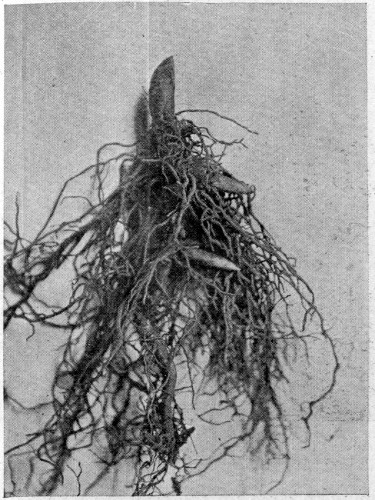 1.—A "CROWN" OF THE LILY OF THE VALLEY, SHOWING THE
UNDERGROUND STEM WITH NEXT YEAR'S BUDS.
1.—A "CROWN" OF THE LILY OF THE VALLEY, SHOWING THE
UNDERGROUND STEM WITH NEXT YEAR'S BUDS.
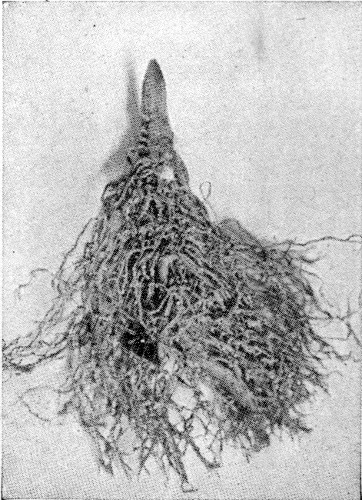 2.—A RETARDED "CROWN" OF THE LILY OF THE VALLEY BEFORE
BEING PLANTED IN THE FORCING-HOUSE.
2.—A RETARDED "CROWN" OF THE LILY OF THE VALLEY BEFORE
BEING PLANTED IN THE FORCING-HOUSE.
To the question, "What are your favourite flowers?" a large majority of people will be found to promptly answer, "Lilies." And every year these beautiful flowers seem to become more and more popular. They have a charm peculiarly their own, unmatched by any other flower; while a halo of romance has encompassed them from the earliest dawn of civilization, inspiring poets, painters, and all lovers of the beautiful in Nature.
North, south, east, and west collectors have travelled, diligently seeking for new species, until a wonderful collection of all sorts, shapes, and sizes of lilies has been brought together, to enrich our gardens and greenhouses with their graceful forms and delicate tints. But in spite of all this continual importation of gorgeous and distinguished foreigners, flaunting it bravely in scarlet and gold, our own native lily of the valley still ranks first favourite in the hearts of the people. Nor is this constancy surprising, for what can be more charming than the exquisite cool green of its foliage or the sweet, fresh fragrance of the clusters of its pure white flowers?
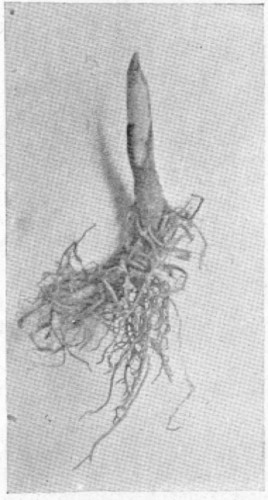 3.—AFTER A WEEK IN THE FORCING-HOUSE THE BUD BEGINS TO
SWELL.
3.—AFTER A WEEK IN THE FORCING-HOUSE THE BUD BEGINS TO
SWELL.
Partly on account of its graceful shape and sweet scent, the pure white of its blossoms and delicate green of its foliage, the lily of the valley has become one of the most important flowers for bouquets and floral decorations, often being used on the most opposite occasions—for the bridal bouquet and the funeral wreath—yet never appearing out of place or incongruous; while at Yule-tide it is nowadays in as great demand as the holly for decorating our homes and churches. Consequently there is now a steadily-growing demand for lilies of the valley throughout the year.
Now, in its natural state, growing at its own sweet will[Pg 474] in our woods, the lily of the valley flowers only in the spring of the year, just as the earliest spring flowers are beginning to fade; while later in the year its leafless flower-stem bears numerous pretty, globular-shaped red berries, the seeds from which future generations of lilies will spring. Besides its seeds, the lily of the valley has another method of perpetuating the species by means of its subterranean creeping root-stock, on which a new bud, or series of buds, appears annually, each bud ultimately developing the orthodox two leaves, from the centre of which rises the flower-stem. As the flowers and foliage of the present year begin to fade, those buds on the underground stem which represent next year's supply of flowers are seen to increase somewhat in size. During the cold winter months they rest and remain practically inactive, awaiting the first warm breath of spring, which is the signal for them to start into active growth.
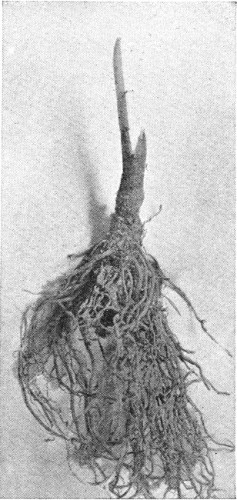 4.—IN TEN DAYS SOME APPRECIABLE GROWTH IS MADE.
4.—IN TEN DAYS SOME APPRECIABLE GROWTH IS MADE.
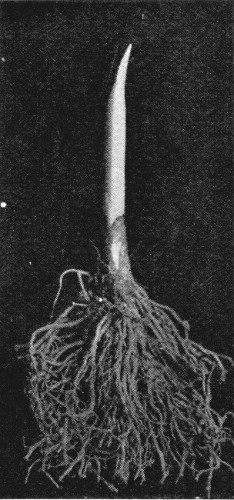 5.—FOURTEEN DAYS' GROWTH. THE TIGHTLY-FOLDED FOLIAGE LEAVES
AND FLOWER STEM HAVE DEVELOPED.
5.—FOURTEEN DAYS' GROWTH. THE TIGHTLY-FOLDED FOLIAGE LEAVES
AND FLOWER STEM HAVE DEVELOPED.
The peculiar underground stem of the lily of the valley is known amongst gardeners as the "crown." For a long time the autumn and winter demand for flowers of the lily of the valley was met by digging up the crowns out of the gardens or woods, placing them in pots filled with rich soil, and forcing their growth in the hothouse. Now, curious to say, although the lily crowns responded to this treatment and sent up their flower-stems, they absolutely declined to develop any foliage, probably because they had been deprived of their winter rest and the opportunity to store up the requisite strength for building up both flowers and foliage; moreover, the blossoms of these forced crowns were often very small in size.
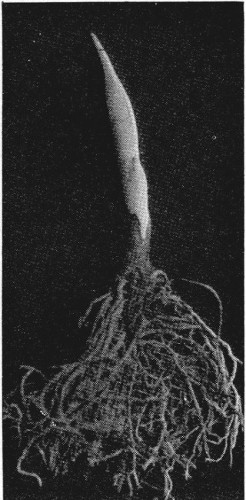 6.—EIGHTEEN DAYS' GROWTH. THE CREAMY-WHITE LEAVES BEGIN TO
SWELL.
6.—EIGHTEEN DAYS' GROWTH. THE CREAMY-WHITE LEAVES BEGIN TO
SWELL.
Many eminent florists, both in England and on the Continent, dissatisfied with such results, set to work to solve the difficulty of growing both foliage and flowers of the lily of the valley all the year round. The task was a troublesome one, though not quite so hopeless as it would appear to the uninitiated, for these flower specialists knew that crowns which were taken out of the ground at the end of the winter and forced would frequently develop both foliage and flowers.
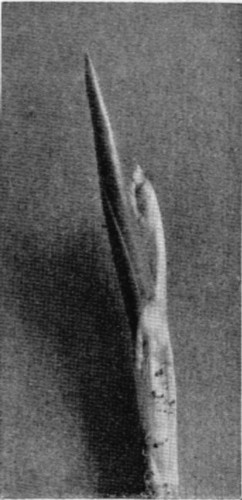 7.—TWENTY-ONE DAYS' GROWTH. THE FOLIAGE GAINING ITS GREEN
TINT AND THE FLOWER-BUDS SHOWING.
7.—TWENTY-ONE DAYS' GROWTH. THE FOLIAGE GAINING ITS GREEN
TINT AND THE FLOWER-BUDS SHOWING.
At last, after numerous experiments had[Pg 475] been tried, a method was evolved whereby it became possible to supply the markets of the world with both large and handsome flowers and foliage of the lily of the valley all the year round, from New Year's Day to New Year's Eve. The crowns are now collected before the new buds have made much growth, and subjected to a process of refrigeration which takes the place of the winter sleep, and by which means they can be stored for a long time without injury. Four or five weeks before the flowers and foliage are required the crowns are planted in the hothouse, and kept at a temperature of about 75 deg. Fahr. during the whole period of their growth.
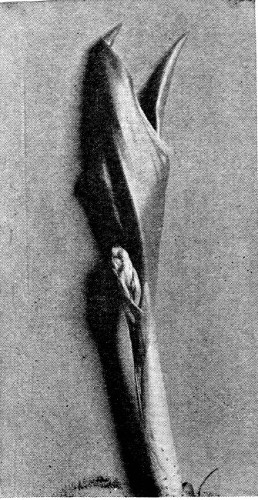 8.—TWENTY-EIGHT DAYS' GROWTH. THE FOLIAGE BEGINNING TO
UNFURL.
8.—TWENTY-EIGHT DAYS' GROWTH. THE FOLIAGE BEGINNING TO
UNFURL.
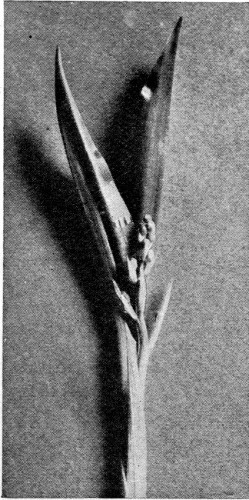 9.—THIRTY-ONE DAYS' GROWTH. THE FLOWER-STEM RAPIDLY
GROWING.
9.—THIRTY-ONE DAYS' GROWTH. THE FLOWER-STEM RAPIDLY
GROWING.
When taken from the refrigerator the lily crown, technically known on the market as a "retarded crown," has a somewhat dry, brownish appearance. A week spent in the rich soil and hot, humid atmosphere of the forcing-house causes the bud to swell and begin to grow. In ten days it is seen to have really made some appreciable growth. At the end of fourteen days the creamy-white, tightly-folded foliage leaves and the tip of the flower-stem are seen to have developed, the leaves broadening out somewhat about the eighteenth day. In twenty-one days the still folded leaves have gained a delicate, pale greenish hue, and the flower-buds have begun to make themselves plainly visible upon the flower-stem. Twenty-eight days finds the leaves a slightly deeper green in tint and beginning to unfurl; while the flower-stem is now more slowly developing, showing a close approximation to the order of growth under natural conditions. In thirty days the flower-stem begins to put on a spurt and catch up with the leaves in growth. Thirty-six days from the planting of the retarded crown the fully-formed flower-buds begin to open, and a day or two later the plant is in full bloom and the foliage and flowers are ready for the market.
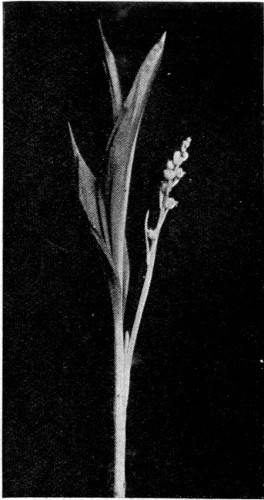 10.—THIRTY-SIX DAYS' GROWTH. THE FOLIAGE FULLY DEVELOPED
AND THE FLOWER-BUDS BEGINNING TO OPEN.
10.—THIRTY-SIX DAYS' GROWTH. THE FOLIAGE FULLY DEVELOPED
AND THE FLOWER-BUDS BEGINNING TO OPEN.
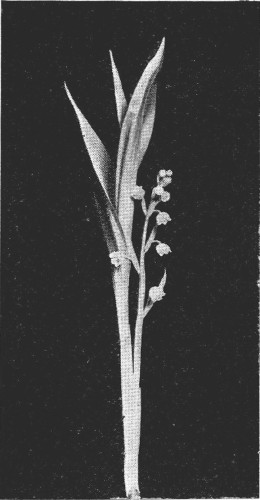 11.—THIRTY-EIGHT DAYS GROWTH. THE FLOWERS AND FOLIAGE READY
FOR MARKET.
11.—THIRTY-EIGHT DAYS GROWTH. THE FLOWERS AND FOLIAGE READY
FOR MARKET.
[We shall be glad to receive Contributions to this section, and to pay for such as are accepted.]
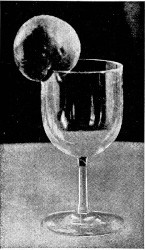
"Whilst lifting a dish of apples from the table one of the apples fell from the dish to the wineglass and remained in the position shown in the photograph. It did not upset the glass, although it was empty. The edge of the glass had cut into the apple, so retaining it in position."—Lieut.-Col. G. T. Trueman, Brooklands, Mansfield Road, Reading.
"The bridge shown in the photograph carries with it a curious legend, which runs somewhat as follows. Once upon a time there was no bridge at all, and a ford was the only means at the disposal of the local inhabitants. One day, owing to a flood, an old woman was unable to cross the river to sell her wares at the village market. She began to cry. The Devil hearing her sobs came to her and said he would build a bridge across the river, on condition that he had the very first living being that crossed the bridge after market time, his Satanic Majesty knowing very well that the old woman was always the first on the journey back. The woman promised, and the Devil soon built the bridge. The woman on returning from market was about to step upon the bridge when she suddenly remembered what the Devil had said. Not knowing what to do, she went to the priest and confessed everything. The worthy priest, giving her a cake, advised her to throw it to the other side of the bridge and let her dog run after it. This she did, and the Devil was so angry at being cheated of his prey that he dropped a corner of his apron and the stones fell to the bottom of the river, where they may be seen to this day."—Mr. J. B. Mather, 21, Liverpool Road, Birkdale, near Southport.


"On Saturday afternoon, October 3rd, 1903, a cyclone passed over the State of Wisconsin from the south-west corner to the north-east corner, doing considerable damage to life and property. At the time I was employed as a local man on the Waupaca Post, and was detailed to write up the results of the storm in that neighbourhood. At a point about seven miles north of Waupaca, near the village of Scandinavia, I found that the wind had demolished a farm-house and that an ordinary cabinet photo. had been blown from a table in the front room and driven about one-half its area into a solid oak tree by the side of the road. The tree was badly broken above, but perfectly solid at the point where the picture was driven in. I took hold of the card and pulled as hard as I dared, but found it to be quite immovable."—Mr. Thos. L. Jacobs, Sumner, Washington.[Pg 477]
"When it is a Japanese fern tree like that shown in my photograph. The Japanese people are fond of shaping fern roots so as to resemble animals, and when the fern grows a little judicious clipping of the fronds adds much to the realistic and often grotesque effect."—Miss Emmons, Mount Vernon, Leamington.

"In the southern part of the United States one of the superstitions of the negroes is that fruit trees should be protected from evil spirits by hanging upon them iron in some form. According to their belief, if the trees do not have some such safeguard the spirits will enter the trunk and branches and prevent the trees from bearing. The accompanying photograph shows a peach tree in Maryland which was protected from the evil spirits in this way. Suspended from the trunk and branches are chains, stove lids, hoops, grates, and iron nails collected by the owner of the tree from piles of old metal for this purpose. It is a peculiar fact, however, that the tree has borne large crops of peaches each year it has thus been protected."—Mr. D. A. Willey, Baltimore.

"I send you a photograph showing a unique umbrella which sheltered two young ladies under it during a violent thunderstorm. While spending my holiday in the Blue Mountains of Sullivan County, New York, I decided to take a trip to Minisink Battlefield, in the town of Highland, where, on July 22nd, 1779, a tribe of Indians, led by the noted half-breed, Joseph Brant, massacred a band of white soldiers, who had made an heroic fight and had gained the upper hand, when they discovered that their ammunition had given out. A rude monument of stone marks the spot, and while I was taking a photograph of it the storm broke. Our party found temporary shelter in an abandoned hut in a quarry at the mountain top, but being miles from our stopping-place, and having failed to provide ourselves with even a single umbrella, one of the party, Mr. Ralph Austin, saw possibilities in the umbrella line when I folded up my rubber-coated focusing cloth. A birch sapling furnished the rod, and branches of maple trees were made to serve as ribs. These were held in place by strips torn from a handkerchief. Then the focusing cloth was stretched across the frame and tied down at the corners with more strips from the handkerchief. The homeward journey was then begun, and for a distance of nearly four miles the young ladies walked under the umbrella, which thoroughly protected them from the rain. They were so pleased with this ingenious umbrella that they insisted upon being photographed under it."—Mr. Adolph A. Langer, 116, Danforth Avenue, Jersey City, N.J.

"This photograph shows the remarkable work of what are known as dam-building beavers. The little animals sometimes construct barriers of brushwood and clay in creeks to form their winter habitations. Occasionally they use pieces of timber of quite large size. The logs which are shown in this picture were actually cut by their sharp teeth, and were found in the swamp occupied by a beaver colony near Stroudsburg, Pa. The work was done so nicely that the wood appears as if hewn with an axe. Pieces of this size were used to strengthen the dam and were gnawed from limbs of trees, some of which were over six inches in diameter. As will be noted, one bears a remarkable resemblance to a horse's hoof."—Mr. D. A. Willey, Baltimore.

"This is a rather uncommon photograph of a man whilst under hypnotic influence, lying on an upturned stool, bearing the weight of three people on his body. His feet are resting on one leg and his neck on the other without any support between. The photograph was taken without the knowledge of the subject."—Mr. E. E. Vinnicombe, Gloucester Row, Weymouth.

"The accompanying photograph of a mural tablet in St. Sampson's Church, Guernsey, the inscription on which is in French, brings the surgical skill of to-day into striking contrast with that of a hundred years ago. For the benefit of those who do not care to try their eyesight in reading the small type, or who do not understand French, I have translated the latter and more interesting part of the inscription into English, as follows: 'This monument is erected to their memory, and also to that of their eldest son, Thomas Falla, Lieutenant of the 12th Regiment of Infantry, who died at the siege of Seringapatam, April 6th, 1799, aged eighteen years, six months, twenty-five days, as the result of a wound of a solid cannon ball weighing twenty-six pounds, which had lodged between the two bones of one of his thighs. The said wound having become considerably inflamed, the surgeon of the regiment, after he had examined the injury, was unaware that the ball was enclosed in it, and it was only after his death, which took place six hours after the event, that it was extracted, to the surprise of the whole Army.' The solid cannon ball referred to, of twenty-six pounds in weight, must have been five and three-quarter inches in diameter; it is astounding to contemplate that the regimental surgeon was unable to detect the presence of this huge mass of iron in the unfortunate officer's thigh."—Mr. Arthur D. Moullin, "Cintra," Swanage, Dorset.

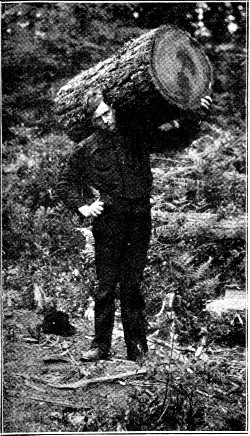
"The picture of the 'Strong Man' was taken as follows: A section of bark was removed from a partly rotten log, a thin slice being then sawn off the log and placed in one end of the bark. This hollow sham was shouldered by the 'Strong Man' whilst a friend snapped the shutter."—Mr. Paul Drake, Green Lake Post Office, Seattle, Washington.
"At the time of the American occupation in Cuba a number of anchors were thrown aside by the Americans in the Havana Navy Yard. Since then the tree shown in the photograph has grown up. It is known in Cuba as the 'Frambollan,' or Royal Ponciana. The tree has caught the anchor and lifted it bodily from the ground, one end of the anchor being twenty-one inches from the ground and the other twenty-five inches, although, if measurements were not taken, it would appear as if both sides were perfectly even. The anchor weighs about four thousand five hundred pounds. The photograph was taken by Mr. Marcos Moré, Peña Pobre 27, Havana, Cuba."—Mr. J. A. del Solar, Room 818, 108, Fulton Street, New York.

"This photograph, which was taken in the harbour at Yokohama, shows one side of a liner with many ladders running up from numerous coal barges which surround the ship. The curious, and at the same time interesting, point of the photograph lies in the fact that the coaling is carried out by gangs of girls. They use little round baskets, which they pass from one hand to another with amazing rapidity. Many of the figures which appear in the photograph to be boys are not really so, for the dress of the girls is in many ways of the masculine type—the large figure in the foreground is a typical specimen of this. By the following figures one can realize the speed with which the coal is put on board. One of the 'Empress' line of steamers has had 1,360 tons loaded in this way in four hours, which is at the rate of 5.7 tons per minute."—Mr. S. Edward Ould, 47, Gloucester Square, Hyde Park, W.

"About the middle of the seventeenth century there stood an inn at the corner of the old Chester road in Lower Bebington (near Birkenhead). The loafers of the neighbourhood used to hang about the corner and loll against the wall of this inn, which very much annoyed the innkeeper. Being an ingenious man, he hit upon the following way of ridding himself of the annoyance. He put a tablet in the wall (right-hand side of photo.), of which none of them could understand the meaning for some time. At last one of the sharpest found that by running the letters together a sentence was formed, reading, 'A Rubbing Stone for Asses.' Of course, this effectually cleared the loafers. The puzzle on the middle stone is solved thus:—
| 987654321 | (=45) | |
| minus | 123456789 | (=45) |
| —————————— | ||
| = | 864197532 | (=45) |
The worthy innkeeper's name (see third stone) was Mark Noble, and his sign was 'The Two Crowns,' the thirty shillings being made up by—
| Mark | = | 13s. | 4d. |
| Noble | = | 6s. | 8d. |
| Two Crowns | = | 10s. | 0d. |
| ———— | |||
| 30s. | 0d. | ||
| ———— | |||
The lettering of the stones has been recut lately to preserve it."—Mr. T. H. Lee, 122, St. Domingo Vale, Liverpool.

"The accompanying is a faithful copy of an address of welcome presented to the passengers of the s.y. Argonaut on the occasion of their visit to Messene. Though a very amusing curiosity as regards the writer's manipulation of the English language, it cannot fail to convey to the 'grand swans of strong Albion' the feeling of respect and admiration in which they are held by the people of Greece."—Mr. Arthur Williamson, 17, Union Square, S.E.

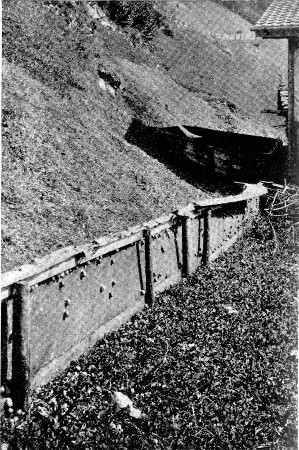
"This is a photograph of a snail farm which I took last summer at Engelberg, near Lucerne. The owner of the farm is a peasant and he has over three thousand Roman snails, some of them of immense size. He sends them to Italy and Paris. They are worth about three a penny, and when dressed and cooked ready for eating they sell for nearly two shillings a dozen."—Miss I. M. Fairbairn, Wood Rising, Rye, Sussex.
End of the Project Gutenberg EBook of The Strand Magazine, Volume XXVII,
Issue 160, April, 1904, by Various
*** END OF THIS PROJECT GUTENBERG EBOOK STRAND MAGAZINE, APRIL, 1904 ***
***** This file should be named 37484-h.htm or 37484-h.zip *****
This and all associated files of various formats will be found in:
https://www.gutenberg.org/3/7/4/8/37484/
Produced by Dianna Adair, Jonathan Ingram, Josephine
Paolucci and the Online Distributed Proofreading Team at
https://www.pgdp.net.
Updated editions will replace the previous one--the old editions
will be renamed.
Creating the works from public domain print editions means that no
one owns a United States copyright in these works, so the Foundation
(and you!) can copy and distribute it in the United States without
permission and without paying copyright royalties. Special rules,
set forth in the General Terms of Use part of this license, apply to
copying and distributing Project Gutenberg-tm electronic works to
protect the PROJECT GUTENBERG-tm concept and trademark. Project
Gutenberg is a registered trademark, and may not be used if you
charge for the eBooks, unless you receive specific permission. If you
do not charge anything for copies of this eBook, complying with the
rules is very easy. You may use this eBook for nearly any purpose
such as creation of derivative works, reports, performances and
research. They may be modified and printed and given away--you may do
practically ANYTHING with public domain eBooks. Redistribution is
subject to the trademark license, especially commercial
redistribution.
*** START: FULL LICENSE ***
THE FULL PROJECT GUTENBERG LICENSE
PLEASE READ THIS BEFORE YOU DISTRIBUTE OR USE THIS WORK
To protect the Project Gutenberg-tm mission of promoting the free
distribution of electronic works, by using or distributing this work
(or any other work associated in any way with the phrase "Project
Gutenberg"), you agree to comply with all the terms of the Full Project
Gutenberg-tm License (available with this file or online at
https://gutenberg.org/license).
Section 1. General Terms of Use and Redistributing Project Gutenberg-tm
electronic works
1.A. By reading or using any part of this Project Gutenberg-tm
electronic work, you indicate that you have read, understand, agree to
and accept all the terms of this license and intellectual property
(trademark/copyright) agreement. If you do not agree to abide by all
the terms of this agreement, you must cease using and return or destroy
all copies of Project Gutenberg-tm electronic works in your possession.
If you paid a fee for obtaining a copy of or access to a Project
Gutenberg-tm electronic work and you do not agree to be bound by the
terms of this agreement, you may obtain a refund from the person or
entity to whom you paid the fee as set forth in paragraph 1.E.8.
1.B. "Project Gutenberg" is a registered trademark. It may only be
used on or associated in any way with an electronic work by people who
agree to be bound by the terms of this agreement. There are a few
things that you can do with most Project Gutenberg-tm electronic works
even without complying with the full terms of this agreement. See
paragraph 1.C below. There are a lot of things you can do with Project
Gutenberg-tm electronic works if you follow the terms of this agreement
and help preserve free future access to Project Gutenberg-tm electronic
works. See paragraph 1.E below.
1.C. The Project Gutenberg Literary Archive Foundation ("the Foundation"
or PGLAF), owns a compilation copyright in the collection of Project
Gutenberg-tm electronic works. Nearly all the individual works in the
collection are in the public domain in the United States. If an
individual work is in the public domain in the United States and you are
located in the United States, we do not claim a right to prevent you from
copying, distributing, performing, displaying or creating derivative
works based on the work as long as all references to Project Gutenberg
are removed. Of course, we hope that you will support the Project
Gutenberg-tm mission of promoting free access to electronic works by
freely sharing Project Gutenberg-tm works in compliance with the terms of
this agreement for keeping the Project Gutenberg-tm name associated with
the work. You can easily comply with the terms of this agreement by
keeping this work in the same format with its attached full Project
Gutenberg-tm License when you share it without charge with others.
1.D. The copyright laws of the place where you are located also govern
what you can do with this work. Copyright laws in most countries are in
a constant state of change. If you are outside the United States, check
the laws of your country in addition to the terms of this agreement
before downloading, copying, displaying, performing, distributing or
creating derivative works based on this work or any other Project
Gutenberg-tm work. The Foundation makes no representations concerning
the copyright status of any work in any country outside the United
States.
1.E. Unless you have removed all references to Project Gutenberg:
1.E.1. The following sentence, with active links to, or other immediate
access to, the full Project Gutenberg-tm License must appear prominently
whenever any copy of a Project Gutenberg-tm work (any work on which the
phrase "Project Gutenberg" appears, or with which the phrase "Project
Gutenberg" is associated) is accessed, displayed, performed, viewed,
copied or distributed:
This eBook is for the use of anyone anywhere at no cost and with
almost no restrictions whatsoever. You may copy it, give it away or
re-use it under the terms of the Project Gutenberg License included
with this eBook or online at www.gutenberg.org
1.E.2. If an individual Project Gutenberg-tm electronic work is derived
from the public domain (does not contain a notice indicating that it is
posted with permission of the copyright holder), the work can be copied
and distributed to anyone in the United States without paying any fees
or charges. If you are redistributing or providing access to a work
with the phrase "Project Gutenberg" associated with or appearing on the
work, you must comply either with the requirements of paragraphs 1.E.1
through 1.E.7 or obtain permission for the use of the work and the
Project Gutenberg-tm trademark as set forth in paragraphs 1.E.8 or
1.E.9.
1.E.3. If an individual Project Gutenberg-tm electronic work is posted
with the permission of the copyright holder, your use and distribution
must comply with both paragraphs 1.E.1 through 1.E.7 and any additional
terms imposed by the copyright holder. Additional terms will be linked
to the Project Gutenberg-tm License for all works posted with the
permission of the copyright holder found at the beginning of this work.
1.E.4. Do not unlink or detach or remove the full Project Gutenberg-tm
License terms from this work, or any files containing a part of this
work or any other work associated with Project Gutenberg-tm.
1.E.5. Do not copy, display, perform, distribute or redistribute this
electronic work, or any part of this electronic work, without
prominently displaying the sentence set forth in paragraph 1.E.1 with
active links or immediate access to the full terms of the Project
Gutenberg-tm License.
1.E.6. You may convert to and distribute this work in any binary,
compressed, marked up, nonproprietary or proprietary form, including any
word processing or hypertext form. However, if you provide access to or
distribute copies of a Project Gutenberg-tm work in a format other than
"Plain Vanilla ASCII" or other format used in the official version
posted on the official Project Gutenberg-tm web site (www.gutenberg.org),
you must, at no additional cost, fee or expense to the user, provide a
copy, a means of exporting a copy, or a means of obtaining a copy upon
request, of the work in its original "Plain Vanilla ASCII" or other
form. Any alternate format must include the full Project Gutenberg-tm
License as specified in paragraph 1.E.1.
1.E.7. Do not charge a fee for access to, viewing, displaying,
performing, copying or distributing any Project Gutenberg-tm works
unless you comply with paragraph 1.E.8 or 1.E.9.
1.E.8. You may charge a reasonable fee for copies of or providing
access to or distributing Project Gutenberg-tm electronic works provided
that
- You pay a royalty fee of 20% of the gross profits you derive from
the use of Project Gutenberg-tm works calculated using the method
you already use to calculate your applicable taxes. The fee is
owed to the owner of the Project Gutenberg-tm trademark, but he
has agreed to donate royalties under this paragraph to the
Project Gutenberg Literary Archive Foundation. Royalty payments
must be paid within 60 days following each date on which you
prepare (or are legally required to prepare) your periodic tax
returns. Royalty payments should be clearly marked as such and
sent to the Project Gutenberg Literary Archive Foundation at the
address specified in Section 4, "Information about donations to
the Project Gutenberg Literary Archive Foundation."
- You provide a full refund of any money paid by a user who notifies
you in writing (or by e-mail) within 30 days of receipt that s/he
does not agree to the terms of the full Project Gutenberg-tm
License. You must require such a user to return or
destroy all copies of the works possessed in a physical medium
and discontinue all use of and all access to other copies of
Project Gutenberg-tm works.
- You provide, in accordance with paragraph 1.F.3, a full refund of any
money paid for a work or a replacement copy, if a defect in the
electronic work is discovered and reported to you within 90 days
of receipt of the work.
- You comply with all other terms of this agreement for free
distribution of Project Gutenberg-tm works.
1.E.9. If you wish to charge a fee or distribute a Project Gutenberg-tm
electronic work or group of works on different terms than are set
forth in this agreement, you must obtain permission in writing from
both the Project Gutenberg Literary Archive Foundation and Michael
Hart, the owner of the Project Gutenberg-tm trademark. Contact the
Foundation as set forth in Section 3 below.
1.F.
1.F.1. Project Gutenberg volunteers and employees expend considerable
effort to identify, do copyright research on, transcribe and proofread
public domain works in creating the Project Gutenberg-tm
collection. Despite these efforts, Project Gutenberg-tm electronic
works, and the medium on which they may be stored, may contain
"Defects," such as, but not limited to, incomplete, inaccurate or
corrupt data, transcription errors, a copyright or other intellectual
property infringement, a defective or damaged disk or other medium, a
computer virus, or computer codes that damage or cannot be read by
your equipment.
1.F.2. LIMITED WARRANTY, DISCLAIMER OF DAMAGES - Except for the "Right
of Replacement or Refund" described in paragraph 1.F.3, the Project
Gutenberg Literary Archive Foundation, the owner of the Project
Gutenberg-tm trademark, and any other party distributing a Project
Gutenberg-tm electronic work under this agreement, disclaim all
liability to you for damages, costs and expenses, including legal
fees. YOU AGREE THAT YOU HAVE NO REMEDIES FOR NEGLIGENCE, STRICT
LIABILITY, BREACH OF WARRANTY OR BREACH OF CONTRACT EXCEPT THOSE
PROVIDED IN PARAGRAPH 1.F.3. YOU AGREE THAT THE FOUNDATION, THE
TRADEMARK OWNER, AND ANY DISTRIBUTOR UNDER THIS AGREEMENT WILL NOT BE
LIABLE TO YOU FOR ACTUAL, DIRECT, INDIRECT, CONSEQUENTIAL, PUNITIVE OR
INCIDENTAL DAMAGES EVEN IF YOU GIVE NOTICE OF THE POSSIBILITY OF SUCH
DAMAGE.
1.F.3. LIMITED RIGHT OF REPLACEMENT OR REFUND - If you discover a
defect in this electronic work within 90 days of receiving it, you can
receive a refund of the money (if any) you paid for it by sending a
written explanation to the person you received the work from. If you
received the work on a physical medium, you must return the medium with
your written explanation. The person or entity that provided you with
the defective work may elect to provide a replacement copy in lieu of a
refund. If you received the work electronically, the person or entity
providing it to you may choose to give you a second opportunity to
receive the work electronically in lieu of a refund. If the second copy
is also defective, you may demand a refund in writing without further
opportunities to fix the problem.
1.F.4. Except for the limited right of replacement or refund set forth
in paragraph 1.F.3, this work is provided to you 'AS-IS' WITH NO OTHER
WARRANTIES OF ANY KIND, EXPRESS OR IMPLIED, INCLUDING BUT NOT LIMITED TO
WARRANTIES OF MERCHANTIBILITY OR FITNESS FOR ANY PURPOSE.
1.F.5. Some states do not allow disclaimers of certain implied
warranties or the exclusion or limitation of certain types of damages.
If any disclaimer or limitation set forth in this agreement violates the
law of the state applicable to this agreement, the agreement shall be
interpreted to make the maximum disclaimer or limitation permitted by
the applicable state law. The invalidity or unenforceability of any
provision of this agreement shall not void the remaining provisions.
1.F.6. INDEMNITY - You agree to indemnify and hold the Foundation, the
trademark owner, any agent or employee of the Foundation, anyone
providing copies of Project Gutenberg-tm electronic works in accordance
with this agreement, and any volunteers associated with the production,
promotion and distribution of Project Gutenberg-tm electronic works,
harmless from all liability, costs and expenses, including legal fees,
that arise directly or indirectly from any of the following which you do
or cause to occur: (a) distribution of this or any Project Gutenberg-tm
work, (b) alteration, modification, or additions or deletions to any
Project Gutenberg-tm work, and (c) any Defect you cause.
Section 2. Information about the Mission of Project Gutenberg-tm
Project Gutenberg-tm is synonymous with the free distribution of
electronic works in formats readable by the widest variety of computers
including obsolete, old, middle-aged and new computers. It exists
because of the efforts of hundreds of volunteers and donations from
people in all walks of life.
Volunteers and financial support to provide volunteers with the
assistance they need are critical to reaching Project Gutenberg-tm's
goals and ensuring that the Project Gutenberg-tm collection will
remain freely available for generations to come. In 2001, the Project
Gutenberg Literary Archive Foundation was created to provide a secure
and permanent future for Project Gutenberg-tm and future generations.
To learn more about the Project Gutenberg Literary Archive Foundation
and how your efforts and donations can help, see Sections 3 and 4
and the Foundation web page at https://www.pglaf.org.
Section 3. Information about the Project Gutenberg Literary Archive
Foundation
The Project Gutenberg Literary Archive Foundation is a non profit
501(c)(3) educational corporation organized under the laws of the
state of Mississippi and granted tax exempt status by the Internal
Revenue Service. The Foundation's EIN or federal tax identification
number is 64-6221541. Its 501(c)(3) letter is posted at
https://pglaf.org/fundraising. Contributions to the Project Gutenberg
Literary Archive Foundation are tax deductible to the full extent
permitted by U.S. federal laws and your state's laws.
The Foundation's principal office is located at 4557 Melan Dr. S.
Fairbanks, AK, 99712., but its volunteers and employees are scattered
throughout numerous locations. Its business office is located at
809 North 1500 West, Salt Lake City, UT 84116, (801) 596-1887, email
business@pglaf.org. Email contact links and up to date contact
information can be found at the Foundation's web site and official
page at https://pglaf.org
For additional contact information:
Dr. Gregory B. Newby
Chief Executive and Director
gbnewby@pglaf.org
Section 4. Information about Donations to the Project Gutenberg
Literary Archive Foundation
Project Gutenberg-tm depends upon and cannot survive without wide
spread public support and donations to carry out its mission of
increasing the number of public domain and licensed works that can be
freely distributed in machine readable form accessible by the widest
array of equipment including outdated equipment. Many small donations
($1 to $5,000) are particularly important to maintaining tax exempt
status with the IRS.
The Foundation is committed to complying with the laws regulating
charities and charitable donations in all 50 states of the United
States. Compliance requirements are not uniform and it takes a
considerable effort, much paperwork and many fees to meet and keep up
with these requirements. We do not solicit donations in locations
where we have not received written confirmation of compliance. To
SEND DONATIONS or determine the status of compliance for any
particular state visit https://pglaf.org
While we cannot and do not solicit contributions from states where we
have not met the solicitation requirements, we know of no prohibition
against accepting unsolicited donations from donors in such states who
approach us with offers to donate.
International donations are gratefully accepted, but we cannot make
any statements concerning tax treatment of donations received from
outside the United States. U.S. laws alone swamp our small staff.
Please check the Project Gutenberg Web pages for current donation
methods and addresses. Donations are accepted in a number of other
ways including including checks, online payments and credit card
donations. To donate, please visit: https://pglaf.org/donate
Section 5. General Information About Project Gutenberg-tm electronic
works.
Professor Michael S. Hart was the originator of the Project Gutenberg-tm
concept of a library of electronic works that could be freely shared
with anyone. For thirty years, he produced and distributed Project
Gutenberg-tm eBooks with only a loose network of volunteer support.
Project Gutenberg-tm eBooks are often created from several printed
editions, all of which are confirmed as Public Domain in the U.S.
unless a copyright notice is included. Thus, we do not necessarily
keep eBooks in compliance with any particular paper edition.
Most people start at our Web site which has the main PG search facility:
https://www.gutenberg.org
This Web site includes information about Project Gutenberg-tm,
including how to make donations to the Project Gutenberg Literary
Archive Foundation, how to help produce our new eBooks, and how to
subscribe to our email newsletter to hear about new eBooks.